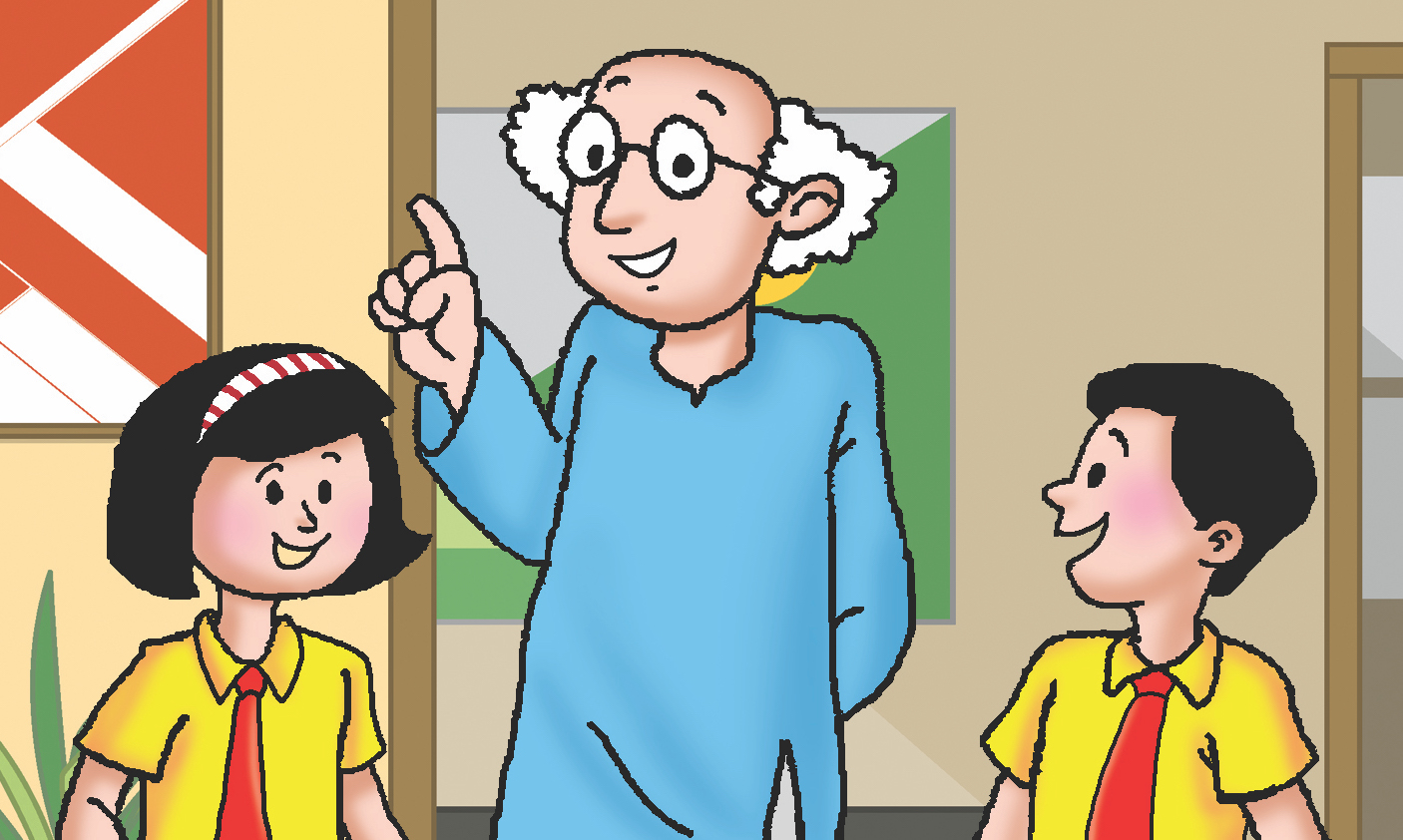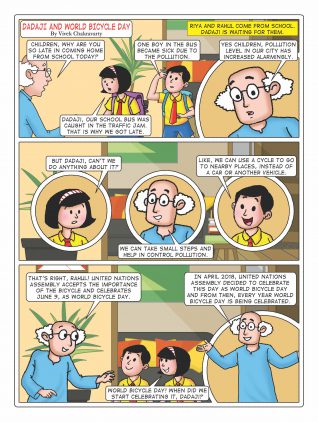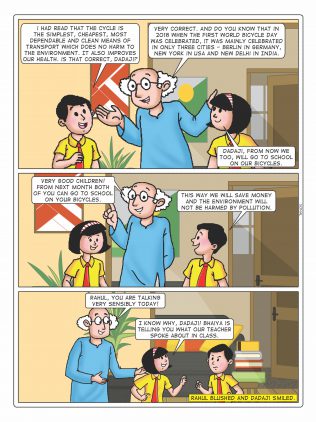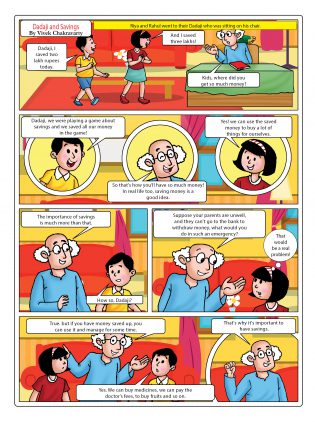
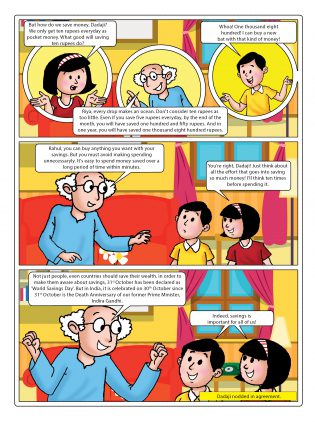
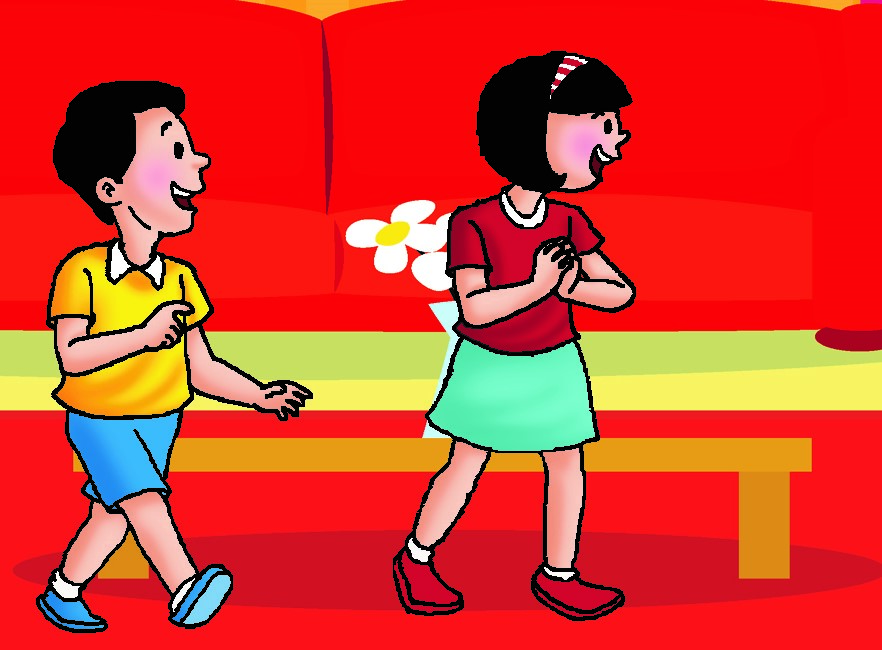



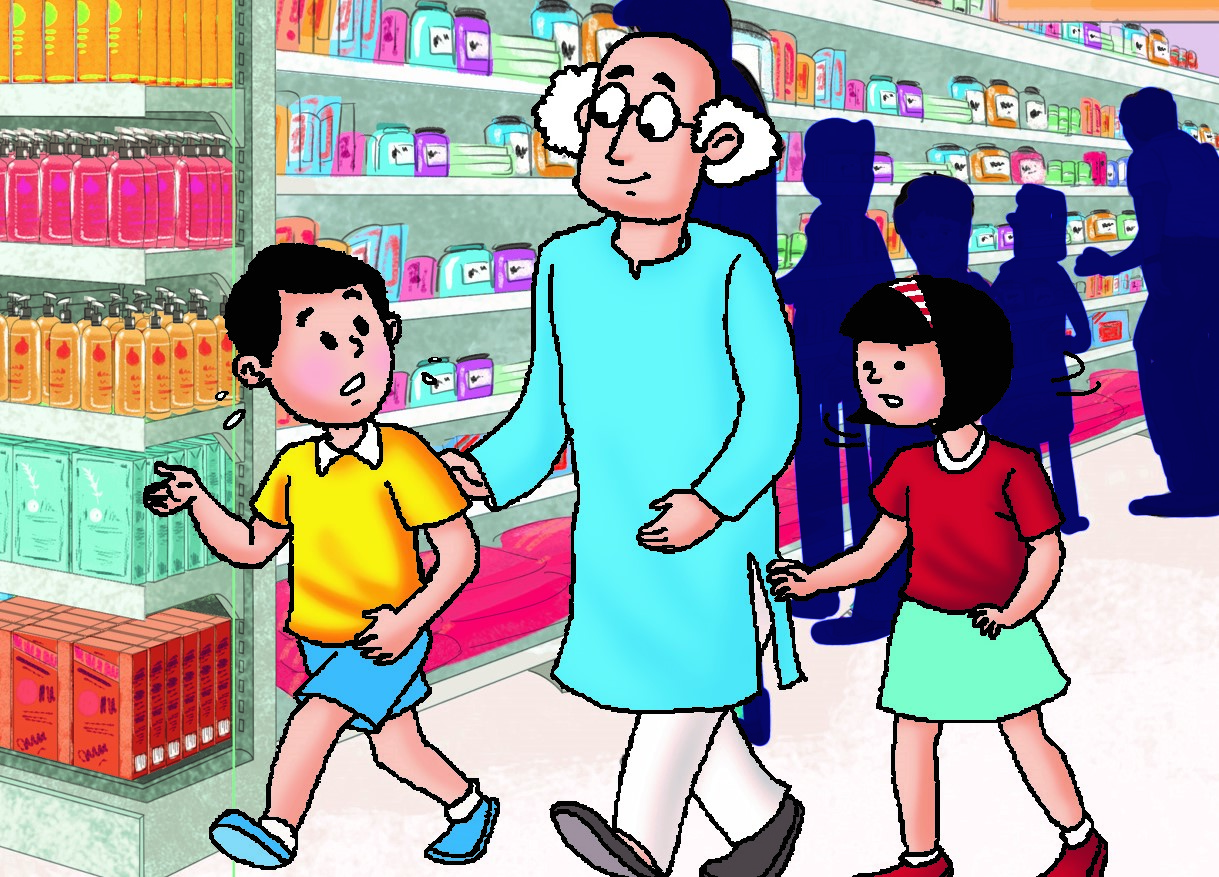
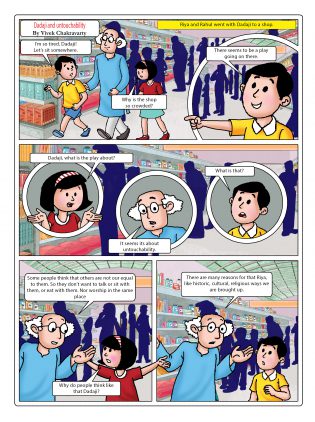
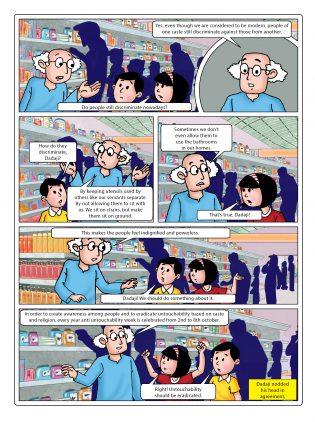
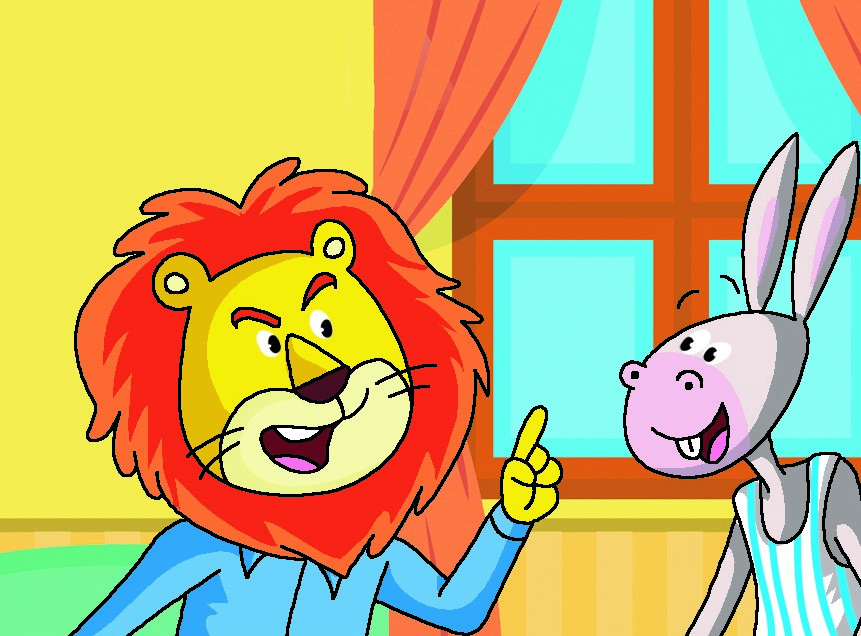
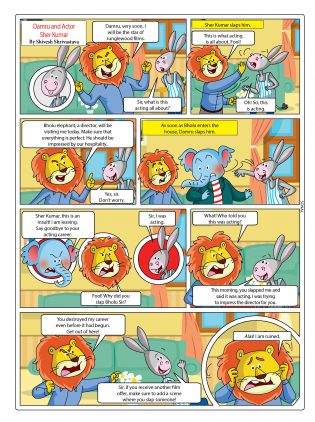
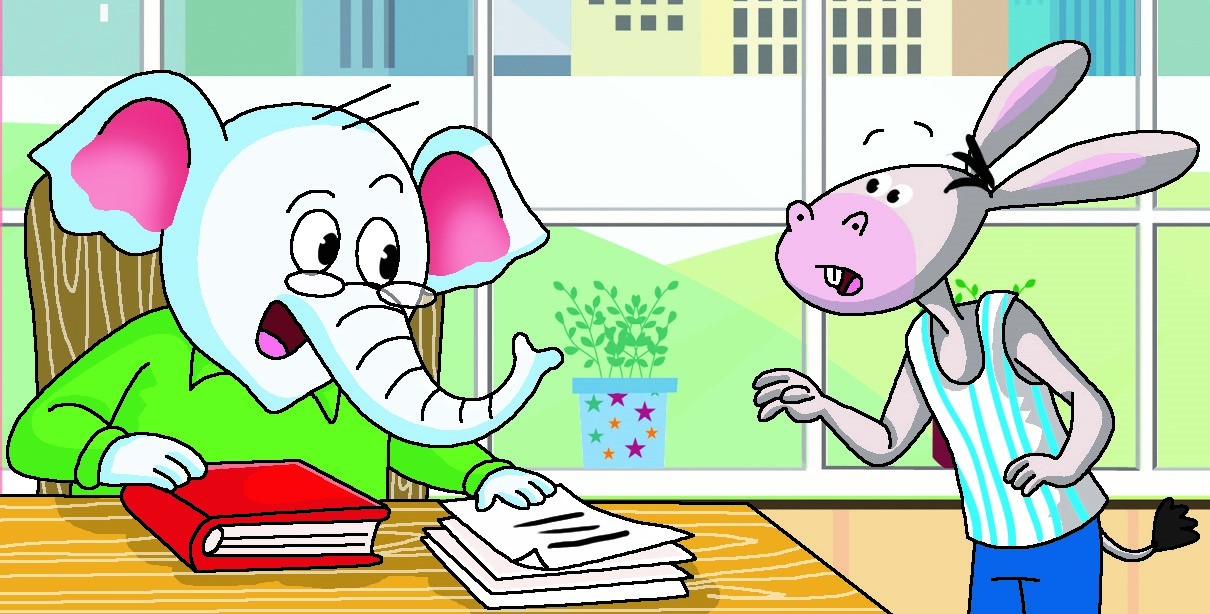
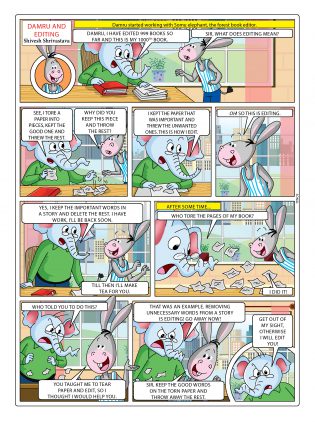
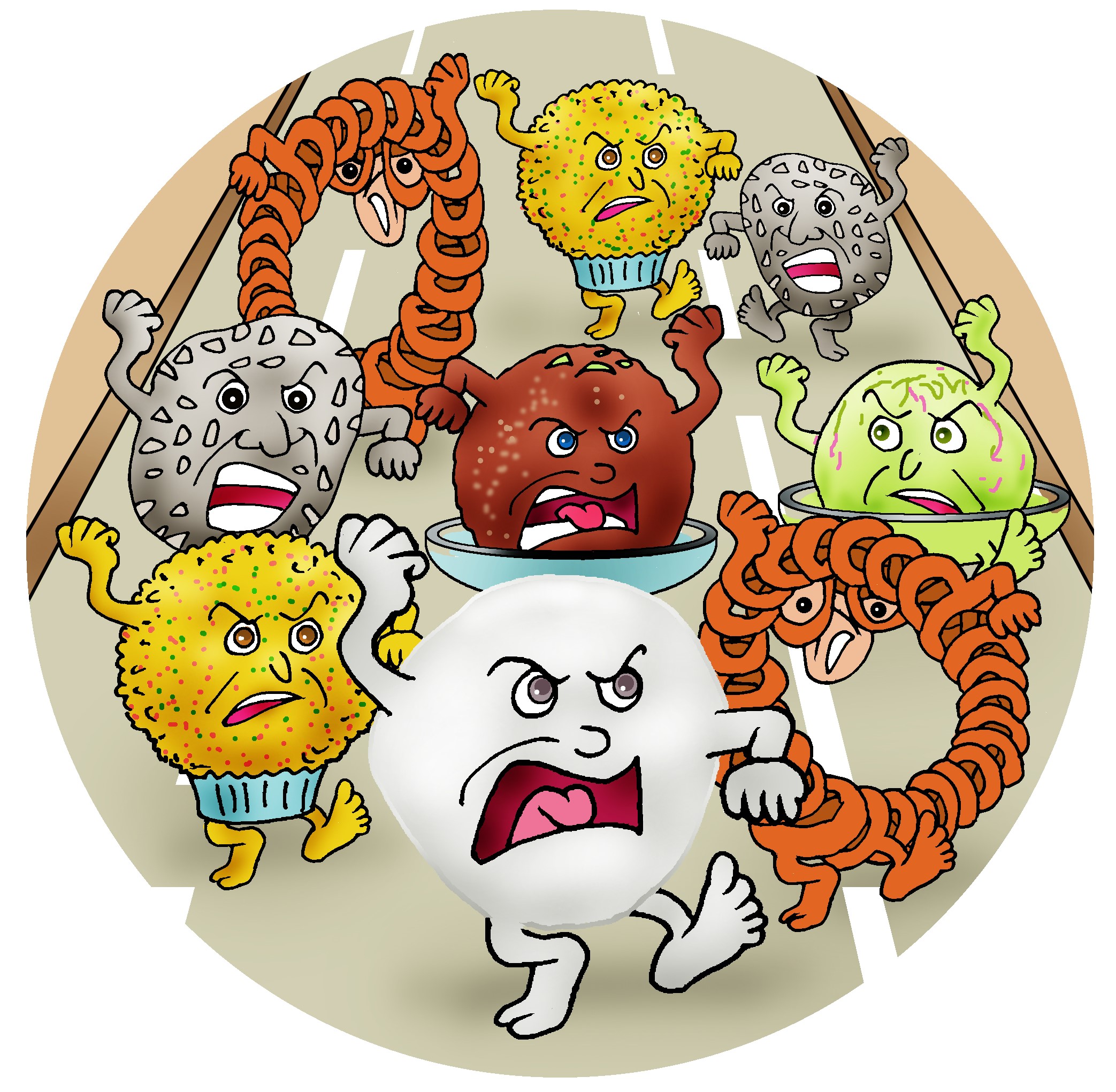
Amar was the owner of the biggest sweet shop in town. Two days before Diwali, he called all his workers and said, “Day after tomorrow is Diwali and many customers have placed huge orders. So, we need to complete these orders and also make sweets for further sale. I’m sure we will be sold out before the festival begins.”
“Sir, we don’t have enough ingredients to deliver the orders,” said Govind, one of the workers.
“Hmm. But it’s too late to get more ingredients. Our suppliers will charge us much more than the usual rate,” said Amar.
He looked at his workers and said, “This should not be your concern. Dilute the milk by adding water to increase its quantity. Use all the old ingredients to make new sweets. Now get to work.”
“But sir, our sweets won’t taste as delicious as before and there’s a chance people will fall ill if, we use bad quality ingredients and dilute the milk,” said another worker.
“You all do as I say and don’t worry about quality. Just think of the profit we will earn and the big bonus I will give after Diwali,” said Amar, not listening to them.
Without saying anything more, the workers returned to the kitchen and began making the sweets. They worked overnight and filled the trays and boxes, completing old orders and making new sweets for sale. Once done, they left to go home.
As soon as they left, the king of sweets, Rasgulla, stood up in the tray. Dripping with water and milk, he stepped out and called for a meeting of all the sweets. Soan Papdi, Rasmalai, Rewari, Chandrakala, Batasha, Motichoor laddoo, Barfi, Gulab Jamun and Imarti hopped out of their trays and gathered around Rasgulla.
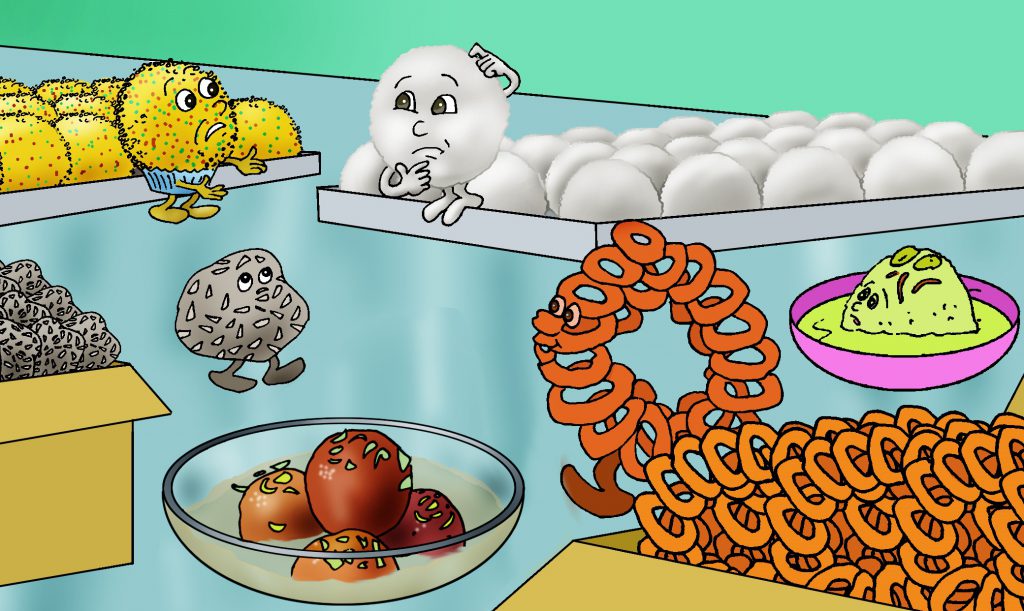
King Rasgulla said, “Tonight is going to be our last night here. Tomorrow we will be in different houses. Let’s celebrate before we are packed and sent off.”
Hearing him, all sweets rejoiced except Imarti.
“I know everyone is in a celebratory mood but our maker hasn’t used the best quality of ingredients to make us. I don’t feel healthy at all. Yet, he wants to sell us to small children who are unaware that we might not be good for them. I don’t look delicious also,” cried Imarti.
“This is true. I would have looked better if the milk and cream used to make me weren’t diluted. There’s another strange sticky ingredient in my body. I think it’s flour,” said Rasmalai, squiggling in the milk.
Rewari looked disturbed and said, “Amar puts too much sugar in me. I think I have got diabetes and will give diabetes to all those who eat me.” All the sweets laughed at Rewari’s statement.
“This is a serious situation. I feel sick, too. I think I’m going to get a heart attack any time and I’ve never felt so weak before,” cried Barfi.
Listening to all the sweets, King Rasgulla said, “This is a matter of great concern. If we are not healthy, then people eating us will get sick. They will not enjoy eating us and will throw us into the drain and in garbage dumps. That will be very insulting.”
“What should we do, King Rasgulla?” asked Motichoor laddoo.
“I think it’s time to revolt against this cheating. We should go to Amar right now and demand that he remakes us using only pure ingredients. Let’s go together and voice against this adulteration,” declared King Rasgulla.
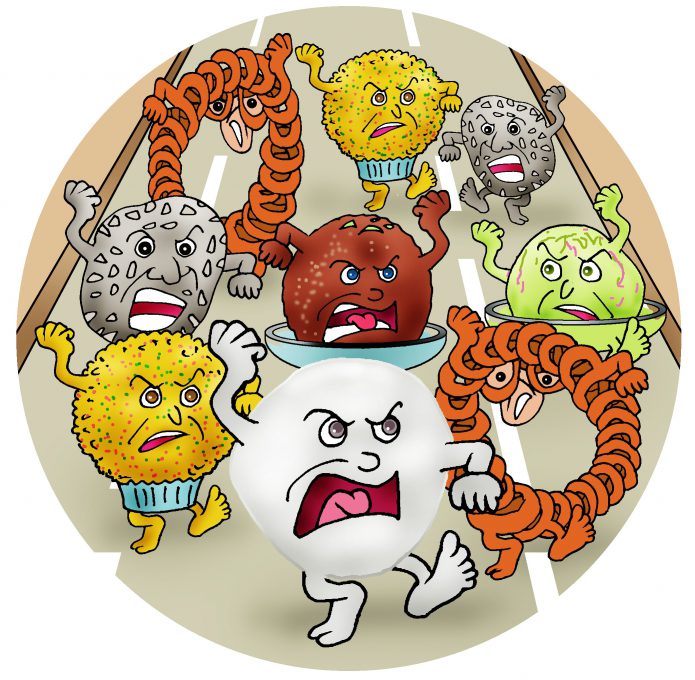
“Yes, let’s revolt!” shouted Jalebi. All the sweets gathered and shouting slogans, walked towards Amar’s house at night.
“Unhealthy sweets, unhealthy people!”
“Don’t spoil our name for profit!”
“Pure is equal to sure!”
“Whoever makes adulterated sweets, will be doomed forever!”
“Long live pure sweets, down with Amar’s greed.”
Hearing these slogans, Amar woke up, sweating all over. “What a terrible nightmare! The sweets looked sick. What if someone comes to know that I used diluted ingredients? What if the sweets really revolt? What will happen to me!” he exclaimed.
The next morning, he gathered his workers and said, “Throw all the old adulterated sweets. We will only use pure ingredients to make our sweets. We have a responsibility towards the health and well-being of our customers.”
The workers were shocked to hear this but were happy at their boss’s decision. “What do you think made him change his mind?” whispered one worker to another.
“The sweets may have threatened him,” replied another worker and that made everyone laugh.
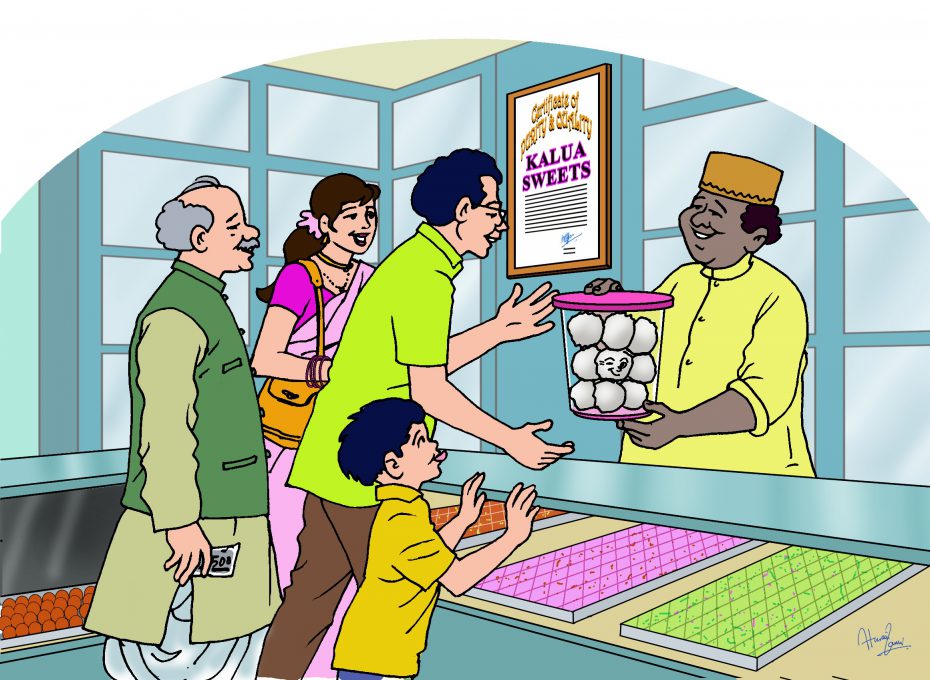
From that day onwards, Amar’s shop was known for making the best and purest sweets in town. And he was happy for making profits without cheating.
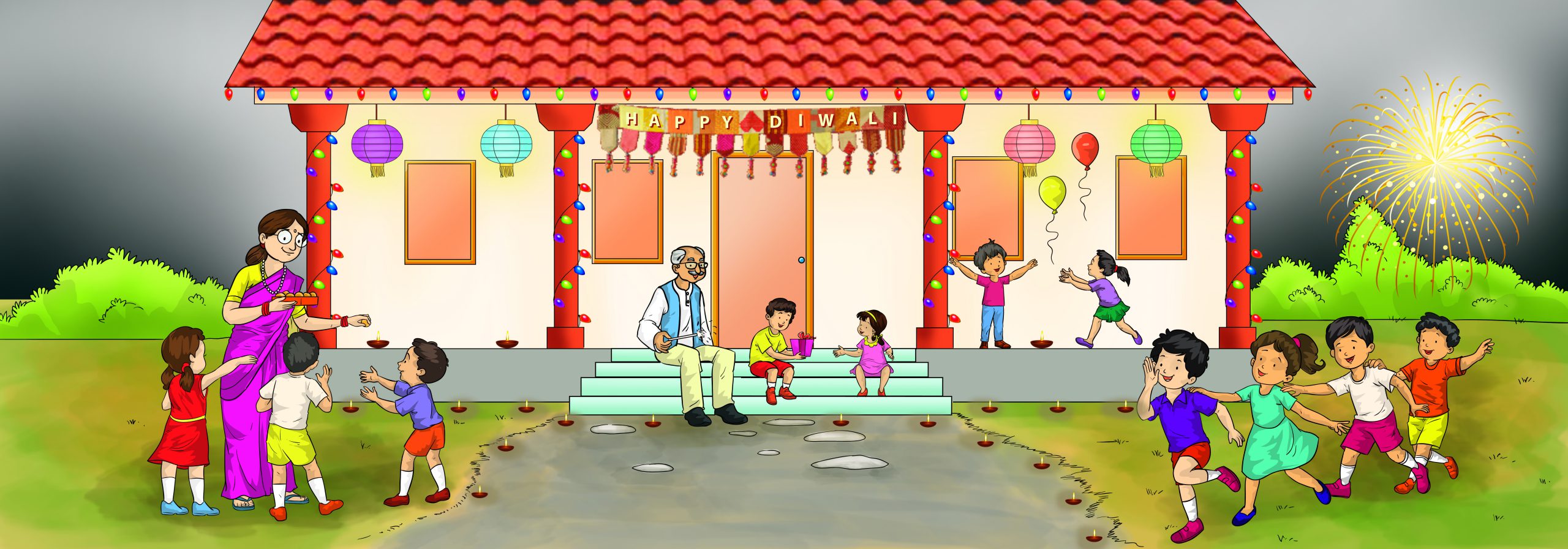
Neel’s exams were over and Diwali vacations had just begun. He and his friends would gather to play in the park everyday. After sunset, they all walked to Neel’s house to watch television together. They played video games for a while and finally bade goodbye to each other. The next day, they did the same and a week later, they were bored of this routine.
“We have so many holidays left! What else can we do?” asked Sahil, impatiently, one day.
“Let’s think of something fun. I’m bored of playing the same games,” agreed Neel.
Neel’s grandparents had just came back for lunch after closing their stationery shop and saw the children sitting quietly in the living room. “What’s the matter, Neel? Why are you and your friends looking so bored?” asked dadi.
“We have so many holidays before school begins. And we’re bored of watching television and playing video games.What else can we do in our free time? Dadi, do you have suggestions to make our holidays more exciting?” asked Neel.
“I may have a suggestion,” said dadaji.
“Please tell us,” said Rohan, his eyes sparkling
“Would you all like to learn to make lanterns? When we were kids, we used to make lanterns to decorate our homes for Diwali. I’ll teach you!” said dadaji.
“That’s a wonderful idea!” said Chinmay, his eyes twinkling like the lights of a lantern.
“And I shall teach you how to make greeting cards for Diwali,” said dadi.
“Dadi, can you also show us how to make diyas?” asked Dipti. “Of course! Let’s go back to our stationery shop and pick all the material we need to make these things,” said dadi.
After that, Neel’s friends would come every afternoon and make lanterns, greeting cards, and colourful diyas.
Neel’s grandparents helped them. Soon, Neel’s house was full of Diwali decorations and cards.
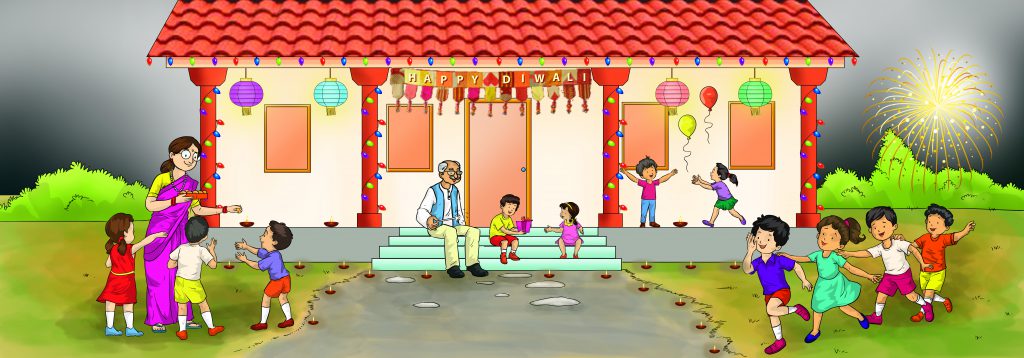
“What do we do with all these now?” asked Neel. “Take a lantern, greeting card and a diya for your homes. We can display the rest of the decorations at our stationery shop for sale. Till then, you all think of what you would like to do with the money we earn from selling them,” said dadi.
Neel’s friends excitedly helped dadi and dadaji display their diya decorations at the stationery shop. ‘Made with Love’ was their motto and in a few days, all items were sold out.
A day before Diwali, all of them went to Neel’s grandparents and said, “Tomorrow is Diwali. We would like to celebrate it with kids from the orphanage near our society. We will use the money to buy sweets, clothes and some crackers for them that we can burst together.”
“That’s a great idea! With this, we all will have a brighter Diwali!” said dadi.
Next day, Neel, his grandparents and all his friends went to the orphanage and spent a great and memorable Diwali together!
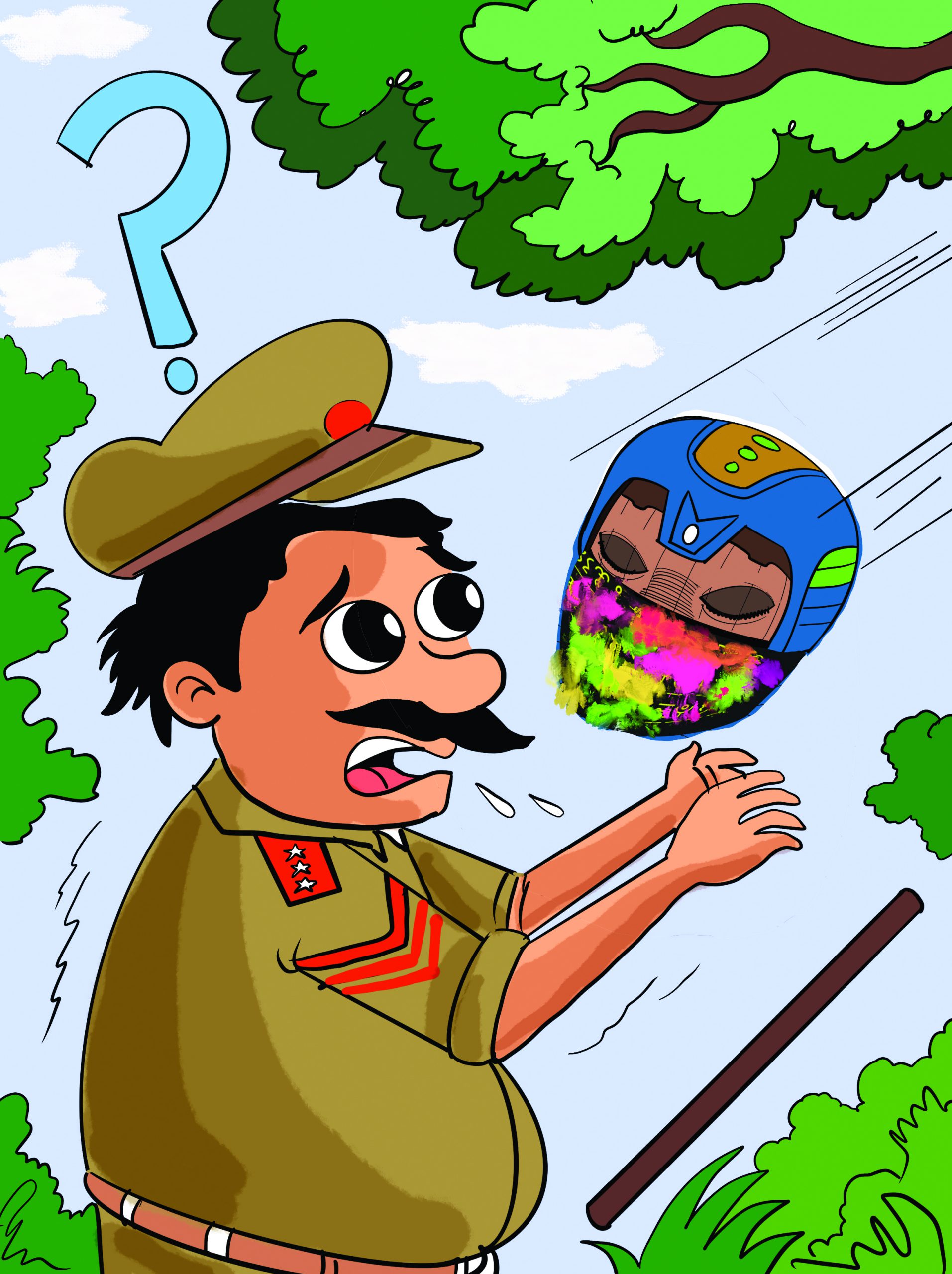
Halloween was round the corner, but instead of carving pumpkins and dressing up in their favourite costumes, and going house to house asking for chocolates, there was complete chaos at Sea View Housing Society where people had gathered in large numbers.
Police was patrolling the area. Inspector Piyush Bhosle, was being questioned by the media as he had discovered an alien today!
Inspector Piyush claimed that he had seen an alien in the jungle next to the Sea View Housing society.
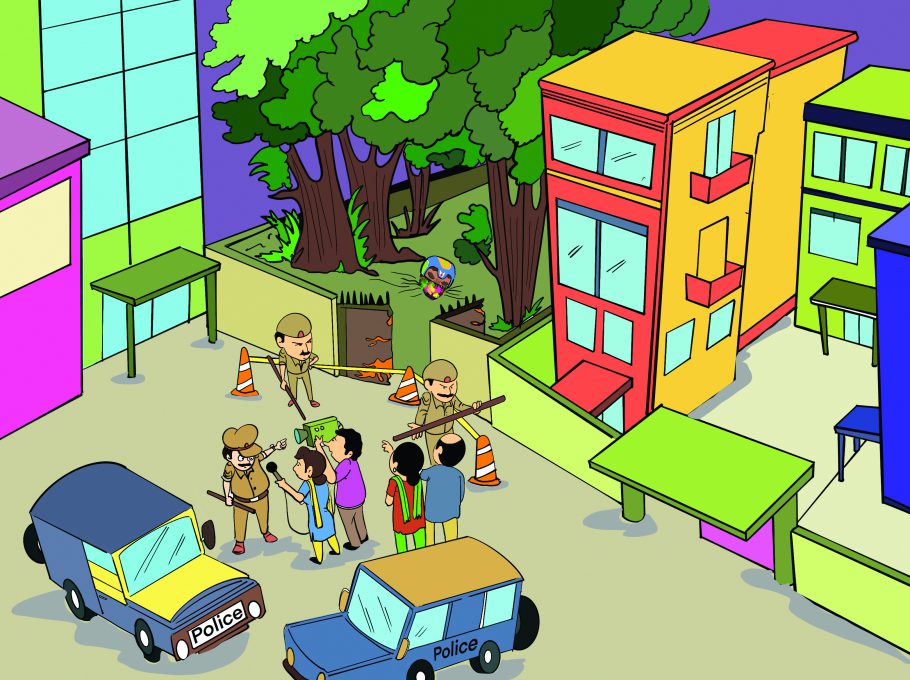
The alien’s body was buried in the ground from the neck below and only his face was visible.
From a distance, Inspector Piyush said, it looked as if a helmet was covering the alien’s head and a mask covering its mouth and nose, which made him look fascinating.
The mask had something painted on it that Inspector Piyush said was not seen before. The police had closed the entire area and nobody was allowed to go close to the alien.
People were trying to get a glimpse of the alien from a distance and whispering among themselves. Inspector Piyush was being interviewd by a journalist from a local newspaper about this strange discovery.
Inspector Piyush answered his questions in a serious tone and explained about his investigation, “After last night’s thunder and lightning, a woman from Shyama Society noticed something unusual in the jungle and called me. I went to the spot she had said and to my surprise discovered an alien wearing a mask just like us.”
“It proves that the planet that the alien has come from has also been infected with the coronavirus or that the residents of that planet are aware of the crises on Earth. It is also possible that they know it can spread to their planet as well and hence they have taken the precaution of wearing a mask. Or
this alien brought the disease to our planet and is now caught.”
Inspector Piyush had informed his headquarters about the alien and a team of scientists were on their way to the town to verify it.
He was pleased about his achievement and had started dreaming of his name being published in the newspaper and getting a reward. After all, it was because of him that an alien had been caught.
To take the entire credit for the discovery he had sent the original witness away and also threatened her to keep her mouth shut.
Soon, the team of scientists arrived. Inspector Piyush took them to the site where the alien was buried. The team wore their protective gears before moving close to the alien. The police guns were all pointed towards the alien in the event of an attack.
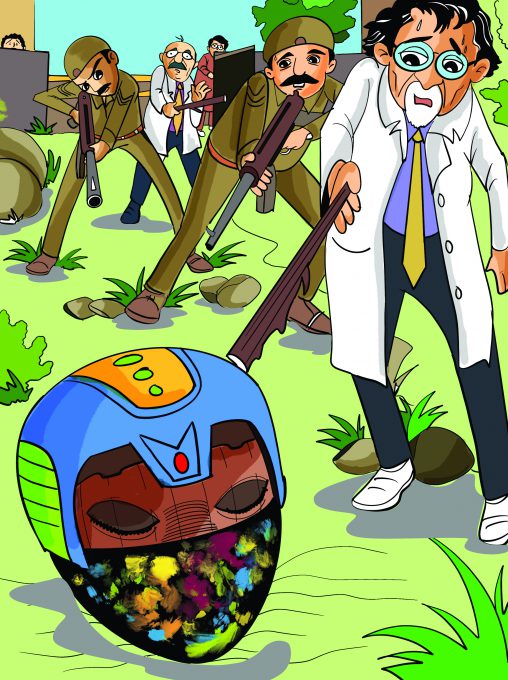
One of the scientists lightly pushed the helmet with the help of a stick. The head of the alien rolled to the ground. The gathered crowd screamed with fear and started to run but the scientist was taken aback.
He took off his protective helmet and looked at Inspector Piyush with rage.
He bent down and picked up the alien head and angrily threw it at Inspector Piyush who screamed with fear and almost lost consciousness when he saw the alien head coming towards him.
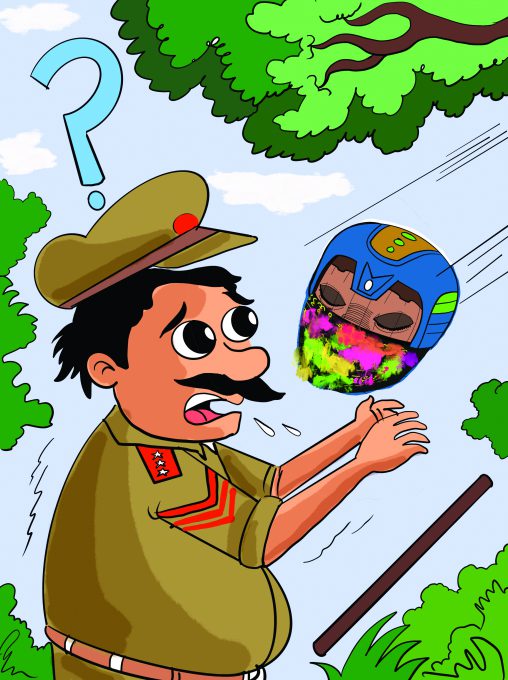
The alien head hit Inspector Piyush on his head and he lost his balance.
His throat dried up as he looked closely at the alien head. He picked it up and was surprised to see it was a wooden head wearing a cloth mask.
First understanding and then being horrified at the blunder he had committed, he looked at the scientists and stuttered, “I am sorry, Sirs and Maams. Mrs Meena from Shyama Society said that she saw something odd and the moment I saw this head, I thought it was an alien. How would I have known what an alien looked like?”
In the mean-time, the news of the alien head had spread like wildfire.
A pair of siblings reached the spot with their dog to claim the wooden head with the mask. Ravi said, “Uncle, head is ours. We were preparing for the upcoming Halloween festival. I was supposed to be China, my sister India and this wooden head was coronavirus.”
“My sister had painted a flag on the mask but our dog Buzo sat on it so it looks eerie. We were playing at home with it and Buzo was not pleased by it. He grabbed the head in his mouth and ran away. Buzo returned after a long time and the head was missing when he came back. I want to thank you for finding our head. Can we please take it with us?”
Grinding his teeth, Inspector Piyush gave them the head.
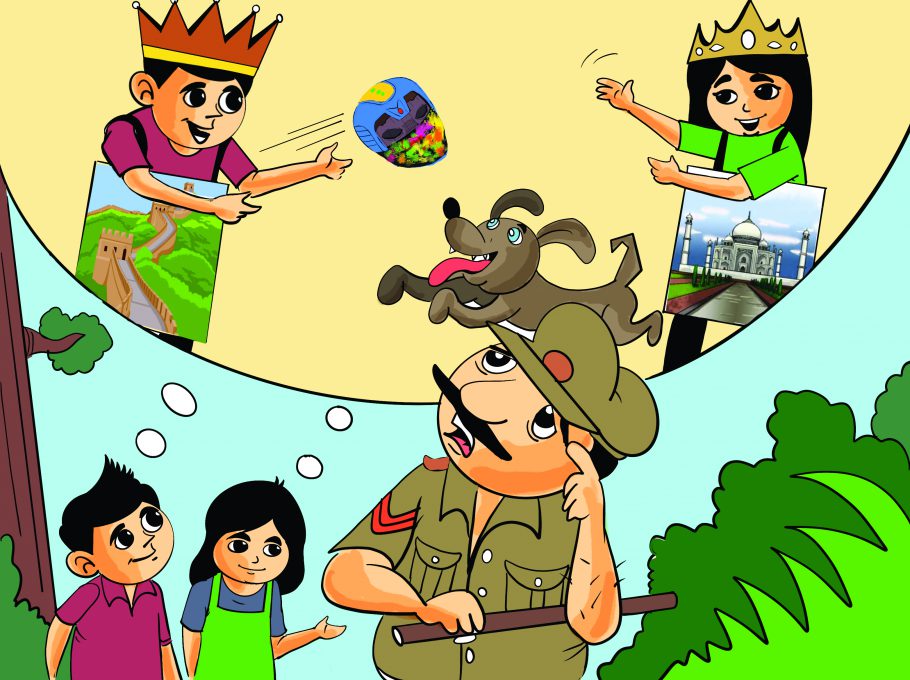
As he saw them leaving with it, he could see his fortune leaving with them. He started preparing himself for the huge scolding that he was about to receive instead of the reward that he had imagined. This was his worst Halloween.
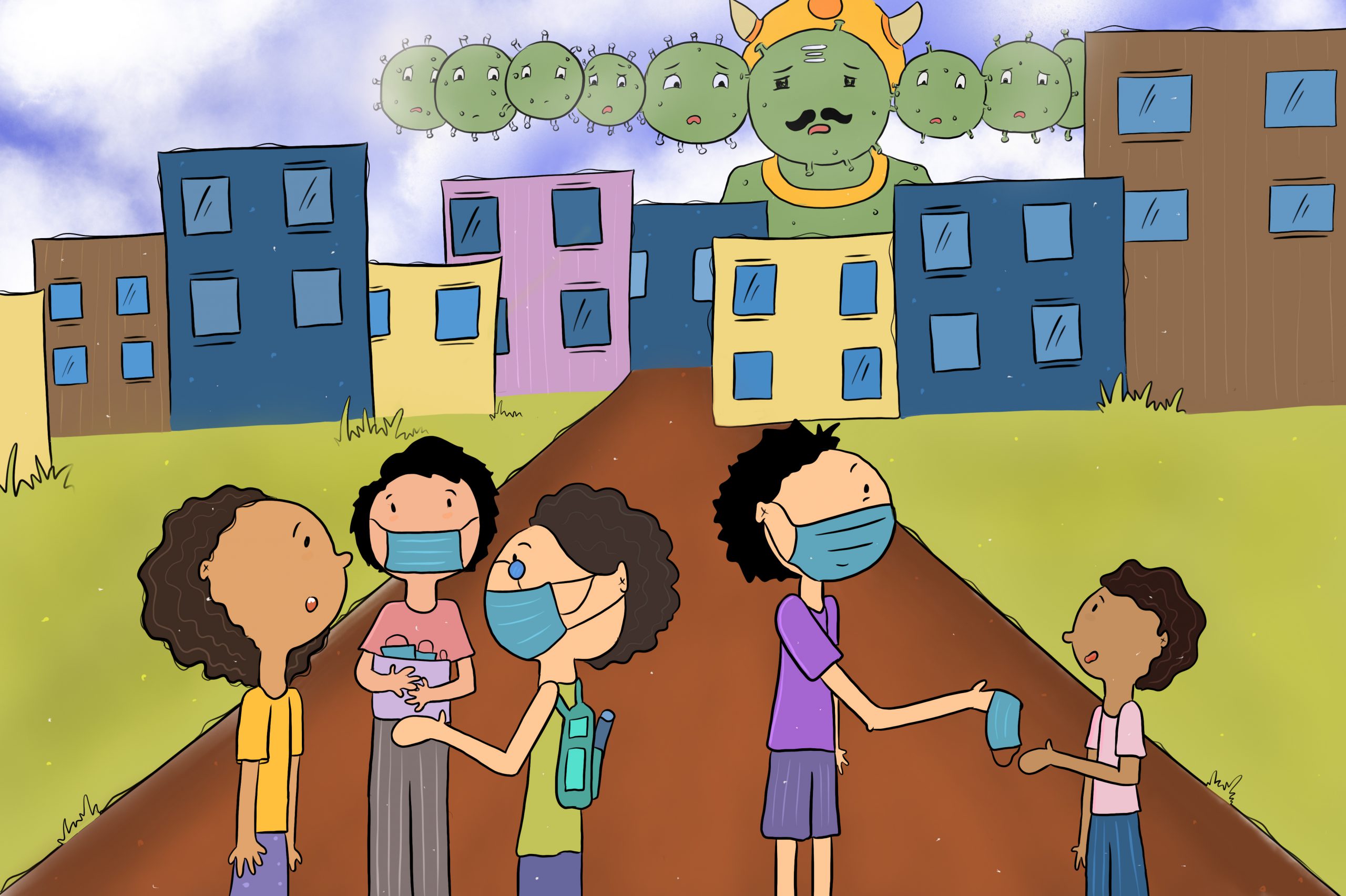
Ojas and his friends were wondering about their Dusshera celebrations this year. In the wake of the coronavirus pandemic, it had become difficult to even move out of their houses.
Physical distancing did not allow huge gatherings and so it was impossible to build the Ravan effigy, which they normally built and burnt every year on Dusshera.
“I cannot think of any way we can build the effigy this year? Do you guys have any suggestions?” Ojas asked his friends over a video call.
“We cannot just sit at home during the festival; we have always celebrated it with great pomp and show,” said Saavan.
“Saavan is right; we have to think of a way to celebrate the festival while following all precautions of wearing a mask and keeping a safe distance from each other,” Chandan added.
“But how will we make the Ravan effigy? It takes at least two to three days to do that. We can’t possibly meet and build it. We have to think of something else,” said Saavan.
“Let us all think about it and discuss in the evening,” Ojas suggested and disconnected the video call.
Ojas was still thinking about it when his grandfather saw him looking worried. He asked, “What is it, Ojas? What is bothering you?”
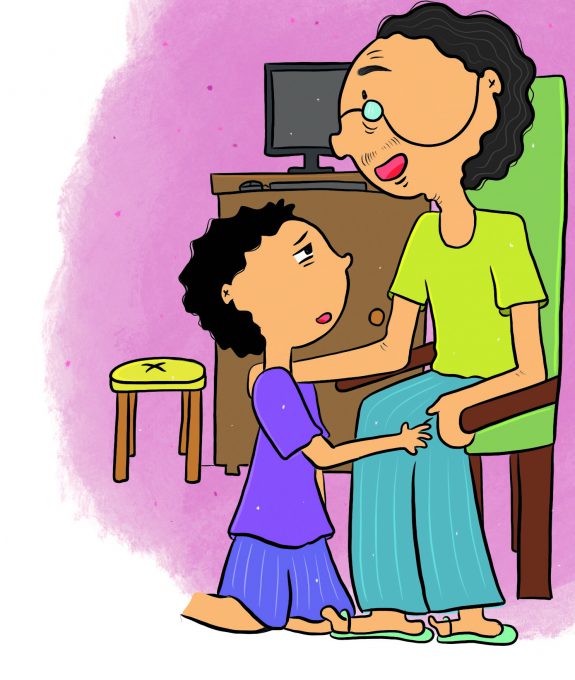
“Nothing Grandpa. I am just lost in my thoughts,” said Ojas.
“Oh Ojas! I know when you are lost in your thoughts and troubled,” Grandpa insisted.
“I was just wondering how we can celebrate Dusshera this year, Grandpa. The Dusshera fair has also been cancelled due to the coronavirus,” Ojas said sadly.
“Let’s think, Ojas. Festivals are meant to be happy events, not sad ones. Dusshera can be a very special and unique experience this year given the circumstances,” Grandpa consoled.
“Special? How so, Grandpa?” asked Ojas.
“By making people understand that the coronavirus is the evil of these times and we have to be ready to fight it and overcome it. We have to also prepare those who are not yet ready,” Grandpa explained.
“We are prepared, Grandpa. My friends and I make sure that we wash our hands regularly; we leave our houses only when it is absolutely necessary and we always wear a mask outside the house. Also, we use the sanitiser at all times,” Ojas said proudly.
“That is wonderful, but I believe a lot of people are still unable to understand the significance of these rules. You can still notice small children, adults and the elderly without face masks. You see educated people eating near food stalls without their masks and not maintaining a social distance.”
“People are still spitting on roads and some believe there is no virus at all. We can educate them and distribute face masks, soaps and sanitisers to these people. And also put up posters about how to prevent the spread of coronavirus,” Grandpa explained.
“That’s an excellent idea, Grandpa!
The money we would have spent on building an effigy of Ravan can be used to buy these products. Let me present this idea to my friends and make this a memorable Dusshera for all of us,” Ojas said excitedly.
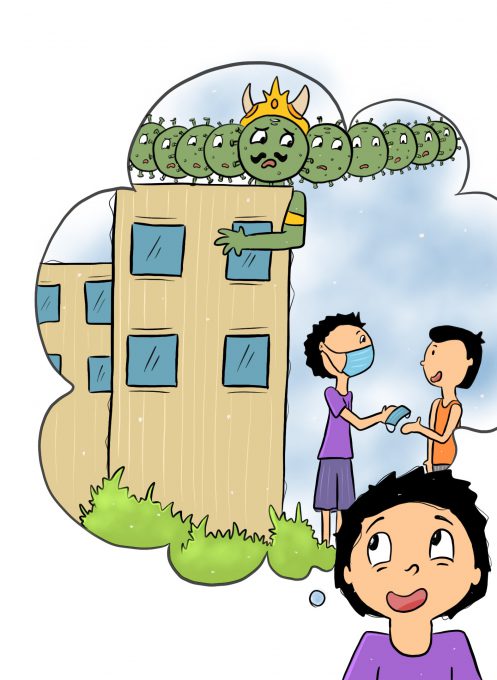
“But, do make sure that you take good care of yourself and your friends. Here, take some money,” said Grandpa.
“Thanks a lot, Grandpa,” Ojas said.
Ojas was extremely happy with the idea and he called his friends and explained Grandpa’s idea to all of them.
“Let us withdraw some money out of our piggy banks and buy these essential products. Later we can go and distribute them to the residents. We can also educate them on how they can prevent getting infected by wearing a face mask and by washing their hands regularly,” Ojas further explained.
All his friends immediately agreed. They decided to meet on the day of Dusshera.
Ojas disconnected the call and counted the money in his piggy bank. His friends did the same.
They all bought face masks, soaps and sanitisers with the money they had collected.
They then put a small table outside their colony and spoke to various people about the benefits of using face masks and maintaining hygiene to prevent the spread of the virus.
They put up posters explaining the concept of maintaining a social distance and not spitting on the streets as well as of not eating in crowded places together.
Spreading happiness on the day of Dusshera was a beautiful experience for Ojas and his friends.
It made them confident that they would now be able to conquer the evil of the coronavirus together.
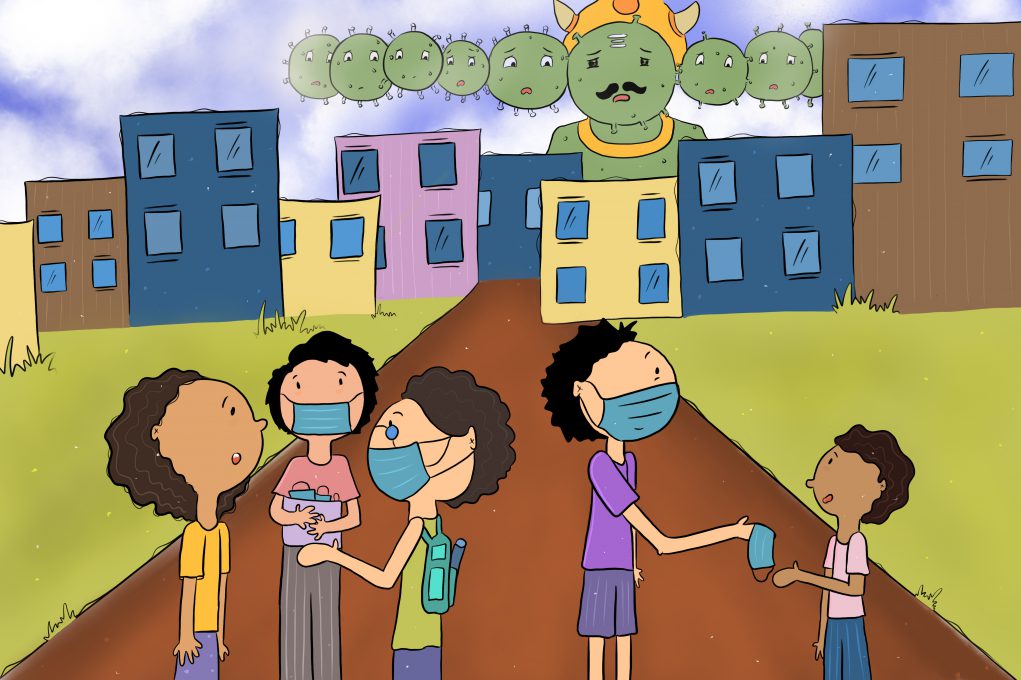
They walked back happily to their respective houses after the distribution.
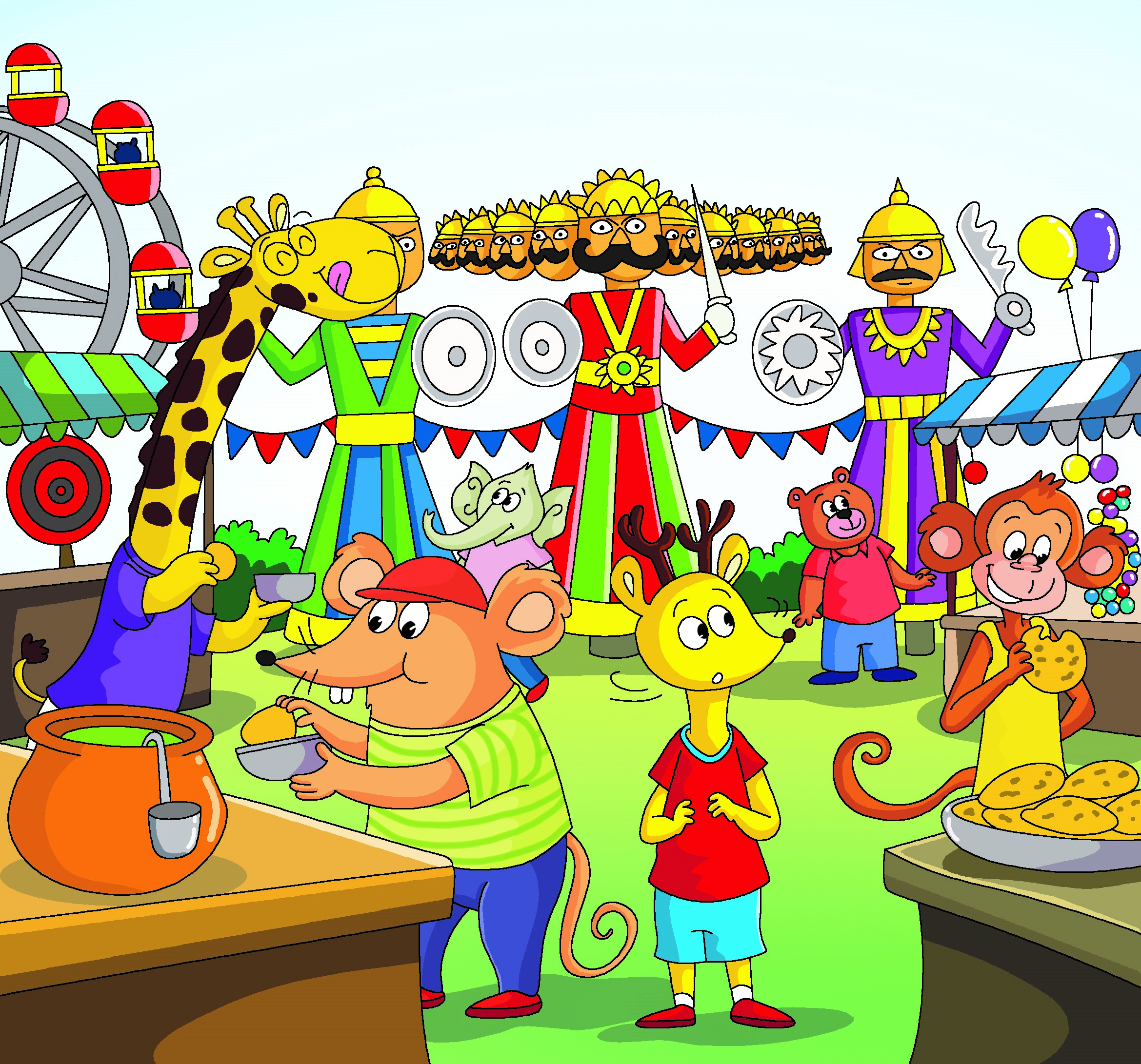
Danny deer, Meeku rabbit, Gogo giraffe and Jumpy monkey were close friends.
This year, for the Dussehra Mela they had each got `50 from their parents and the four friends were excited about going to the fair. Today was the last day of the fair when Ram kills Ravan.
On the Ramlila ground, tall puppets of Ravan, Kumbhakarna and Meghnad were built on one side. On the other side of the ground, the stage was set where the Ramlila play was taking place. As soon as Ram took out an arrow and shot Ravan with it, all the three puppets were on fire.
After seeing them burn, the four friends went to visit the various stalls. The fair looked lively with decorated sweet, toy, and flower and pottery shops. There were many swings for children to ride on and there was a balloon shooting counter. There were huge cut-outs of heroes and heroines, which anyone could take a photograph with. There was a long queue for the same.
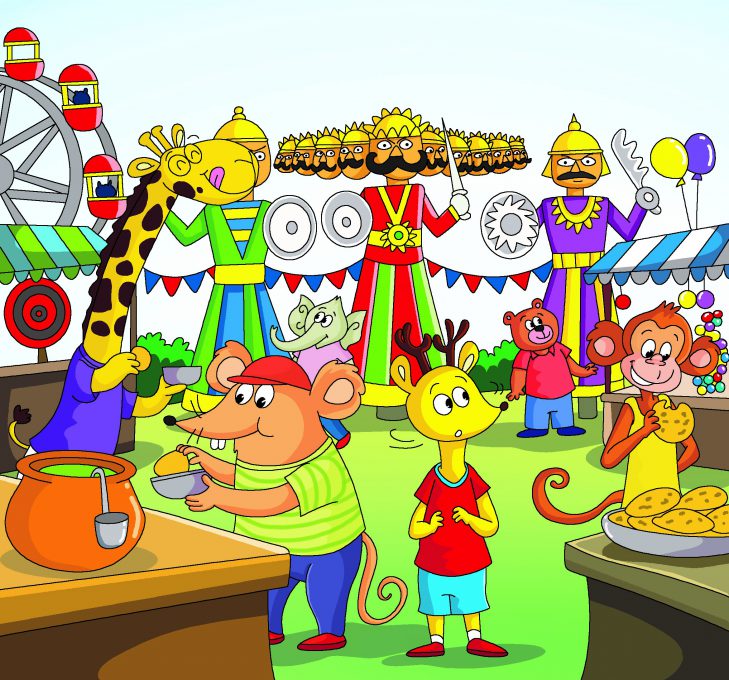
There were chat-pakodi, golgappa, lassi and peppery chowmein stalls, where everyone was eating delicious food.
Some small shopkeepers were selling their goods on the streets by displaying them on bedsheets.
At the fair, Meeku, Gogo and Jumpy were craving to eat the mouth-watering food items.
Meeku enjoyed hot gajar halwa, Gogo had golgappas and Jumpy who was fond of bananas, ate a lot of them.
However, Danny was not interested in food. His eyes were searching for something, but he could not find it.
Meeku, Gogo and Jumpy took a ride on the giant Ferris Wheel. Meeku then bought Ravan’s gleaming sword. Gogo bought Ram’s bow and arrow and Jumpy bought Hanuman’s mace.
“Hey, Danny! Why aren’t you buying anything? Do you intend to save all the money and take it back home?” said Meeku, holding the sword on his shoulder.
Gogo and Jumpy laughed at this. Gogo held the bow on his left hand and arrow in the right hand like Ram. He felt as if he was Ram. Holding the mace on his shoulder, Jumpy felt no less than Hanuman.
Danny could still not find anything for himself. Then he saw Blacky bear, selling clay flowerpots. Blacky was waiting for customers.
As Danny saw the flowerpots, he remembered the day when Environment Day was celebrated at school.
Forest Officer, Jeetu cheetah had visited school as Chief Guest, and had explained, “Dear children, trees give us oxygen to breathe. They provide us with fresh fruits and medicines to stay healthy. Trees are essential to life. But, the biggest enemy of the environment, like the demon king Ravan, is air pollution, which can be defeated only by planting more trees.”
As he remembered the Forest Officer’s words, Danny thought that the true meaning of Dusshera is to fight various evils in the form of Ravan. He thought of fighting the demon ‘air pollution’ by growing plants and trees.
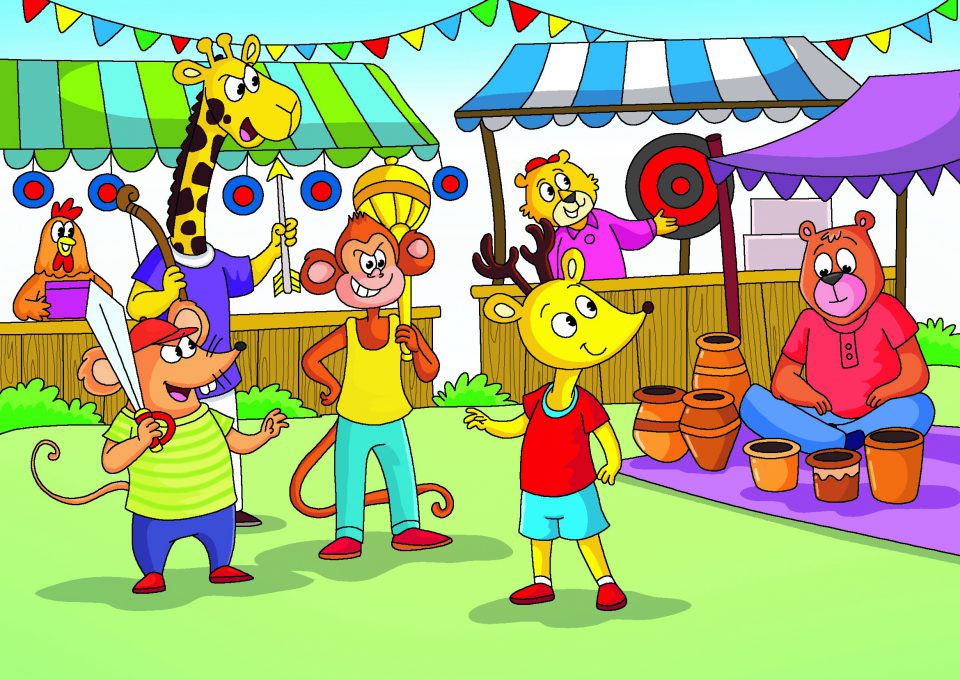
He went to Blacky and asked, “Uncle, how much for a flowerpot?”
“Son, a flowerpot costs `30.”
After bargaining for a while, Danny bought two pots for `50.
The flowerpots were so heavy that Danny could not carry them in his hands. So he held both on his shoulders.
Seeing this, Meeku took out his gleaming sword from its sheath and said, “Danny, are flowerpots to be bought from a fair? Look at my sword. It can cut off the enemy’s neck in a single blow.”
Saying this, Meeku started brandishing his sword in the air. Danny stepped back in fear. But as Meeku twirled the fake sword vigorously, its fragile handle broke away, leaving the blade apart.
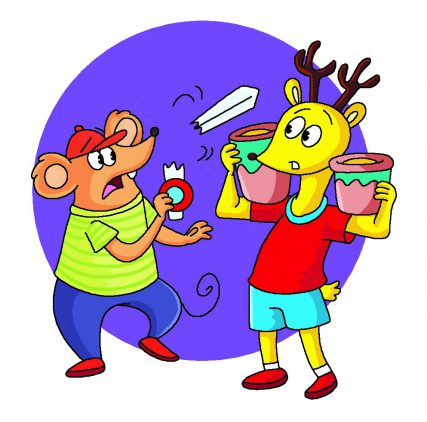
Meeku was disappointed. He had no other option but to put the broken sword back into its sheath.
Seeing this, Gogo said, “Meeku’s sword is fake. Look at my bow and arrow. These are real. One single arrow is enough to destroy the enemy!”
Gogo then pulled the bowstring to shoot the arrow. But as soon as he pulled the bowstring, it broke. Poor Gogo was embarrassed and started tying both ends of the broken string.
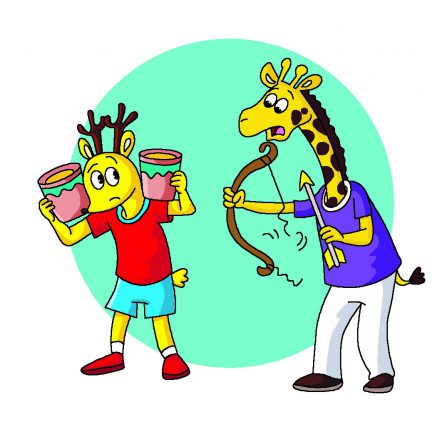
It was now Jumpy’s turn to show off. Twirling his mace, he said, “Danny, look at my mace. If I hit your flowerpots with it, they will break into pieces.”
Danny was scared as he knew Jumpy was very naughty. He held on to the flowerpots even more firmly.
Jumpy hit Danny’s flowerpots hard with his mace, but to everyone’s surprise, Danny’s flowerpots remained intact and the mace quashed!
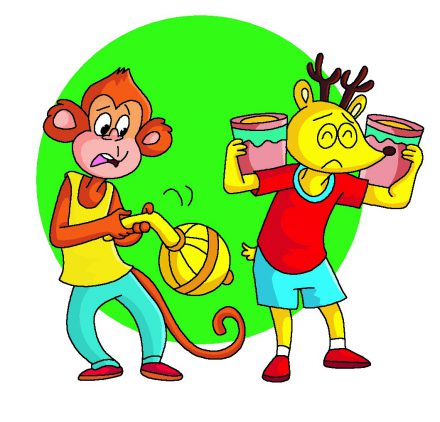
It was disappointing for Jumpy to see his mace in such a state. He started fixing his dented mace. After this incident, Meeku, Gogo and Jumpy walked back home quietly. There was no point in boasting, as each one’s weapon had broken, whereas Danny was walking proudly with his flowerpots.
When Danny reached home, his mother asked, “Why did you bring these flowerpots? You had gone to the fair to eat and have fun.”
“Mummy, you prepare such delicious food that in its comparison, I found all the food dishes and drinks at the fair tasteless. This is why I did not eat anything. Now I am hungry. Is dinner ready?”
Danny’s mother hugged him and laid out the dinner.
The next day, Danny planted saplings in both the flowerpots and took utmost care of them. Within a few weeks, both the plants grew taller. One day Meeku, Gogo and Jumpy visited Danny’s house. He showed them the green plants in the flowerpots and they were amazed to see them. They could not stop themselves from taking selfies with the lush green plants.
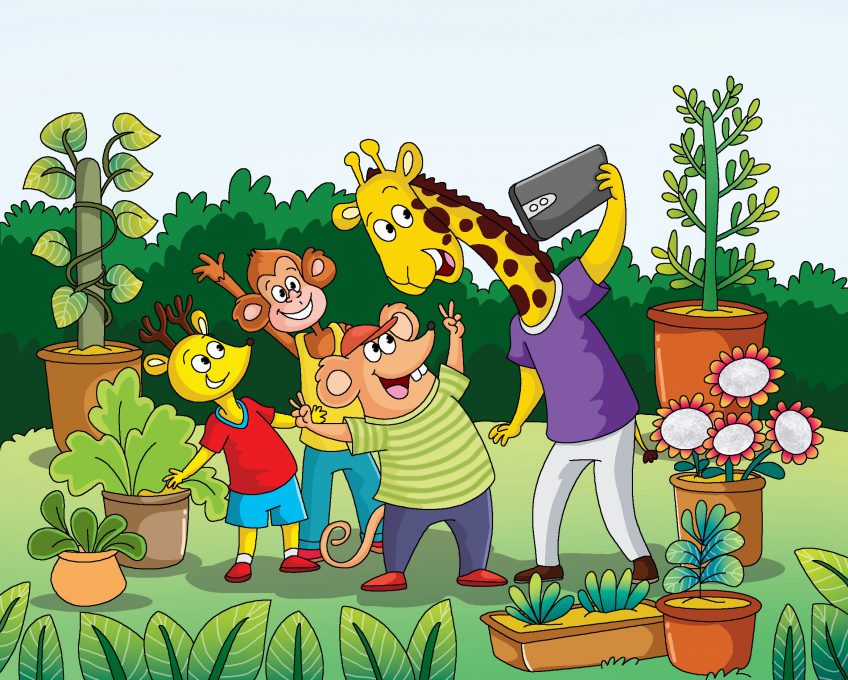
Now Meeku, Gogo and Jumpy decided that they too will save their pocket money like Danny and buy flowerpots and grow plants in their homes. These plants would not only last longer but they will also help in keeping the environment clean and help in fighting the Ravan of ‘air pollution’.
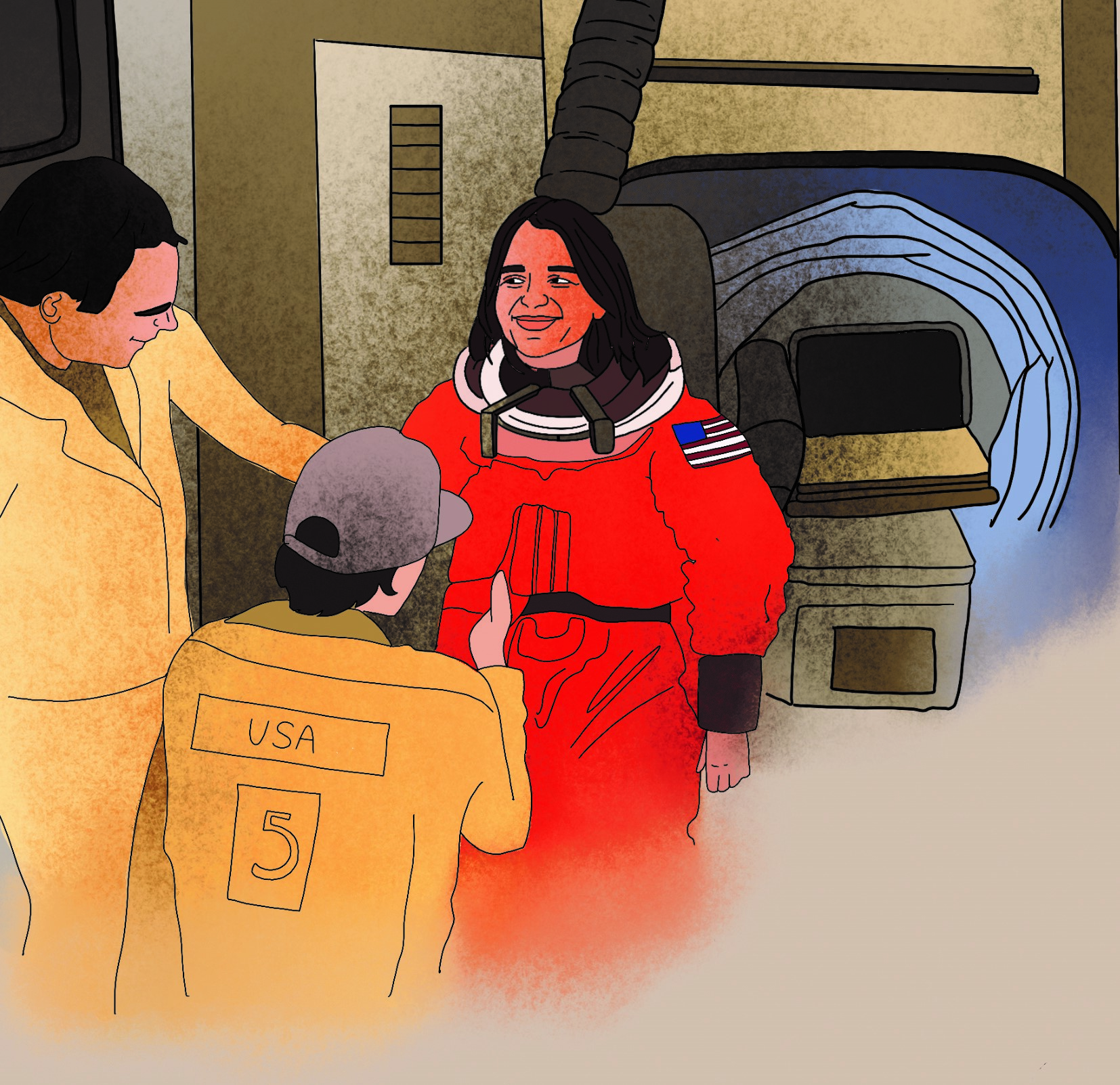
In the city of Karnal, Haryana, a couple held the hand of their little girl and went to the Principal’s Office of Tagore Bal Niketan. They had come for their daughter’s admission.
In the office, the Principal asked, “What’s the name of the child’s father?”
“Madam, my name is Banarasi Lal Chawla.”
Then he pointed to his wife and said, “This is Sanjyoti, her mother.”
The Principal looked at the child and asked her affectionately, “What’s your name, dear?”
“Manto,” she said.
“But that’s your nickname, isn’t it? What name should we use at school?”
The girl’s mother said, “Madam, we’ve thought of three to four names. But we haven’t decided yet which one to keep.”
She told her the names they had thought of.
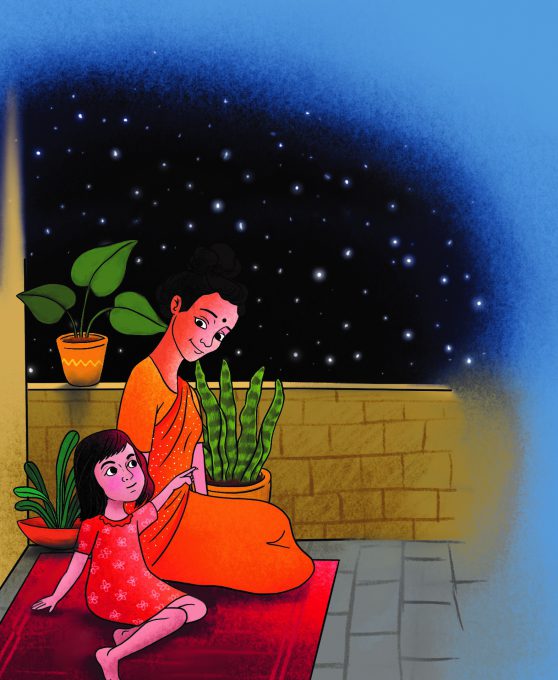
When she heard the names, Manto said at once, “Kalpana. Keep that name. I like it!”
“But why do you like the name Kalpana?” asked the Principal, with a smile.
“Because ‘Kalpana’ means imagination. And I like to imagine and dream,”
said Manto.
The name Kalpana was thus entered in the school register.
“What’s Kalpana’s date of birth?” asked the Principal.
The husband and the wife stared at each other for a while and said slowly, “July 1, 1961.”
However, they knew that her real date of birth was March 17, 1962. But if they told her real date of birth, she would not get admission in the school. She was a year younger than the cut-off date for admission. Kalpana’s parents wanted their daughter to be admitted to this school because it was close to their house.
Manto was the youngest amongst their four children but she was quite smart
and they thought she should attend school immediately.
The admission process went smoothly and soon Kalpana started going to school. She was good at studies and began excelling in class.
One day, Kalpana returned home from school and said, “Mother, today all the children in school drew the map of India on the floor and painted it. It was a project, and everyone took part in it.”
“Then you must have taken part in it too!” said her Mom.
“No, I didn’t like that! I decorated the ceiling of the classroom with black
chart papers, put bright dots on it, and made it look like the night sky with countless stars—the outer space!”
Her mother knew that Kalpana was interested in space. She often saw Kalpana lie down under the open sky and stare at the stars for hours.
Time passed, and Kalpana reached class 10. It was the Mathematics period.
While explaining the null-set concept in algebra, the teacher said, “A null set is
also referred to as the empty set. It is the set that contains no elements. For example, suppose we have to find the set of all senior citizens who are less than five years old. Clearly, there are no senior citizens under five and a person has to be much older than five to be considered a senior citizen. Thus it is a null set or an empty set. Let me give you another example to explain it clearly. Indian women astronauts are a great example of a null set. That’s because not a single Indian woman astronaut has gone into space.”
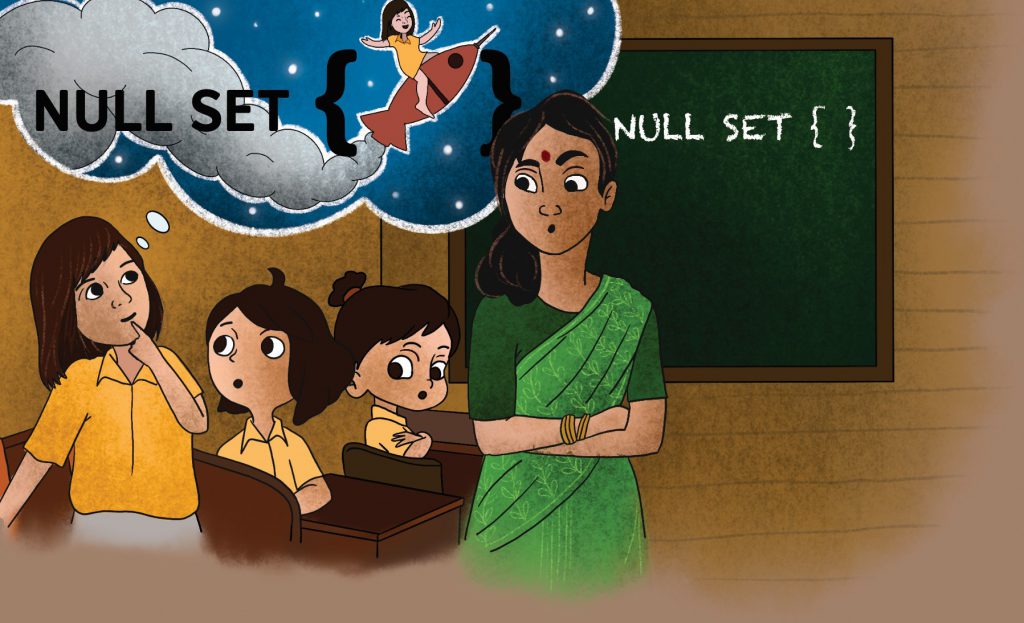
Kalpana, who was sitting in the classroom, slowly said, “Maybe in a few years someone will, and then it will no longer be an example of a null set.”
The other students looked at her in surprise. But what she said was perhaps going to become true.
Soon, it was time for her to take admission in a college. Everyone was wondering what subject they should take up.
“I will pursue engineering,” announced Kalpana at home.
“No, no. You should become a doctor or a teacher. That’s more suitable for girls,” said her father.
Her mother was also of the same opinion, but Kalpana did not budge. She insisted and finally her parents gave in and Kalpana took admission in Chandigarh Engineering College.
When she chose to pursue the aeronautical branch of engineering, her teachers said, “This branch is not for girls. There won’t be any girl in your class. You’ll have to study alone.”
“I don’t care,” said Kalpana. “I’ll study alone if I have to.”
With determination, Kalpana continued her education. She proved to her family and society that a girl could become an aeronautical engineer. After engineering, Kalpana wanted to study further. No one could stop her from going ahead. She kept going until she reached outer space.
Because she was Kalpana Chawla—the first Indian woman to travel to outer space. Born in the small town of Karnal, she dared to dream and reached great heights.
After completing aeronautical engineering in 1982, she went to the United States. She completed her degree in aerospace engineering from the University of Texas in 1984. In 1988, she got selected by NASA, and in 1995, she was selected to travel into space. She left for space on November 19, 1997, on the STS-87 Columbia Shuttle. She spent 372 hours in outer space and returned to Earth on December 5, 1997.
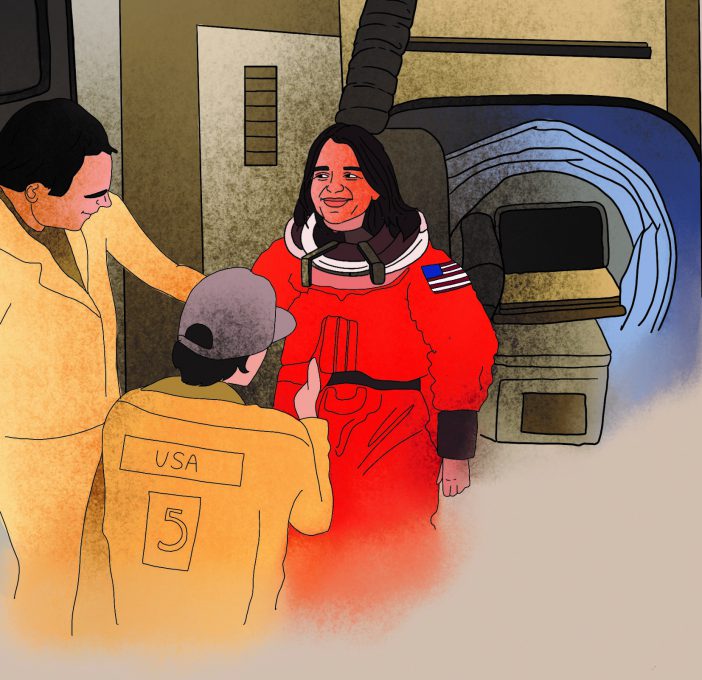
She left for space for the second time on January 16, 2003, in the Space Shuttle Columbia. It was a 16-day project. With her six companions, Kalpana Chawla stayed in outer space, carried out research, and gathered information. Unfortunately, on February 1, 2003, before landing, the Columbia space shuttle malfunctioned and crashed over Texas, and Kalpana along with her six companions lost their lives.
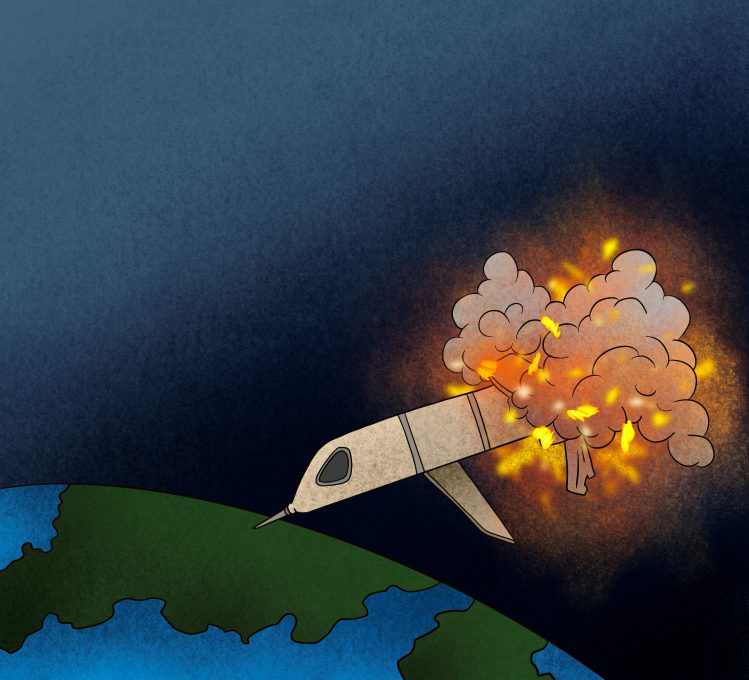
Although Kalpana Chawla is no longer with us today, she pursued her dream and proved that girls of India are no less than others. With willpower and due diligence, dreams can be fulfilled.
She always said that she was made to go into space and that she would die in space too. She completed her mission and bid farewell to the world. And since then, a new star shines brightly in the sky.
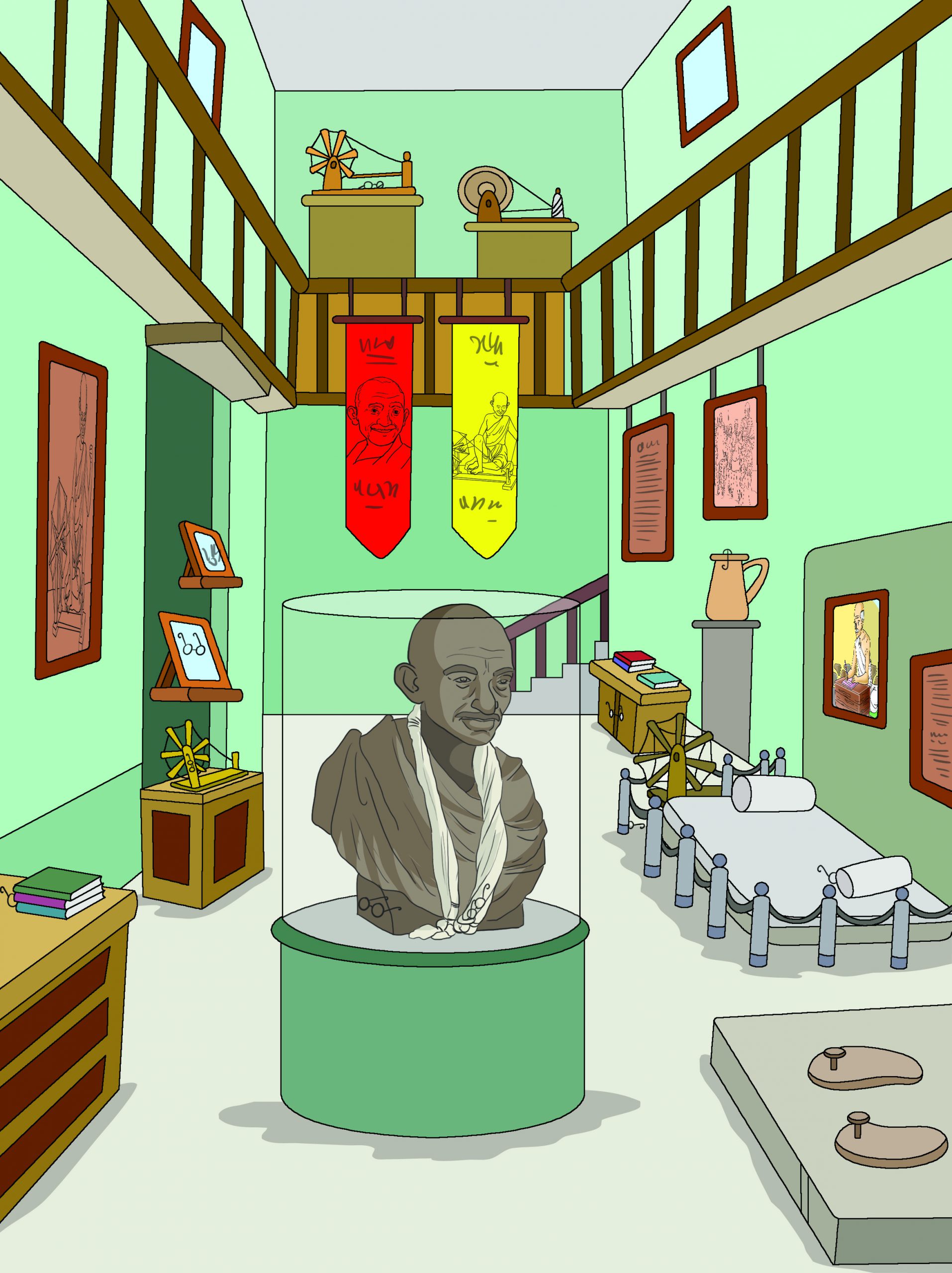
Gandhi Jayanti is celebrated on October 2. A statue of Gandhiji is placed in one part of a museum. Find 10 of his iconic glasses that are hidden in the museum.
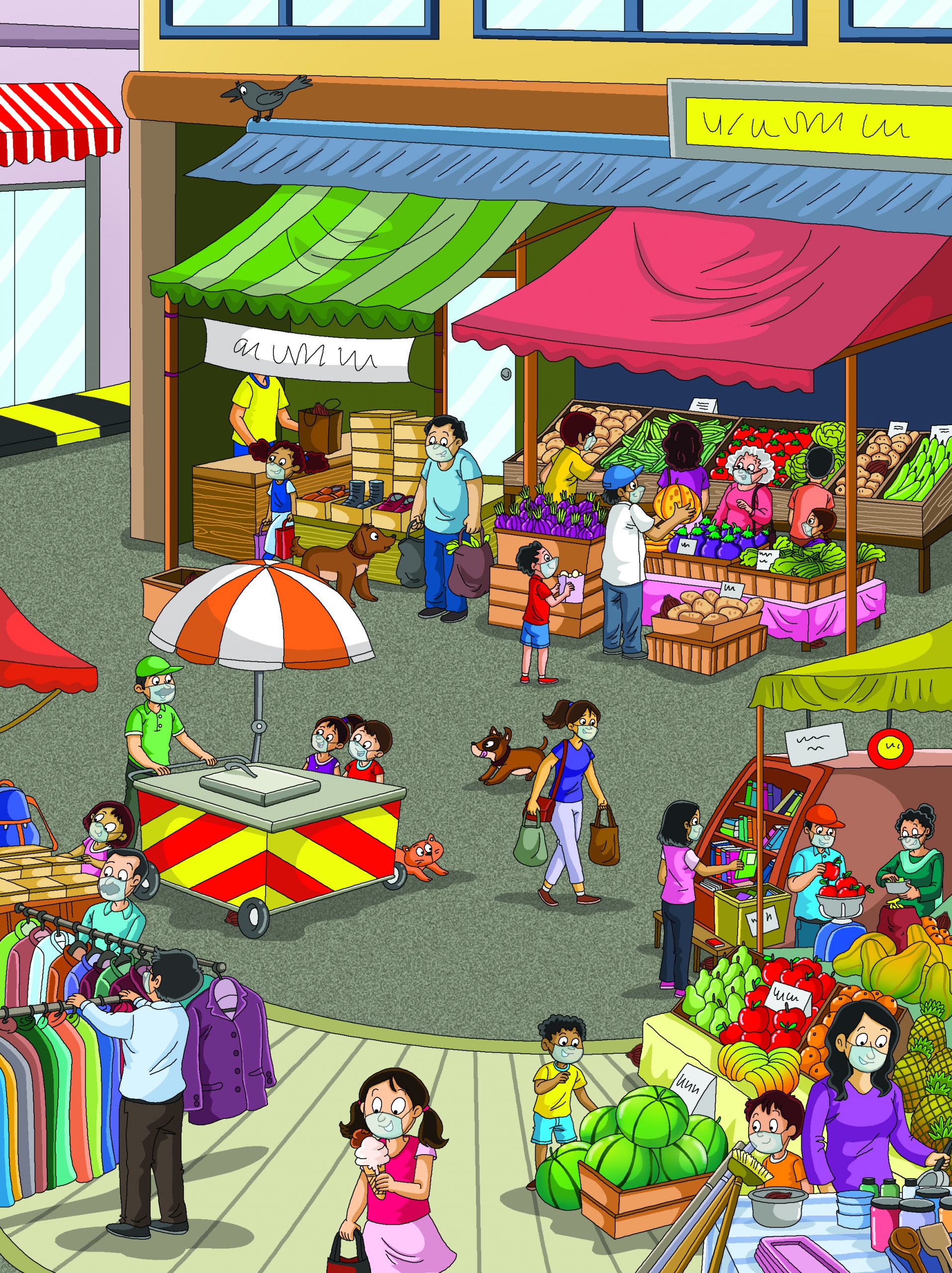
It’s World Coconut Day on September 2. In the market, find 10 hidden coconuts.

World First Aid Day is celebrated on September 14. Help the kids find the following missing items from the first aid box: band-aid, tablets, cotton, bandage, antiseptic tube, thermometer, torch, scissors, tweezer and small hot water bag.
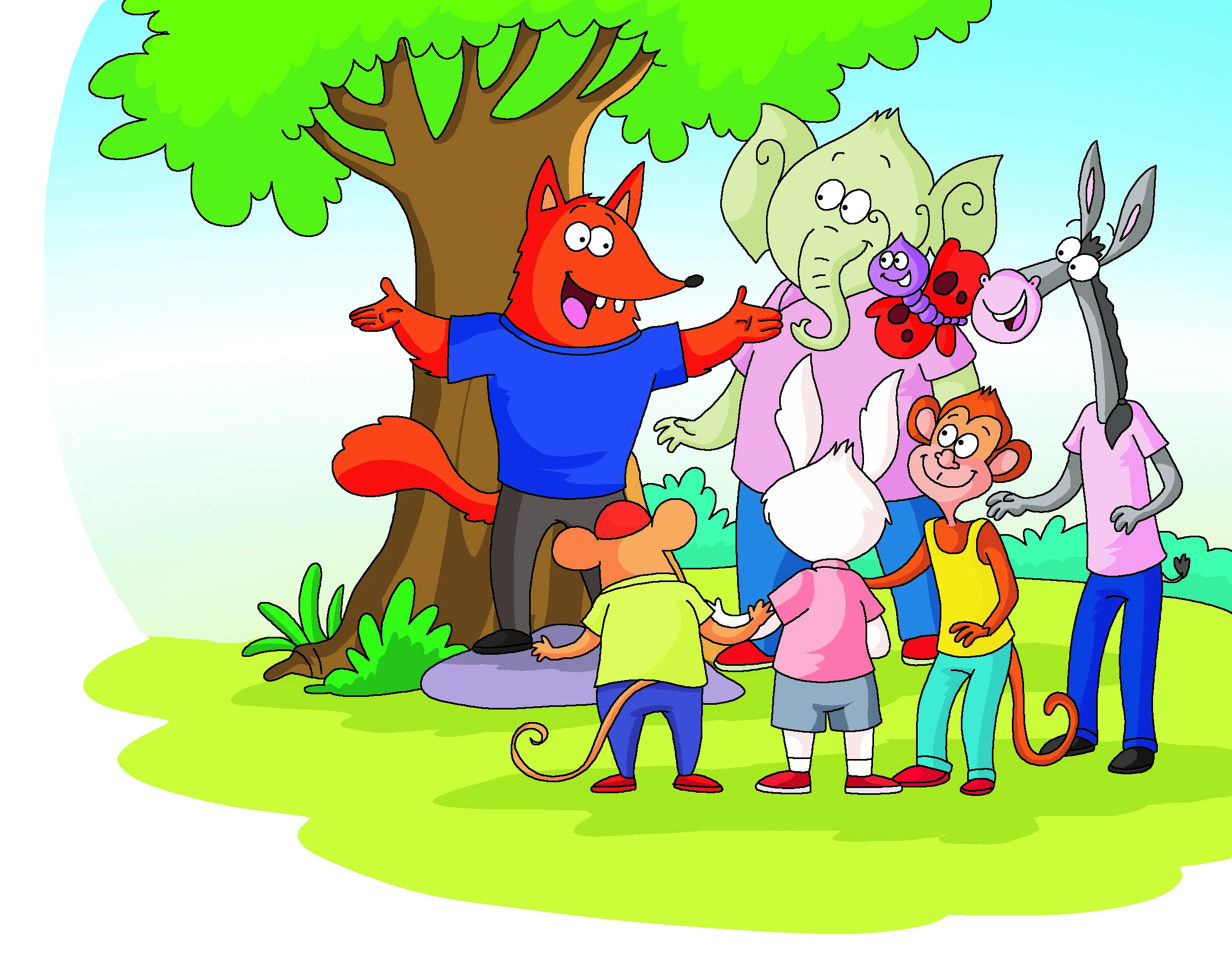
One day Baddy fox announced in Champakvan that he would like to take all the animals on a trip to the moon.
Everyone became very excited.
“Are you really taking us to the moon?” Damru donkey asked in amazement.
“Yes. All, but the big and heavy animals. Otherwise our rocket will not be able to take off from the ground.” Most animals started laughing at Baddy’s words.
“But where is your rocket?” Cheeku rabbit enquired. “And also, what would be the cost of taking us to the moon?”
“Our rocket is on an island not far from here. And for the cost, my motive is not business or to make money. I just want to give you the joy of going on the moon.
So you do not have to pay anything for the trip,” replied Baddy.
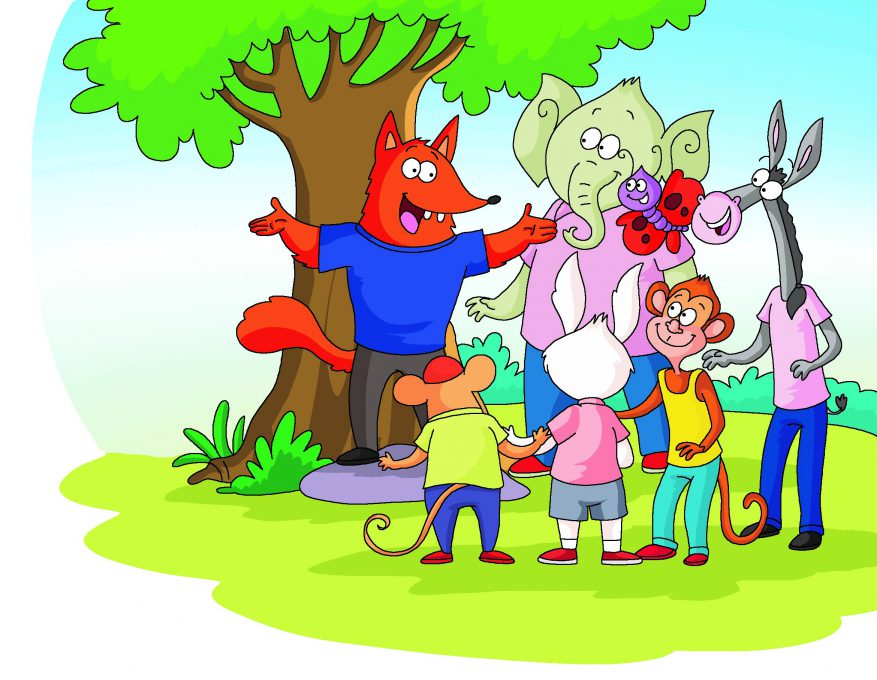
All the animals started shouting in joy.
“There seems to be something fishy here,” whispered Cheeku to Jumpy monkey.
“We have to be careful.”
Both went to king Shersingh and told him about Baddy’s trip to the moon.
“If Baddy wants to do this, then it is a very good thing. Why are you troubled by his offer?” asked Shersingh and told them to leave the matter.
Cheeku then said to Jumpy, “We will have to keep an eye on Baddy on our own.”
Meanwhile, in the forest there was a fierce competition among the animals to go to the moon. Most of the small animals had registered their names with Baddy.
“Please be ready for the trip tomorrow. I will take you on the motor boat, to the island. From there we will go on the rocket to the moon. If the weather remains favourable, then we will be able to go on the moon tomorrow itself,” said Baddy and all the animals became all the more excited.
“I will take my favorite dress with me,” said Titu butterfly excitedly.
“No, please don’t bring any clothes or anything else. You will have to wear space-suits to the moon that we will provide. And yes, one more thing, leave your money and jewellery back in your house,” Baddy said. “We will return in a week.”
All the animals waited impatiently for the evening.
In the evening Baddy came with a motor boat to take them.
“Cheeku, why are you not coming?” asked Baddy.
“Baddy, please go ahead. I have got some urgent work to finish. My friend Jumpy
will go with you,” said Cheeku with a smile.
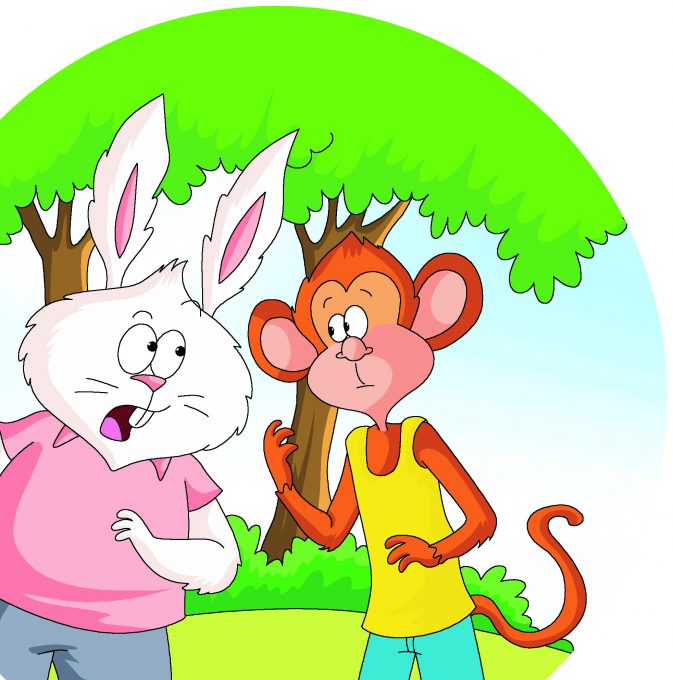
As soon as the motorboat left, Cheeku rushed to King Shersingh.
“Sir, here is something very interesting,” said Cheeku opening his laptop. He started the search engine and typed Baddys’ name. Soon many web pages came on the screen. He selected one and clicked on it.
“This is Baddy,” said Cheeku. “But why has the police caught him?” King Shersingh spoke out.
“Because he and his companions had looted the animals of Sonavana. He was even sentenced to jail. But he tricked them and ran away. Now he has come here,” said Cheeku.
“What does this mean?” asked Shersingh.
“It means that Baddy and his friends are thieves. They promise to take the animals to planet Jupiter or to the moon, and take them away from their houses. Then at night his companion steals all valuables from the locked houses. As soon as Baddy is informed that all the valuables have been stolen, he escapes to another forest. And his companions join him there,” explained Cheeku.
“This is a big conspiracy!” exclaimed Shersingh. “Why didn’t you inform me earlier?” asked Shersingh who was visibly angry.
“I tried to warn you earlier sir, but you felt it was alright for Baddy to take the animals to the moon,” replied Cheeku.
“Now what shall we do?” asked Shersingh.
“Don’t worry sir. Nothing will happen. I have sent my friend Jumpy, with them. Tonight Baddy’s friends will try to steal from the houses of these animals. We can catch them red-handed. And with their help we can catch Baddy,” Cheeku explained.
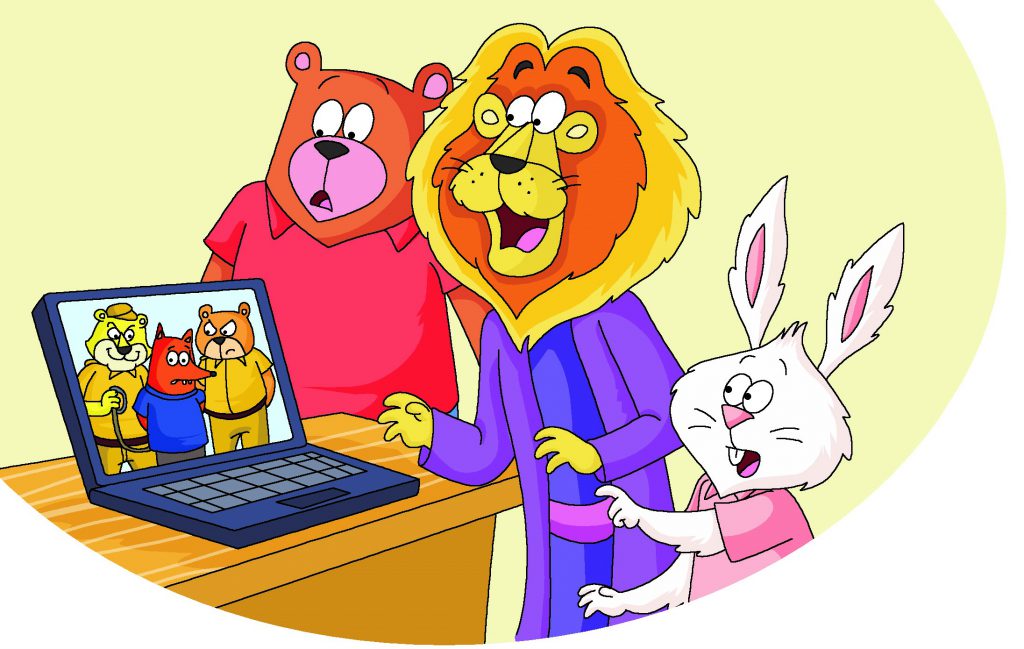
“But we have to be very careful. If Baddy gets the wind of this, he may harm our citizens,” Cheeku continued.
“You need not worry. I am going to talk to Inspector Blacky Bear,” Shersingh assured Cheeku.
At night Inspector Blacky and his team spread out in the forest. They hid outside the houses of the people who had gone on the trip.
Suddenly some movement was seen outside Damru donkey’s house. Inspector Blacky gave the signal, and his team caught Laptu jackal from there and on questioning him they were able to catch all the others.
“But how do we catch Baddy? He is very cunning,” asked Shersingh who was really worried.
“We have a plan for that, too,” said Cheeku and whispered something in Shersingh’s ear.
Laptu jackal phoned Baddy, “Hello Baddy, we have collected all the treasure. Please come here quickly on your motorboat, so that we can get out of here immediately.”
“That’s perfect! I have mixed sleeping powder in the food of the animals. They are all sleeping soundly. I am coming on the motorboat. Meet me at the riverside,” Baddy said on the speakerphone, so that, Cheeku and Shersingh could hear whatever Baddy said.
In a few hours, Baddy was in police custody.
The next day when the animals woke up, they could not understand anything.
“Have we reached the moon?” asked Meeku rat looking around.
“No, you are not on the moon. You are in Champakvan. But Baddy who was taking you on a trip to the moon, is on a trip to jail,” said Cheeku. Shersingh and Inspector Bear started laughing. The other animals could not understand anything and they started looking at each others’ face.
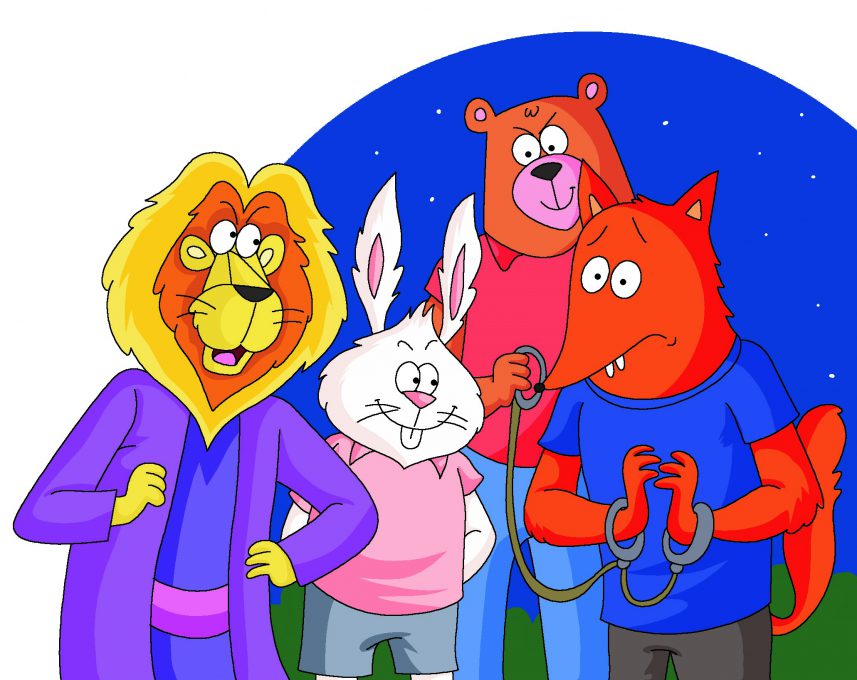
Later when Shersingh told them what had happened, they all praised and thanked Cheeku.
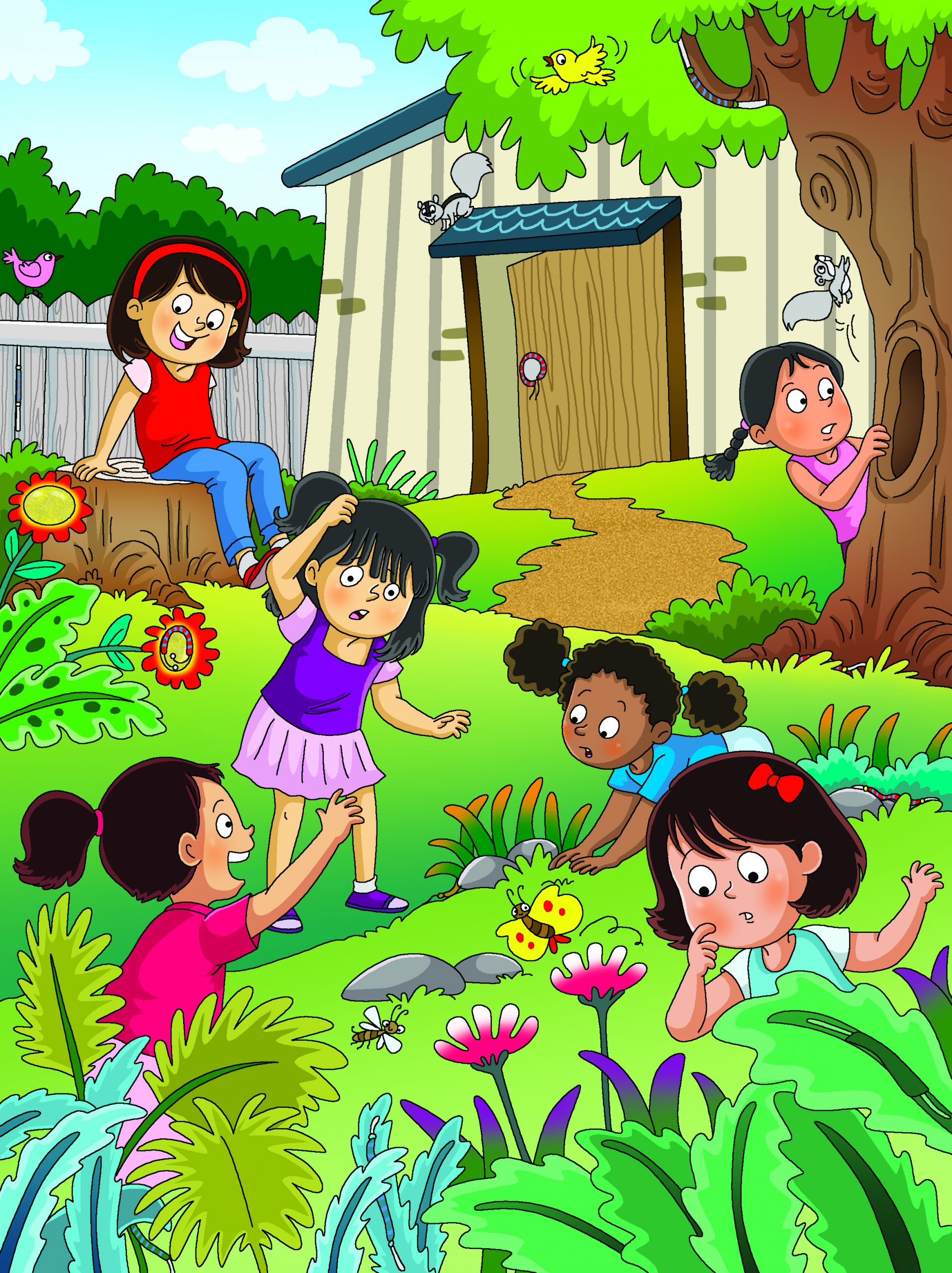
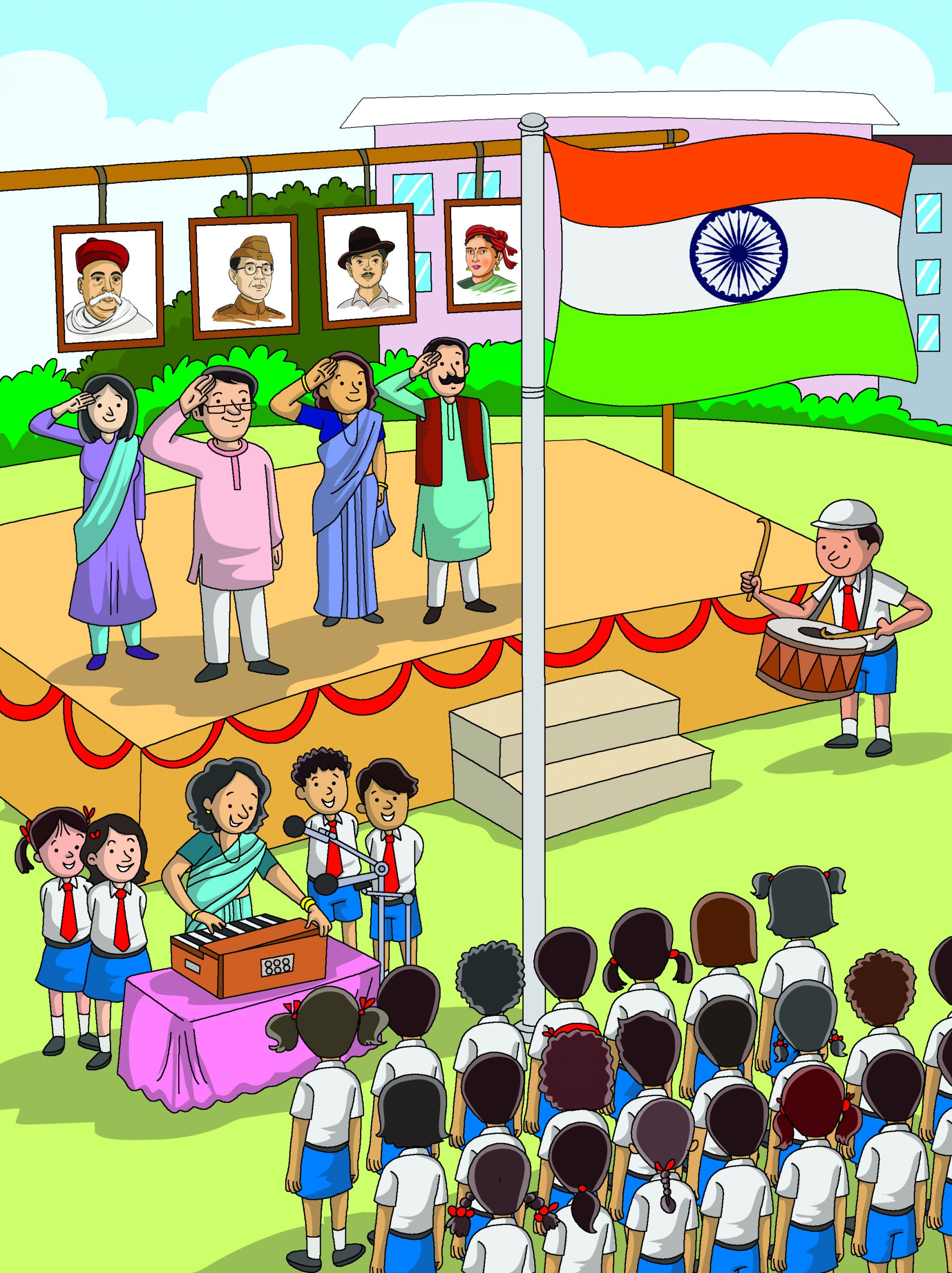
On August 15, 2018 India celebrates its Independence Day. Observe the picture for a minute, cover the page and answer the questions given below.
Q1. What is the boy in the white cap doing?
Q2. What is the colour of the students’ uniform?
Q3. Name 2 freedom fighters whose photos are there on the stage?
Q4. How many people are saluting the flag?
Q5. What is the name of the school?
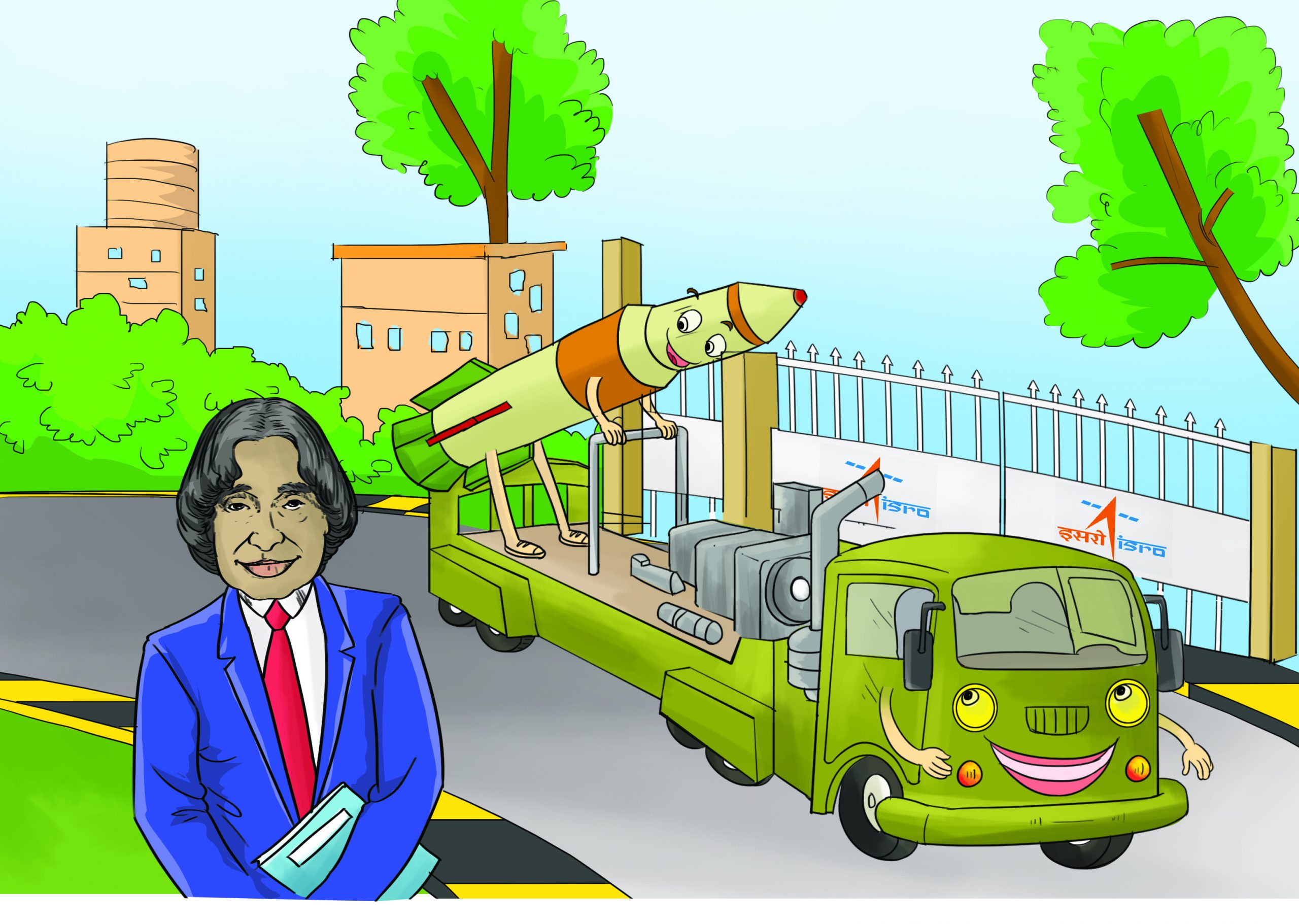
A guided missile was being installed on a vehicle called the missile launcher. The vehicle had seen such a device for the first time. He asked the machine, “Hello, my friend! Nice to meet you. I am seeing you here for the first time. Who are you?”
The missile smiled and said, “I am a machine made by Indian scientists and I can be controlled by computers to hit a specified target.”
The vehicle who did not understand what the machine said, asked, “What is your name? Maybe I’ll understand you better with your name.”
“I’m a guided missile,” said the missile.
“Ah!” said the vehicle and asked, “Weren’t you developed by the missile man,
Abdul Kalam?”
The missile was feeling happy that the vehicle had recognised her and said, “Yes, that’s me! Missile Man Abdul Kalam along with other Indian scientists made me by developing the technology for the first Indian guided missile!”
The vehicle was curious and said, “Tell me more about Abdul Kalam.”
“All right!” the missile said. “I have been with him for a long time. He and his team designed and built me. Do you want to hear the story?”
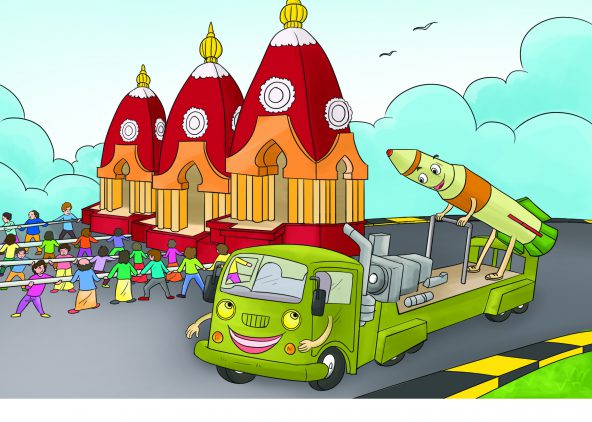
“Yes,” the vehicle said. “I’ve been alone for a long time. There’s no one to talk to me here. I would love to hear his story.”
The missile loved to talk about his maker. Who would not? He said, “Abdul was born on October 15, 1931, in the town of Rameswaram in Tamil Nadu. Rameswaram is a famous tourist spot. It is at the tip of the Indian peninsula.”
“Yes, Rameswaram is a beautiful town where one can see the three different water bodies—the bay of Bengal, the Indian ocean and the Arabian sea, meeting each other,” added the vehicle.
“Yes,” said the missile. “Abdul’s father, though not formally educated, was a man of clear and simple ideas. He was strong-willed and believed in hard work. Their family was very poor. His father rented boats to fishermen. The family income was limited. Abdul’s family was huge and there were many mouths to feed.”
“Abdul studied in Rameswaram. He told me once his teacher Iyadurai was teaching students about the science of flying, but the children could not understand anything.”
“So Iyadurai took them to the seashore, and showed them birds flying there, and explained the lesson again. This had a huge impact on Abdul and he decided that he would build a career in aviation science when he grew up.”
“His teacher always said—to achieve success in life, one must have strong will power, faith and patience. Once a student understands and masters these three qualities, he/she can achieve anything in life.”
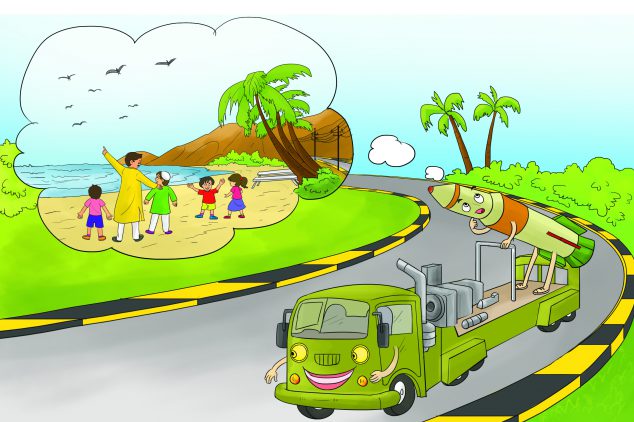
“So true,” agreed the vehicle.
“Abdul made this his life motto. When his family faced money difficulties, he took on the job of distributing newspapers in the morning and then went to school after that to study.”
“Sometimes, his math tutor called him at 4am for extra lessons. After class, he would go and distribute newspapers, and later go to school. After returning from school, he would sit at the flower shop to help his father.”
“He faced many difficulties in life,” said the vehicle, feeling sad for young Abdul.
“Yes,” said the missile. “But he did not let the difficulties stop him. He just kept working on them one step at a time. In 1957, he graduated in Aeronautical Engineering from Madras Institute of Technology.”
“Oh yes! You did say that flying was his childhood dream!” said the vehicle, excitedly.
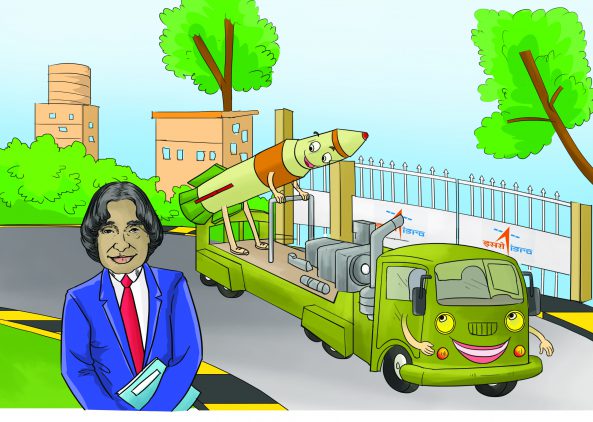
“Yes, he realised his dream. And now it was time to put to work what he had studied. After graduation, he joined the Defence Research and Development Organisation, an Indian military research institute, as a scientist.”
“Soon, he joined the Indian Space Research Organisation (ISRO), where he worked with a team of rocket engineers to set up a rocket launching station, which is used even today. In his career at ISRO, he built the Satellite Launch Vehicle or SLV. And in July 1980, for the first time ever, India successfully launched satellite Rohini in space using the SLV. India became one of the few countries to have done so.”
“Due to his contributions, Abdul was made the Project Director-General of ISRO. He continued working on his core passion along with other scientists. Their achievement of launching satellite Rohini in space made India an exclusive member of the International Space Club.”
“Wow! That is indeed a great honour for India,” said the vehicle, feeling very proud.
“Yes! But Abdul dreamt India should achieve advanced space technology. He wanted India to be honoured by the whole world. Vikram Sarabhai had made it possible for India to enter the field of satellite and launch vehicles. Abdul worked with the team at ISRO on the designs of target-controlled missiles or guided missiles that built missiles like ‘Prithvi’ and ‘Agni’.”
“Right!” said the vehicle. “And you’re built on the same technology. The fact that you’re installed on me makes me proud too.”
“Thank you!” said the missile. “I’m a guided or target-controlled missile.
Abdul was then entrusted with the development of nuclear technology to strengthen India’s defence capabilities. He was also appointed as the adviser to the Defence Minister from July 1992 to December 1999. And that introduced
him to politics.”
“Yes, I know some of that,” said the vehicle. “He became the President of India on July 25, 2002. And remained the president till July 25, 2007.”
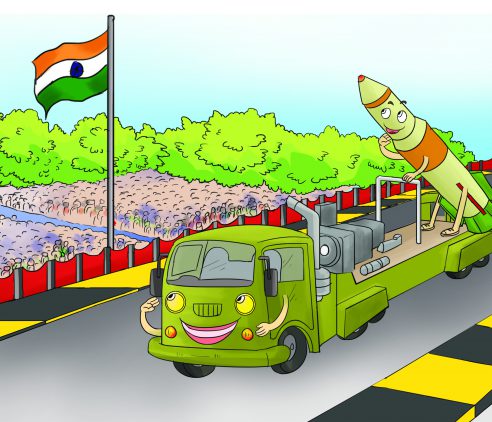
“Yes, and after that, he stepped down from politics. He spent his time studying and writing books. He shared his knowledge with the students and at the same time wrote several books to enlighten and guide the youth. He said that no work in life is difficult. If one is determined, one can overcome all difficulties. His books include Wings of Fire and India 2020.”
“He had clearly defined goals for India in his book India 2020. While teaching a class at the Indian Institute of Management, Shillong, he suddenly had a heart attack.”
“What?” said the vehicle, in shock. He continued working until the last breath of his life,” said the missile and paused.
“I heard that he received many awards including the Bharat Ratna, Padma Bhushan, Padma Vibhushan and the Hoover Medal. But I don’t know his full name till today. Do you know it?” asked the vehicle.
“Yes,” said the missile. “His full name was APJ Abdul Kalam or Avul Pakir Jainulabdeen Abdul Kalam.”
At that moment, someone started the vehicle. “Well, it’s time for me to work now! When we catch a break, we will chat again!” said the vehicle.
The missile looked at the scenery around and enjoyed the view and its thoughts on its creator
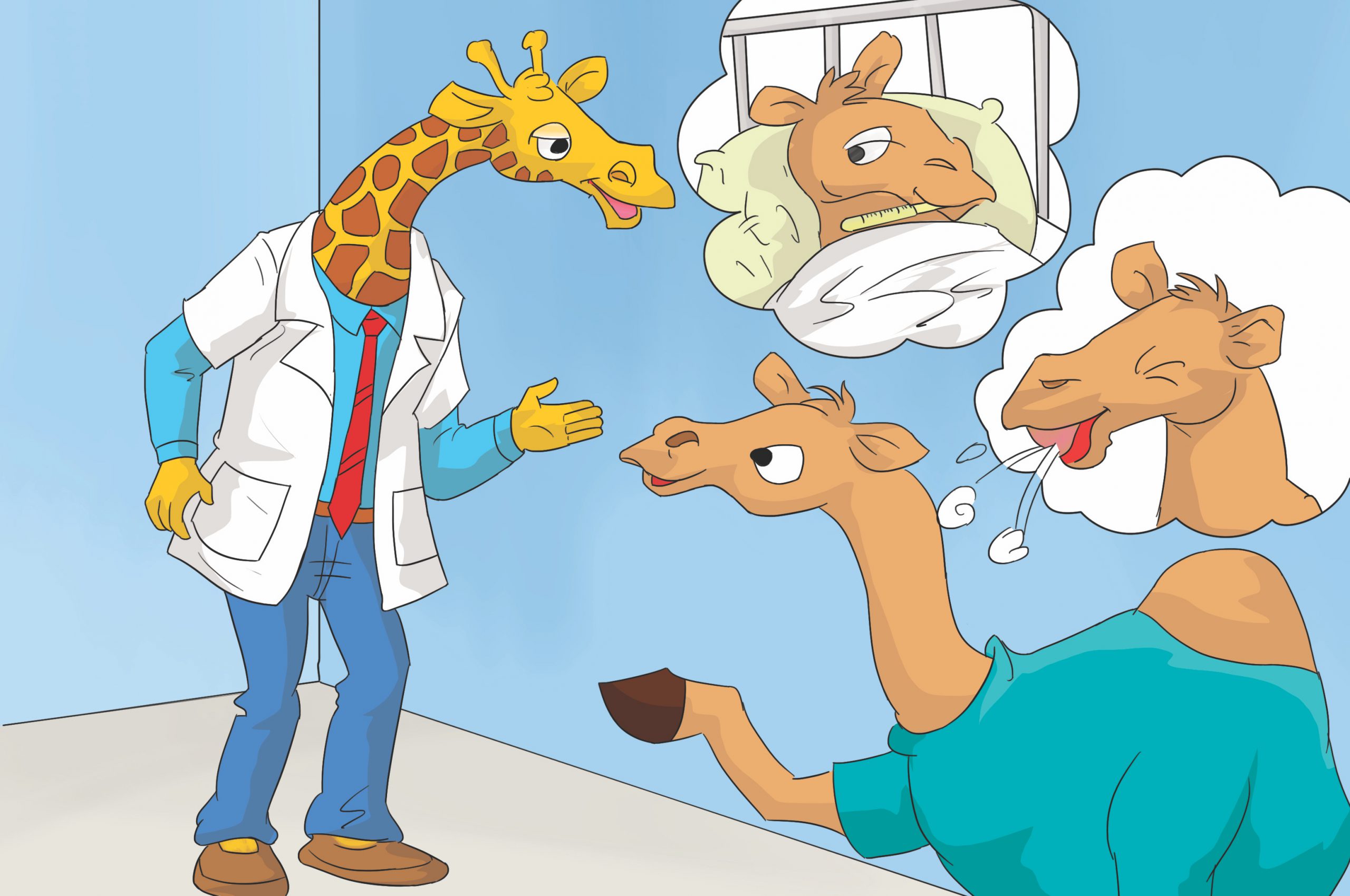
Kiki camel was fond of eating dates. They were his favourite fruit and he usually ate them without washing either his hands or the fruits.
His grandmother always told him to wash his hands before eating but Kiki never listened.
Kiki was a good student but at home, he was careless. One day, volunteers from a health institute visited the school as part of a health awareness program. The function started at 9am in the school hall. Doctor Gogo giraffe and his team were hosting the program.
Ms Cat introduced Dr Gogo and his team to the students who welcomed them with loud applause.
Dr Gogo was a regular visitor to the school and the children enjoyed his company as he gave them information through fun activities.
Dr Gogo began the program with a skit.
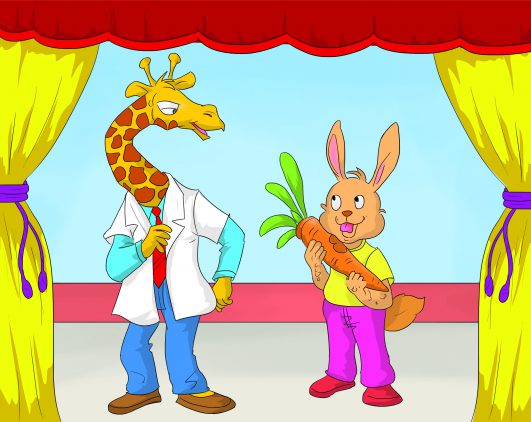
The first scene started with Roko rabbit chewing on some carrots in the field. He was eating them without washing his hands or the carrots. Later, Roko felt sick as he had an upset stomach and was vomiting continuously.
His mother took him to Dr Gogo who checked his stomach immediately.
“But I didn’t eat anything from outside. I just ate some carrots, which I plucked from the field,” Roko said, innocently.
“Did you wash your hands before you ate the carrots and did you wash the carrots in clean water before eating?” asked Dr Gogo.
“No, I did not. I was so excited to see the carrots, I forgot about it,” replied Roko.
In the next scene, Dr Gogo explained the viruses that are found in the surroundings and how these viruses get inside our bodies and make us sick if we eat fruits and vegetables without washing them.
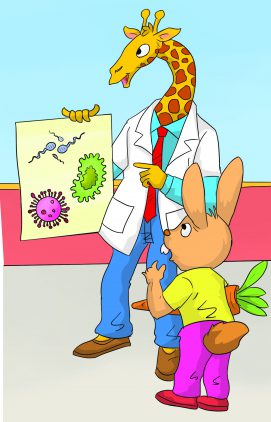
He further told Roko that the worst thing about these viruses is that once you get infected, they spread quickly and can infect his entire family and his friends too! It is contagious and it spreads from one to another.
Roko was surprised to hear what Dr Gogo said and so were all the other children.
He asked, “But how do these viruses get into our bodies?”
Dr Gogo explained, “If we do not wash our hands before eating, these viruses travel from our dirty hands into our mouths and make us sick. Therefore, it is important to wash our hands before we eat anything and to also wash the fruits and vegetables that we eat.”
Roko promised that he will never be careless again and will always wash his hands before eating.
In the next scene, when Dr Gogo offered Roko some red fresh carrots, he immediately ran to wash his hands. He also washed the carrots with clean water.
The skit ended.
Dr Gogo turned towards the children and asked, “Tell me, children, what did you understand from this skit?”
“That we should always wash our hands before eating and also wash the fruits and vegetables that we eat with clean water,” said Harry squirrel.
Jojo elephant asked, “Dr Gogo, can you tell us more about these viruses?”
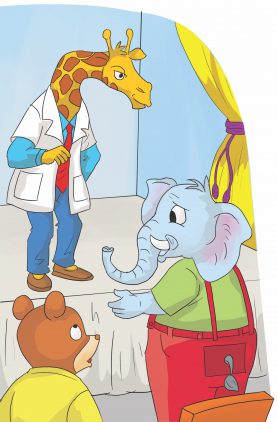
Dr Gogo replied, “Sure. I will explain it all.”
The children sat silently to hear what Dr Gogo had to say.
“Children, there are various types of viruses that spread just through contact. Our hands touch different surfaces and carry the virus on them. When we sneeze or cough and cover our face with our hands, we should wash them immediately as the virus from our hands can spread to others. Right now, coronavirus is on the rise and it spreads when we don’t maintain hygiene.”
“Another disease called swine flu spreads from pigs to humans and is very dangerous. Pigs first get infected and when a human comes in contact with those pigs, they get infected. Humans can spread these germs when they cough or sneeze as the germs mix in the air and infect others,” explained Dr Gogo.
Kiki camel heard all this and raised his hand to ask a question.
“Doctor, how will we know when we have been infected by the virus?”
Dr Gogo replied, “Each virus has different symptoms. You could get fever, cough, cold, stomach ache, diarrhoea, vomiting and feel weak. You should immediately consult a doctor.”
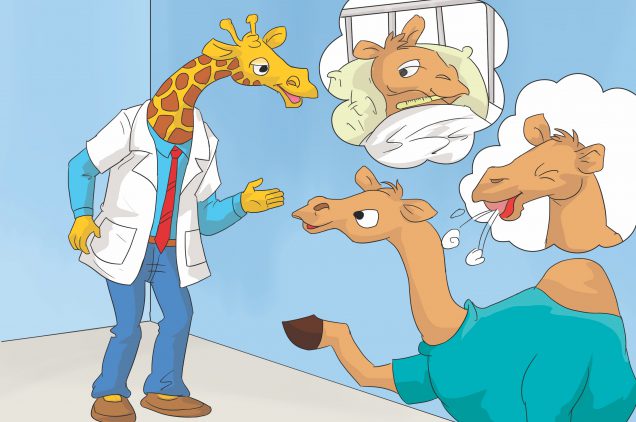
Rancho monkey asked curiously, “Doctor, how can we protect ourselves from getting infected?”
“It is important that we maintain some distance from people who have been infected. Also, you must cover your mouth whenever you cough or sneeze and wash your hands every time before eating,” Dr Gogo explained.
The children had understood what they were told and they all applauded Dr Gogo and his team. They promised to follow all the rules of hygiene.
Kiki camel realised his grandmother was right and as soon as he reached home, he apologised to her.
She hugged him and forgave him. He promised her that he would listen to what she says.
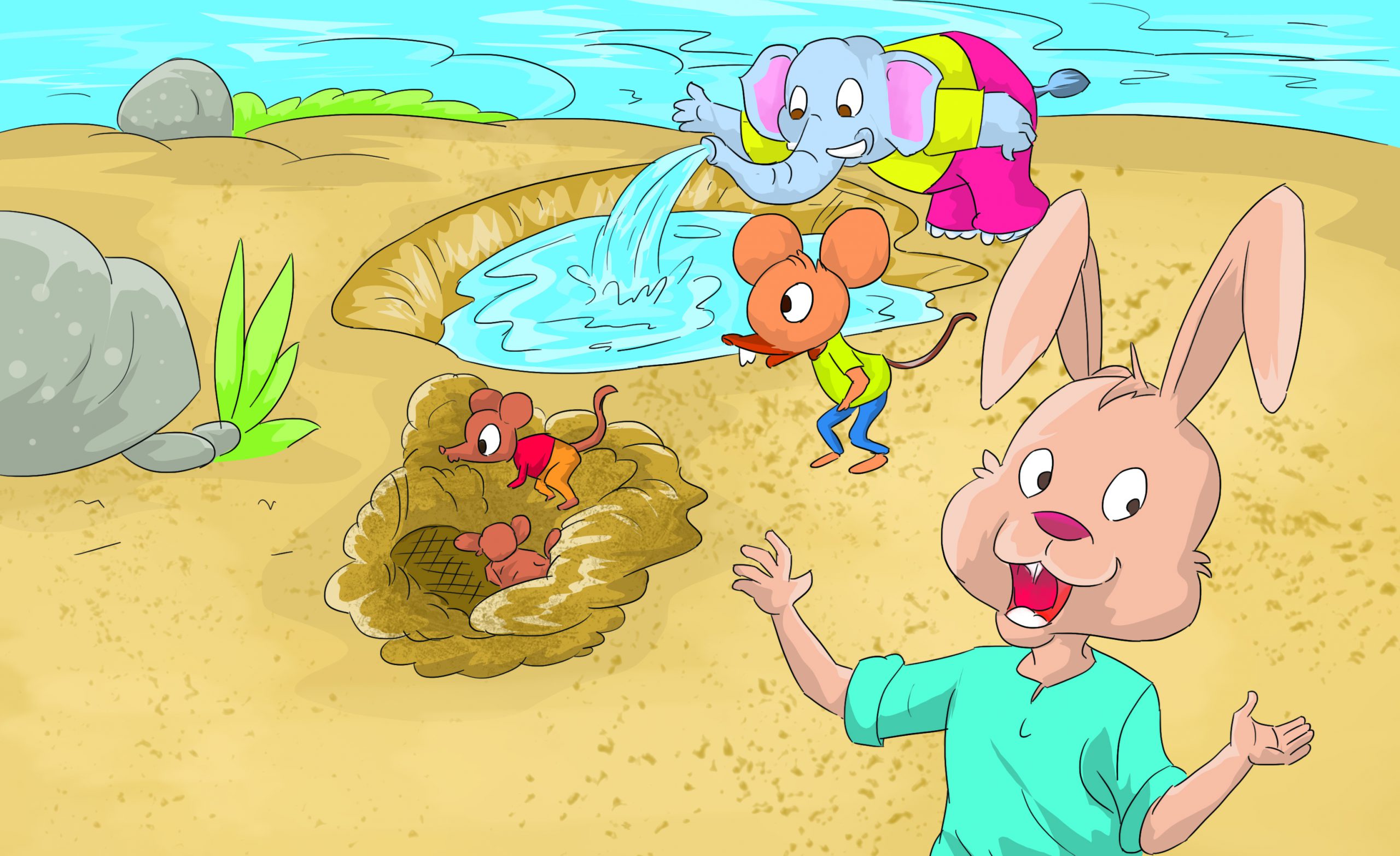
The forest had hardly received any rain that year. Roro rabbit’s farm that yielded sweet carrots every year produced tasteless carrots this time.
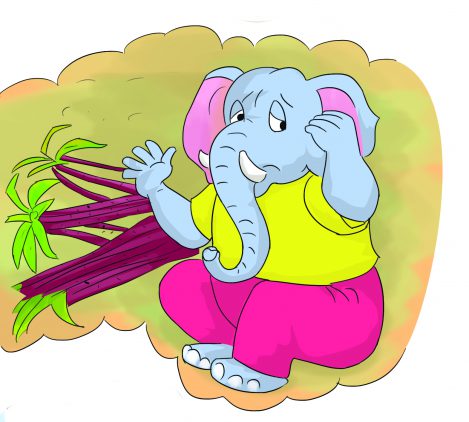
Rambo elephant’s sugarcane fields were drying up. The yield of papayas and oranges from Bobby beaver’s field was getting spoiled.
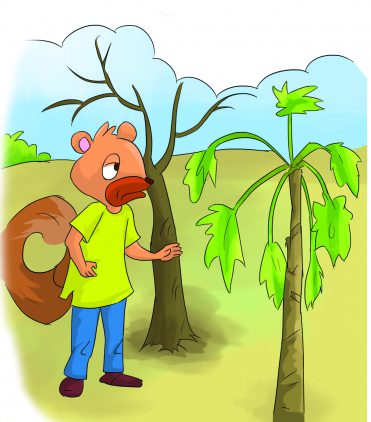
The residents were getting severely affected and took their concerns to King Sheru who was aware of the situation.
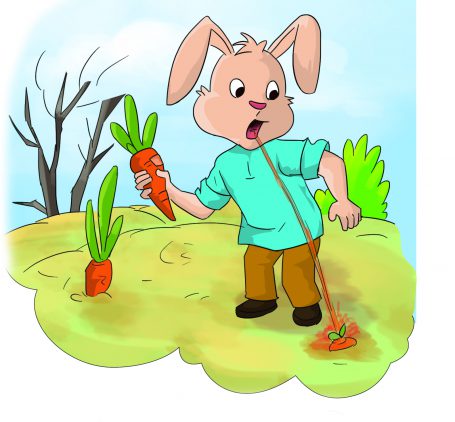
He and his ministers had been discussing the problem but they failed to come up with any solution to save the crops and the residents.
“My king, our forest is on the banks of a river that has enough water. If we could find a way to bring that water to the fields, our crops can be saved,” suggested Twinkle mynah. She flew to places nearby and was aware of water bodies around the forest.
“You are right. But how do we get the water to the fields?” asked the king.
“My king, if you give the command, all the birds will bring water in buckets made of leaves,” said Twinkle, excitedly.
“That’s very kind of you, Twinkle. I know you are working hard but the birds won’t be able to carry much water and we need more for the fields,” said King Sheru.
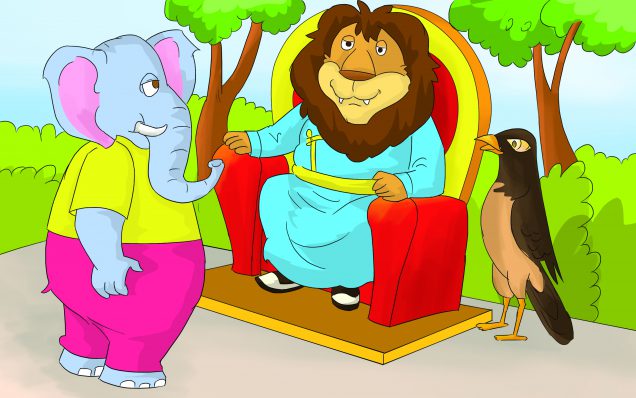
“My king, the elephants can do it. They are huge and will be able to fill water in their trunks and bring it to the fields,” said Twinkle, after a little thought.
Sheru liked Twinkle’s suggestion and he looked at Rambo elephant who said, “My King, Twinkle’s suggestion sounds possible. I will put all the elephants to task immediately but…”
“But what?” asked King Sheru.
“We too won’t be able to supply enough water to the fields,” explained Rambo.
King Sheru had to think of another plan. Gabby bear, Browny leopard, Tyson rhinoceros, Jackie jackal and Sweety deer were thinking of ideas but none of them could reach any practical solutions.
“My king, with your permission I would like to say something too,” said someone in a meek voice.
They all looked around and saw tiny Momo mouse standing with folded hands.
King Sheru said, “Yes, of course. Tell us what you have in mind.”
“My king, the mice can get together and dig a drain from the river to the fields. It will allow the water from the river to come here easily,” said Momo.
“Excellent, you have solved the entire problem. This will save our crops from drying,” King Sheru jumped with joy.
While everyone was praising Momo, he looked a little troubled.
“What is troubling you?” King Sheru enquired.
“My king, digging the drain is not a problem but…”
“But what is it?” King Sheru asked.
“But since the current in the river is very strong, the water will enter the drain with great speed and it will wash a lot of soil with it. It may flood the fields as it will let huge amounts of water into them,” explained Momo.
Momo’s concerns dampened everyone’s spirits. They realised that in an effort to prevent a drought, they may create a flood.
This thought disappointed King Sheru the most. Rambo sat with his head in his hands.
Suddenly, Twinkle broke the silence and said, “My king, Momo’s idea is good. We just need to make a few changes.”
“What kind of changes?” a few animals asked in a chorus.
“First, we can dig a large pit close to the river while Momo and his friends can dig a drain from that pit to the fields. Then the elephants can fill up the pit by bringing water in their trunks. This way, we will control the current of the water and it can reach the fields without causing a flood or harming the crops,” chirped Twinkle.
“That is an excellent idea. We, too, can help to fill the pit with water!” Gabby bear and Bobby beaver said in unison.
“And we can make buckets for the other animals to fill the pit,” Dinki Deer added with excitement.
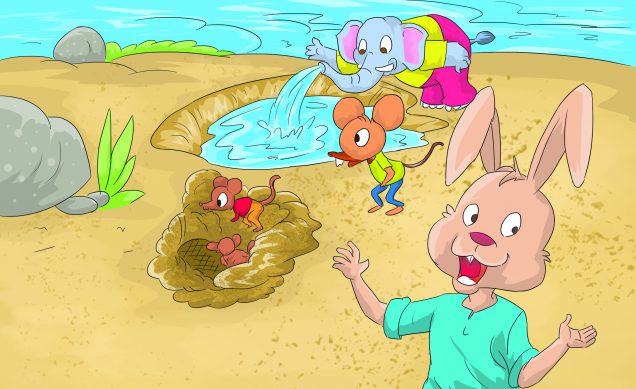
Tyson rhinoceros came forward and said, “My king, please allow me and my friends to take the responsibility of digging the pit. We can start today.”
King Sheru happily permitted him. The unity between the animals convinced him that the crops would be saved.
Everyone performed their tasks immediately. Rambo and his friends joined Tyson to dig the pit. Momo’s team dug a drain to the fields. The rest of them made buckets.
The job was completed in one week. King Sheru filled the first bucket and poured it into the pit. All the others followed his lead.
Soon, water reached the fields. Roro rabbit received water first and started dancing! Each field was given enough water to grow the crops. Water wasn’t wasted.
All the animals celebrated their victory against the drought. They even managed to plant some trees. Soon, the weather changed and it started raining! The animals had defeated a drought with their unity.
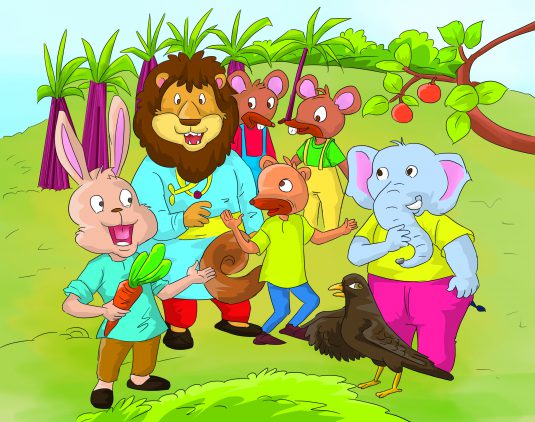
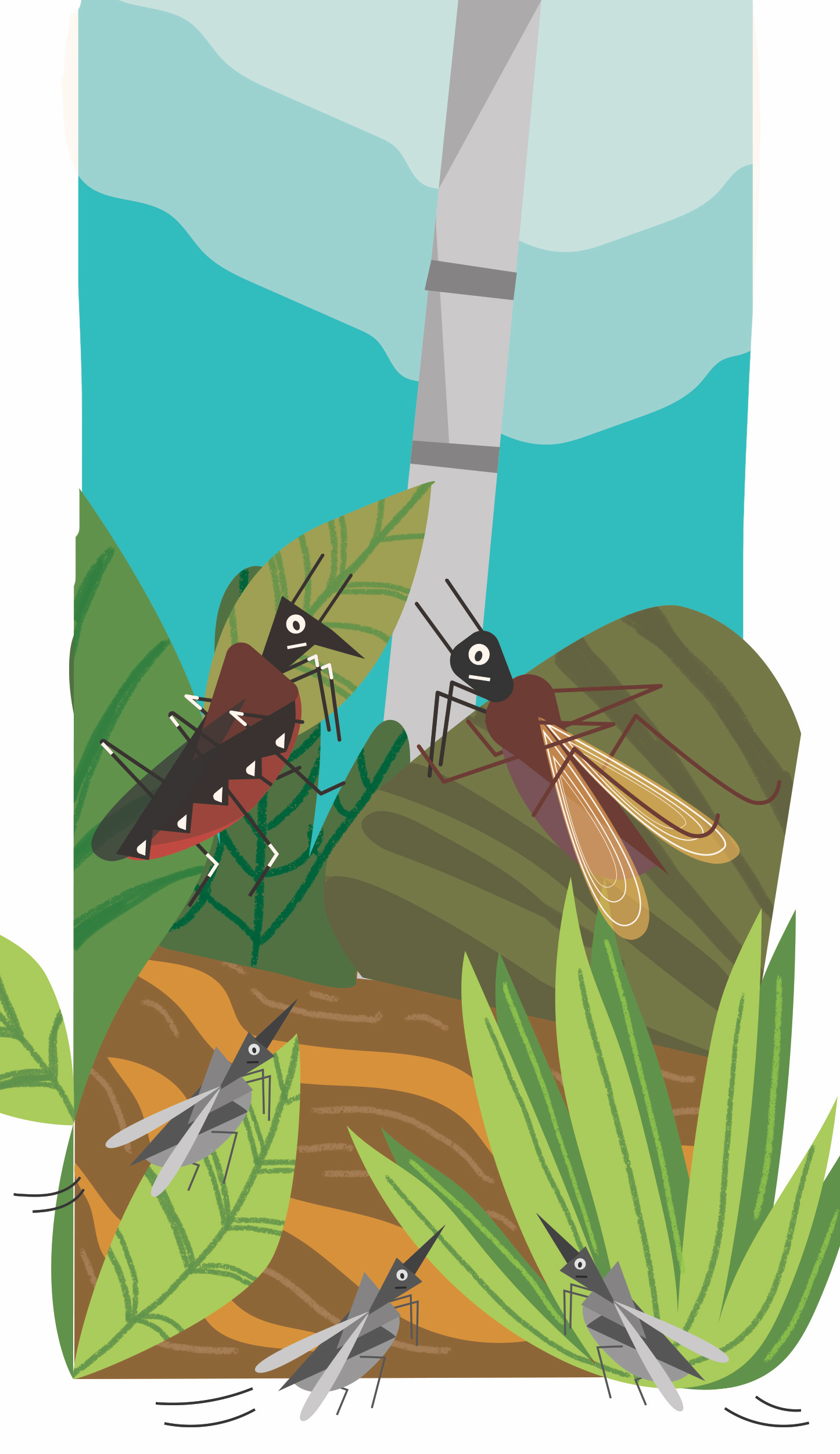
The monsoon rains had made many puddles of water on the street.
Mosquitoes bred in these puddles and came out of their hiding places in search of food in the evening.
But one day, a fogging vehicle roamed these streets and let out smoke to get rid of mosquitoes. Many of them suffocated and fell on the ground while many hurriedly left the human public places and flew towards the forest to save their lives.
The mosquitoes sat in their groups. The Anopheles group leader, Molly female mosquito, was relieved that many of them survived. The Aedes group leader, Pushpy female mosquito was happy looking at her swarm of mosquitoes. Mosquitoes belonging to the Aedes group transmit various diseases to humans like dengue and yellow fever. Anopheles is a group of mosquitoes that are commonly known as malaria mosquitoes.
After coming a long way, they were feeling hungry. But there was no food for them.
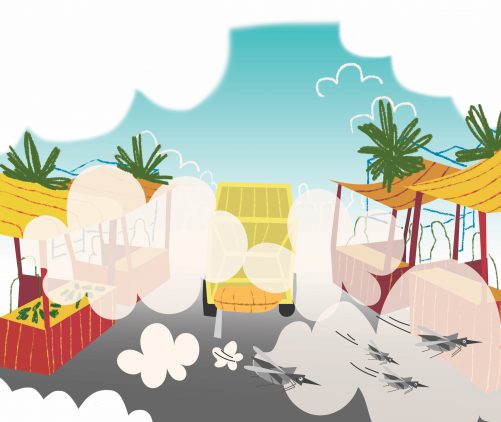
Molly saw all the mosquitoes hungry and said, “It is just a matter of time before we are wiped out. Today, we were forced to flee human settlements and hide before some of us could fill our stomachs.”
“But why did we have to leave in such a hurry?” asked Coco mosquito from her group.
“Did you not see that every morning and evening, the fogging vehicles spray smoke to kill us? A large number of us breathe the smoke and die! We had to run away from it!” said Molly.
“What will happen to our eggs, which we left behind in the gutter?” asked Sally mosquito with tears in her eyes.
“If we survive, we can ensure our group grows bigger. I have heard that humans are suffering from dengue fever spread by mosquitoes,” said Coco.
“What is dengue?” asked Sally.
“Humans get a headache, fever and red patches develop on their bodies. They also get very weak. Some of them die due to dengue while some survive,” informed Molly.
“But our group spreads malaria. So, who is responsible for dengue?” asked Sally.
“Dengue could be spread by the Aedes group. If they are causing so much harm, why are we forced to flee from human settlements?” asked Coco.
Aedes mosquitoes, resting nearby, heard this. Their leader, Pushpy said, “What are you talking about us?”
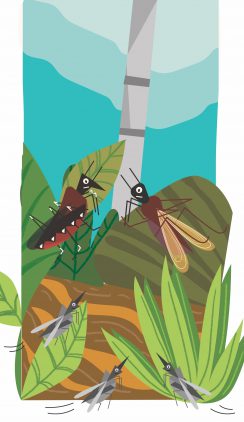
“We said nothing wrong. You must have heard the announcements on the roads that your group of mosquitoes are spreading dengue in human settlements,” said Molly.
“This is not true. We don’t spread dengue or anything. We just suck a little blood from human bodies when we are hungry,” said Pushpy.
“This is exactly what bothers humans. When you suck their blood, your saliva enters their bodies. This saliva contains a virus that causes dengue. The virus gets into their blood and starts growing fast. They fall sick and have to be rushed to a hospital,” informed Molly.
“Then must we stop sucking human blood and stay hungry?” asked Pushpy.
“As long as your saliva contains this virus, you will have to,” said Sally.
“But we can’t do this,” Pushpy said.
“If you can’t do it, then be prepared to bear the consequences. Humans will continue to kill mosquitoes and one day, we won’t exist,” replied Sally, sobbing.
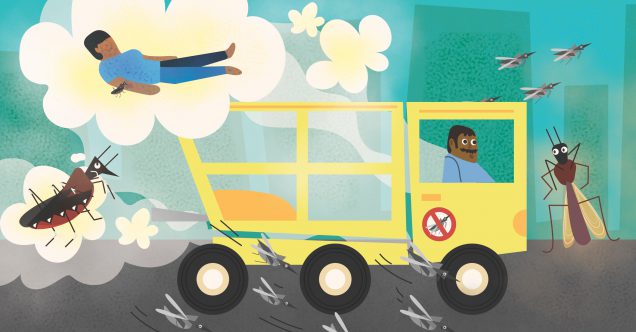
“You are right. But what will happen to us? We’ll stay hungry!” said Pushpy, worried.
“We will have to think of a solution where we don’t bother humans so they don’t bother us,” suggested Molly.
Pushpy agreed. But before she could leave, she asked, “Do you know why this dangerous virus doesn’t harm us?”
“The virus uses you as a medium to travel from one place to another. You help it to get into human bodies. That’s why it doesn’t harm you,” said Molly.
“Okay. But when humans held you responsible for spreading malaria, they did everything they could to destroy your homes. They used mosquito nets, smoke and devices at every home. How did you all survive that? Can you help us with any solution?” Pushpy asked.”
“Just leave human settlements and arrange for your food elsewhere. Humans, too, need to survive and they will keep finding new ways to destroy us,” said Coco.
Pushpy nodded and left to discuss with her group. She was afraid the spread of dengue was worse than malaria.
She gathered all the mosquitoes from her group and said, “In the human settlements, a disease called dengue is spreading because of us. You must have heard the announcements on the loudspeakers that water should not be allowed to collect near houses. They are destroying our puddles so that this disease doesn’t spread. We have to think of a way to survive this. All suggestions are welcome.”
“If we don’t bite humans, we’ll go hungry!” sobbed Minti, the youngest mosquito.
“But it’s natural for us to suck human blood. We don’t have any other option, do we?” asked Koko.
“I, too, can’t think of a good plan,” said Pushpy, losing all hope.
“Wait a minute! We need sugar and blood to survive. But sugar is what we need the most. I’d say, we all only feed on sugar and not humans. This way, we will help humans control the spread of dengue and live in peace. Once humans recover from dengue and stop cleaning the puddles, we’ll go back and settle there,” said Natty, the smartest female mosquito.
“But where will we get sugar from?” asked Minti, wiping away her tears.
“Oh, Minti. You have only known human blood but for us to survive we need sugar. We get it from flowers and plants in this forest,” said Pushpy.
“Then, we won’t go hungry?” asked Minti.
“We will have to be strict and stay away from human settlements at least for some time. Whenever we get a chance we will surely go to that side,” said Pushpy.
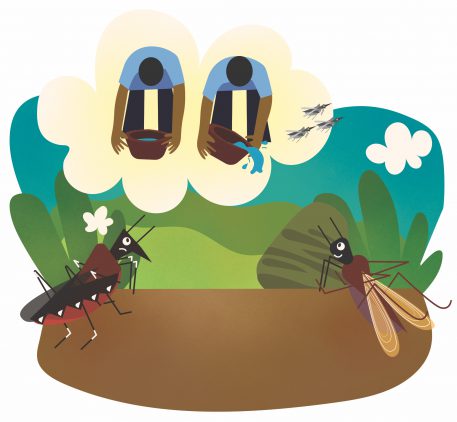
The other group members were happy with Natty’s idea and flew looking for flowers so that they could fill their stomachs.
“In future, when humans can fight dengue just like they fight common fever, we’ll be able to go back without any fear,” said Natty, giving hope to the full group.
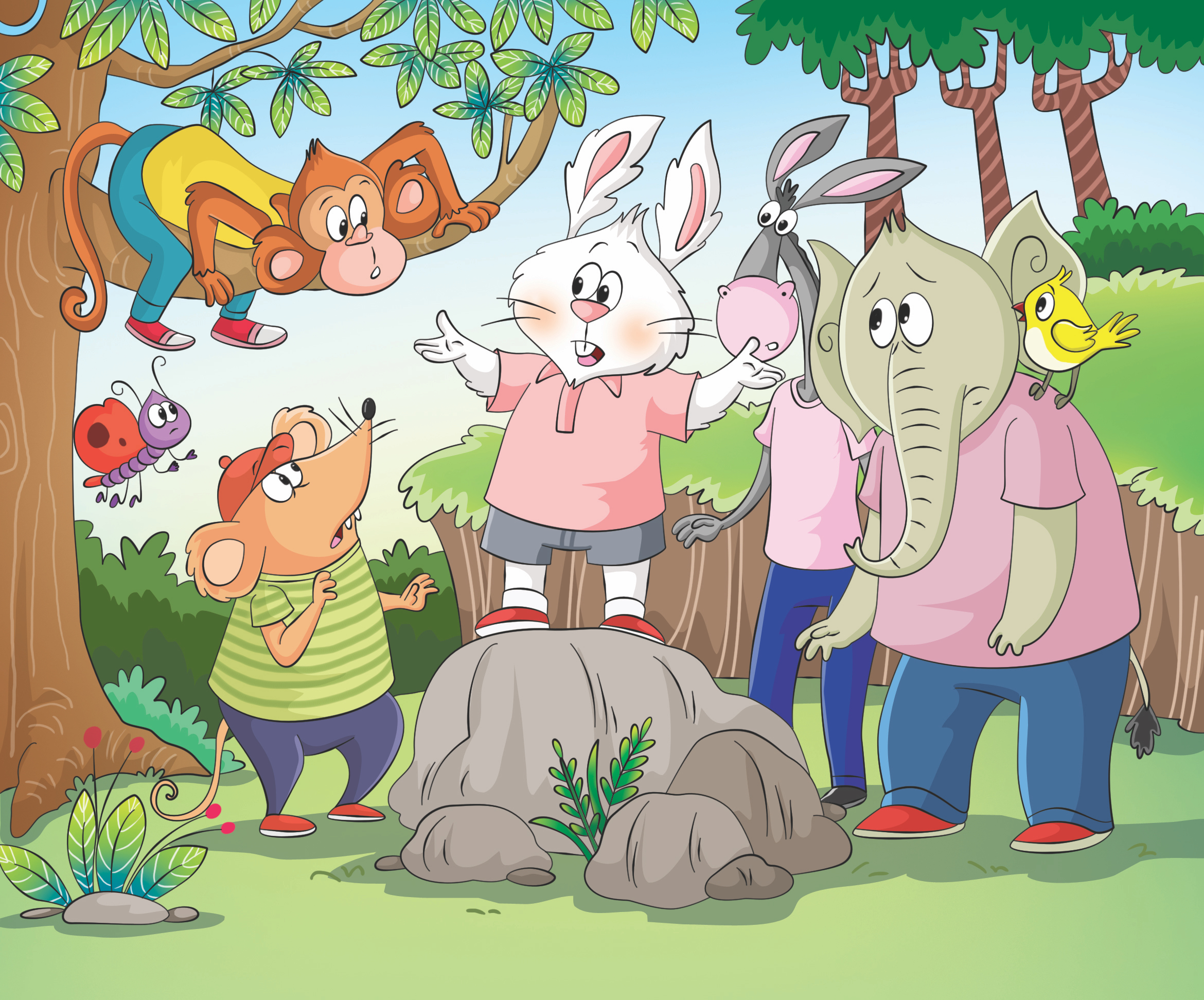
I need to speak to the King right away! I must meet him now,” said Cheeku rabbit to the King’s guards.
King Shersingh heard and called him in. “Cheeku, what’s the matter?” he asked.
“A cyclonic storm is gaining speed and will soon reach Champakvan. We should take precautions or we’ll end up in big trouble. Many homes will be destroyed,” said Cheeku in a hurry.
King Shersingh was worried. This was the first time a storm was approaching Champakvan forest.
“What will happen when this storm hits Champakvan?” asked King Shersingh as he wanted to know what they should be prepared for.
“The cyclonic storms are moving towards us and will hit Champakvan in 2 days. It will bring heavy rain and strong winds that will destroy trees, homes and may cause floods,” informed Cheeku.
“That’d be terrible! We should alert all the animals right away and build a shelter for them to stay till the storm calms down,” said King Shersingh.
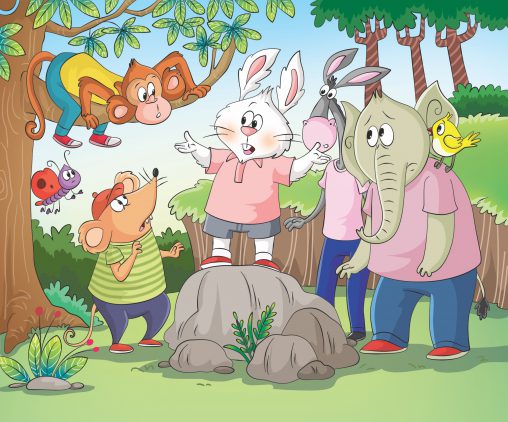
And soon, the news about the approaching cyclonic storm spread through Champakvan. All the animals stocked up on food in their homes.
“What can we do, Cheeku?” asked Blacky bear.
“We have to stay alert. It’ll start raining before the storm arrives. There’ll be strong winds. We have to ensure all the animals have moved to the safe shelter before that. We must keep our mobiles fully charged. We have to move the animals who live in weak houses.”
“Why so, Cheeku?” asked Meeku mouse.
“Because weak houses might break due to strong winds. Not just that, electric poles can also fall during thunderstorms and cause more damage so the electricity supply to the entire forest will be cut until the storm passes. There may be floods, so we have to stay on higher grounds,” explained Cheeku.
“My house is in a bad shape,” said Jumbo elephant. “Where can I stay when it rains?”
“We have built shelters for the animals on the hill. Food has also been arranged. There’s enough space for everyone to move there,” said Cheeku.
“My house is on the mango tree. And the mango tree is very strong. Be it cyclone or thunderstorm, I’ll stay right there!” said Jumpy monkey with a grin.
“Jumpy, your house is closer to the sea. It’s important to keep ourselves safe. Come to the shelter with us,” said Cheeku.
But Jumpy did not listen.
Two days later, all the animals took shelter on the hill except Jumpy.
Soon, strong winds began to blow and it rained heavily. The animals were happy that they were safe. At the end of the day, the winds grew stronger and stronger.
Meanwhile, Jumpy was still in his house. When the storm hit the mango tree, he began shaking terribly.
“Oh, dear!” Jumpy trembled in fear.
He regretted his decision. He, too, should have gone to the shelter along with the other animals.
The strong winds uprooted the mango tree. Jumpy’s house collapsed. He managed to escape but there was a flood.
He took shelter on a strong tree as he was injured and couldn’t travel too far.
After some time, the storm was calm.
“Looks like the storm has passed. We can go back now. But we need to be careful. A lot of trees may have fallen on the way,” said Cheeku to all the animals.
“Be careful!” said King Shersingh. “If anyone needs help, my guards are around to help you.”
The animals returned home.
“Who knows what condition Jumpy is in?” said Cheeku. He was worried about him and set out in search of him.
“Cheeku, look! The mango tree has fallen down! The storm must have uprooted it,” said Roma sparrow.
“Jumpy’s house was on this tree! I hope he’s fine,” said Cheeku, anxiously.
All the animals started looking for him. Jumpy was lying on the branch of another tree. His head was bleeding. They rushed him to the hospital.
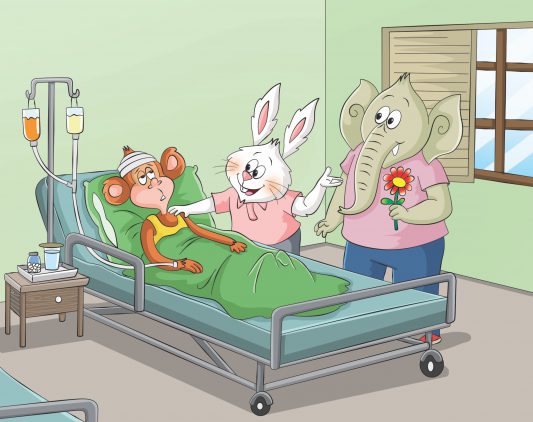
He was weak as he had not eaten anything the entire day and had hurt his head. The doctors gave him medicines and saved him.
“I’m sorry, Cheeku,” Jumpy apologised as soon as he woke up. “If I had listened to you, I wouldn’t have had to suffer like this.”
“Come on! You are fine now!” said Cheeku, patting his head.
Jumpy smiled and hugged him.
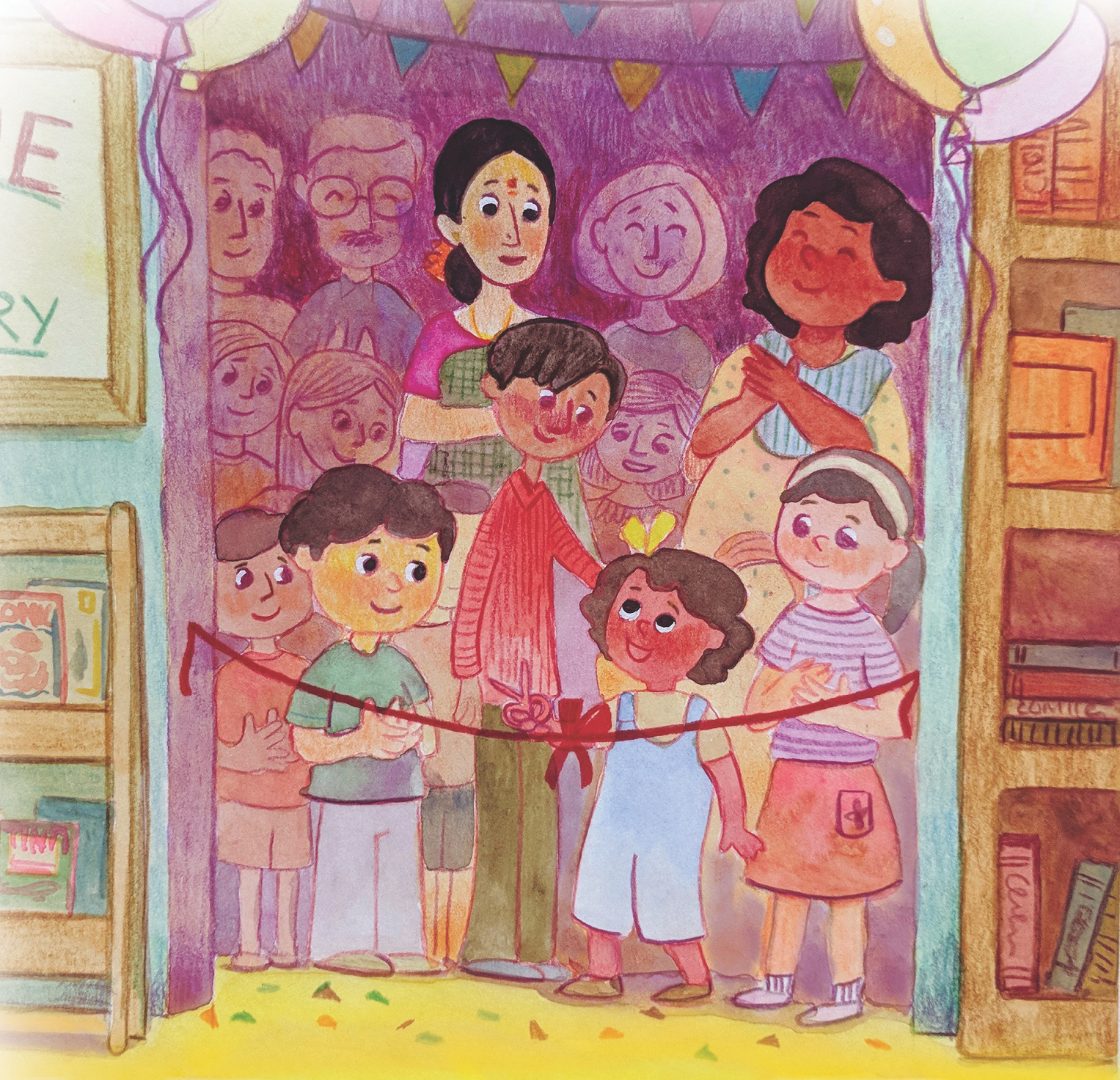
Manav returned home tired after a long day at the playground.
His mother, Mrs. Gopal, was busy cleaning the house.
“Can I help you clean, mother?” asked Manav.
This request surprised his mother as Manav did not like to clean. He even refused to tidy up his own room!
Mother was puzzled, but she gave in, “Alright,” she said.
“I will begin with the study,” said Manav, eager to get going.
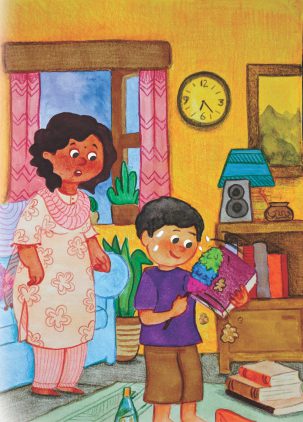
After a three-hour marathon, the house sparkled and gleamed.
Pleased with his effort, mother offered to make Manav his favourite drink―strawberry milkshake.
“No thank you!” said Manav, as he ran out of the house. “I am not hungry mother. Maybe tomorrow!”
Surprised, mother watched the little boy disappear into the distance.
When he returned later that afternoon, Manav looked tired and dirty.
Curious, mother asked him, “Manav, where have you been playing at?”
Manav smiled the widest grin. “Tomorrow,” he said, “I will tell you everything mother!”
The next morning, Manav was up by 6 o’clock. He packed a few sandwiches for himself, and made some for his mother.
Then, before mother could even get a word out, he hurried out of the house.
By now, mother was alarmed!
She picked up the phone and dialed her neighbour, Mrs. Iyer. Her daughter, Sumedha, was Manav’s best friend. They studied in the same class.
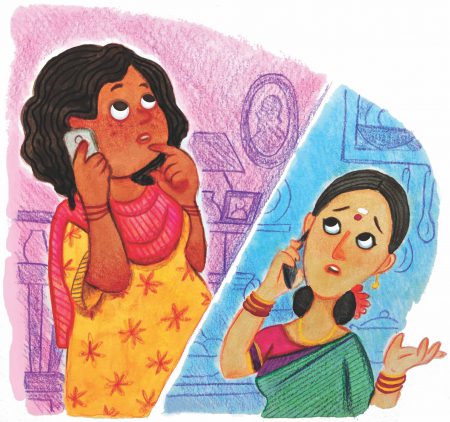
“Mrs. Iyer,” began mother, “Manav, has been behaving in a strange manner since yesterday. I was wondering if…”
“Mrs. Gopal!” Mrs. Iyer stopped her mid-sentence. “I was about to call you!”
“Yesterday, despite my refusal, Sumedha cleaned the study. Then, she came in late for all her meals!” complained Mrs. Iyer.
Concerned, mother said, “I better call the twins, Aarav and Ananya’s, mother and find out what is going on.”
Mother called Aarav and Ananya’s mother.
The twins, who lived two houses away from Manav, were in his class.
The strange story continued. Their mother said that the twins had forced the maid to clean the study yesterday.
Mother waited for Manav to return for lunch. It was 3 o’clock now and he had still not returned.
Anxious, mother decided to look for him. Just as she was about to step out of the house, Manav came rushing in.
“Mother, can you make two bottles of strawberry milkshake right away and bring it to the community hall at 4.30 pm sharp?” asked Manav.
Annoyed, mother did as Manav asked and showed up at the community hall at the requested time.
There she saw little Uttara, standing at the entrance of the hall. Her brother Arudra was standing next to her.
Eventually, the parents started to come to the hall.
At 5 pm, Manav, along with Sumedha, Aarav and Ananya came out of the community hall.
They silently tied a ribbon across the doorway.
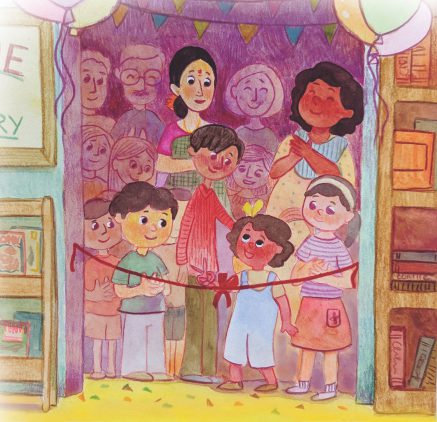
“We are proud to welcome you to the opening of our colony library,” said the children together.
“It is free for all. We have a collection of children’s books, comics, old text books and note books. All the children from the colony are welcome to spend their summer afternoons here.”
Little Uttara cut the ribbon with the help of her brother Arudra. Surprised, the parents cheered and clapped. Mother smiled.
Everybody stepped into the room.
Inside, the children had neatly arranged the books on old, unused racks and each section was labeled.
All the parents appreciated the children’s efforts.
Some even pledged to donate more books to the community library.
Soon, it became the kids’ favourite joint.
They spent their afternoons reading and drawing. Every day a parent sent in snacks, while some even joined the reading sessions.
The summer vacation turned out well for the children. Their plan worked after all.
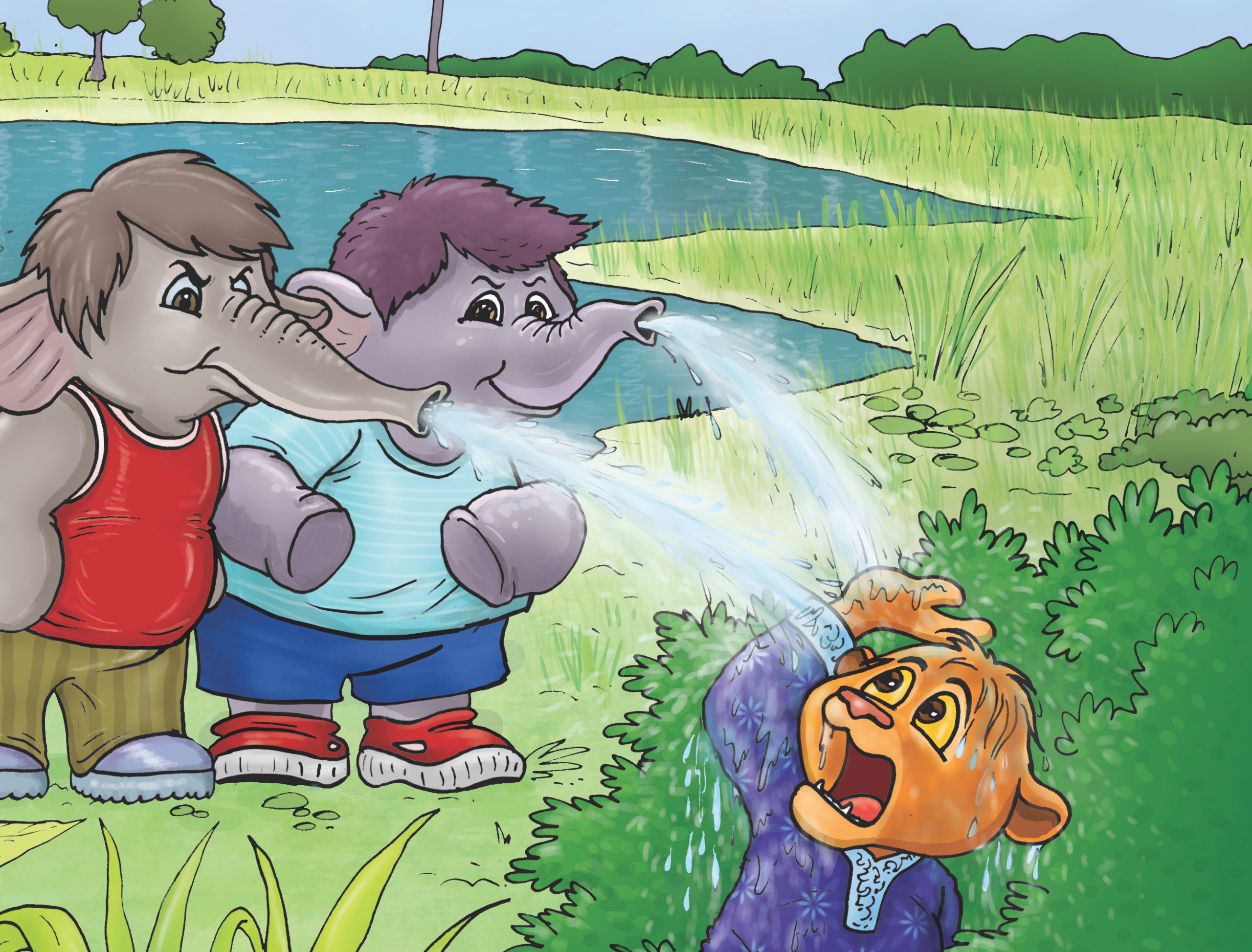
Leo lion did not want to become the king of the forest because he was very timid.
“Please dad, I don’t want to become the king,” he often told his father.
“But son, it is we, the lions, who have to become the kings. Now I have become old. You must slowly start taking up the responsibilities of this forest,” Papa Sheru explained to him with love.
Leo however was so timid, that he was not ready to become the king at all. “I
am tired of listening to my father,”
he thought.
One day he told himself, “It is better that I go away from this place and hide somewhere. Then I wouldn’t face any trouble.”
As he said so, he hid behind the bushes. There was a mango tree near the bushes which had some monkeys sitting on them. They saw Leo hiding there.
“Look, our future king is hiding here.” A tall monkey pointed
to friends.
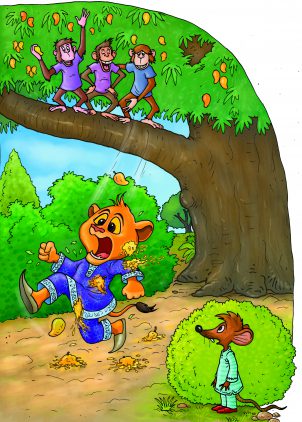
“Good. Let’s make fun of this timid creature,” said a monkey.
He immediately plucked several mangoes and distributed among his friends.
“Let’s get started.” Saying so, he threw one mango towards Leo. On seeing this, all the others too started throwing mangoes on Leo.
“Oh dear.” Being upset with this sudden attack, Leo ran away from there.
“Timid… Timid…” shouted the monkeys as they clapped.
“How wild are the animals in this forest,” Leo thought to himself and felt sad. But he did not get angry. He feared that the herd of monkeys may attack him. So, he ran away quickly and came to the forest’s pond.
“Hey look, our future king is hiding here!” exclaimed the children of two elephants who were drinking water from the pond.
“If he is so timid, then who will save us from our enemies?” They started talking to each other.
“You are right. What is the difference whether he is here or not?” said the second elephant.
The young elephants made fun of him. They filled water in their trunks and splashed it on Leo who was still hiding.
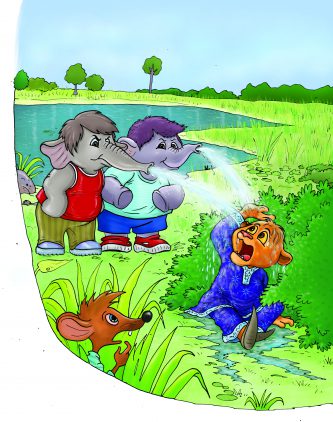
“If you continue to hide, then we will give you a bath and also arrange meals for you,” Both of them laughed and said.
Leo got very angry when suddenly they showered water on him. However, he was afraid that if he expressed his anger, then the elephant would not spare him.
“Oops! I need to escape from here as well.” Leo immediately ran towards the mountain.
“Timid… timid…” The elephants teased him on as he ran.
Once at the mountains, Leo was at considerable peace. He laid under the dense cover of a tree.
“It’s fine here. No one will disturb me,” he thought.
A few crows were sitting on the tree.
“Hey look, our future king is hiding here,” one crow said looking at Leo.
“Let’s teach a lesson to this coward,” said another crow, as he reached out for him.
Now the mischievous crows began to bother him. Some started crying near his ear while some others started poking him with their beaks.
“What’s the problem?” Leo got upset again. He was very angry with the crows for teasing him. When his patience broke, he roared aloud.
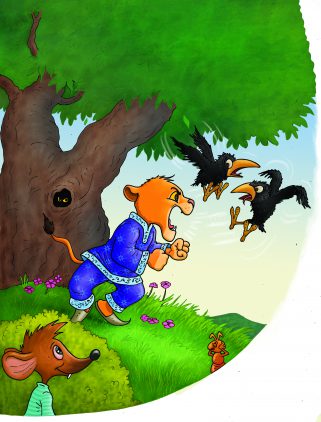
Hearing him roar, the crows flew away in fear.
Leo told himself, “I am a lion and I have to show courage like a lion. I can’t live in fear. I am ready to become the king of this forest.” He roared again and returned home.
“Dad, I am ready to become the king.” When Sheru heard this, he embraced his son with pride.
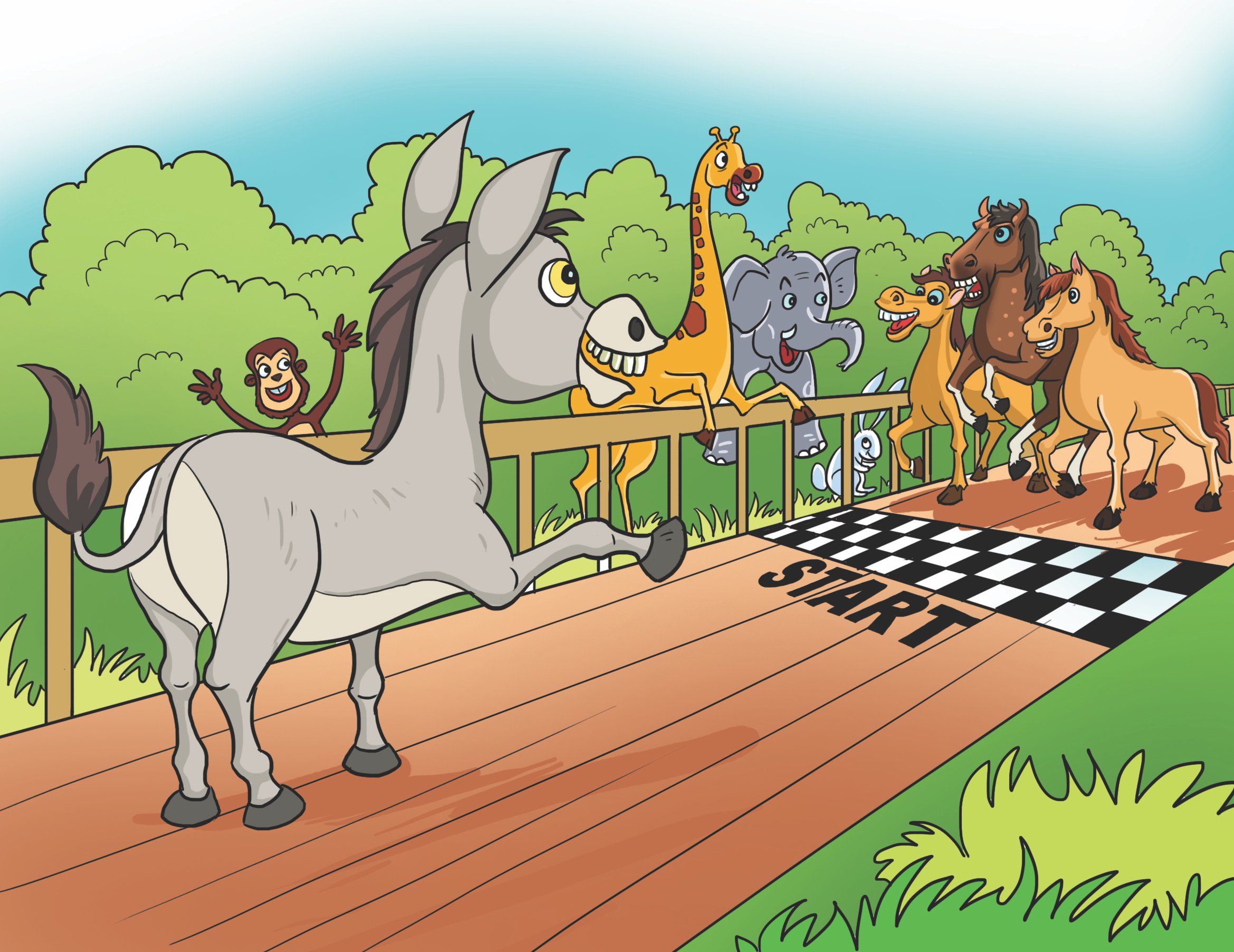
A race was to be held in Chanchalvan forest. All the animals in the jungle had gathered to watch the race. The horses that were to run the race, assembled on the race track.
Though they competed with their own kind, each thought they were better than the other.
Snorting and pounding their hoofs, they glared at each other.
Then, just as the referee was about to blow the whistle and start the race, Bhondhu donkey ran in.
“Stop brothers!” he yelled. “I would like to take part in this race.”
The crowd roared with laughter. Yet, it did not discourage Bhondhu.
“I have practised long and hard, running at the speed of a horse. I believe I run fast,” said Bhondhu.
“Oh! Now a donkey wants to compete with us!” thought the horses.
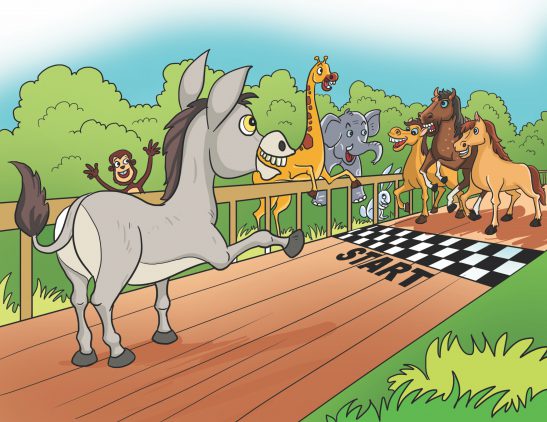
Till then, the same horses that looked at each other with bitterness, suddenly united.
They now turned their bitterness towards one target ― the donkey.
For now, it was not a question of which horse won. Rather, it became a matter of pride for the family of horses.
“This is beyond your skills, Bhondhu. Everyone isn’t as capable as us. Donkeys in particular are no match,” said Hiroo horse. “And if you were, you wouldn’t be called a donkey.”
Again, the crowd burst out laughing.
“You are just that ― a beast of burden,” continued the proud Hiroo. “Do what you are born to do. Don’t make a fool of yourself!”
The horses cheered him on.
“Okay. If I lose, I will leave this forest forever,” said a confident Bhondhu.
Now, this made the spectators curious. They all scrambled to get a better view of this strange competition between a donkey and the horses.
The referee fired the starting shot. Off went Bhondhu and the rest of the horses.
While the horses ran well, Bhondhu surprised all. He overtook each horse.
Even Hiroo, who was a champion racer, couldn’t beat Bhondhu. Finally, Bhondhu won!
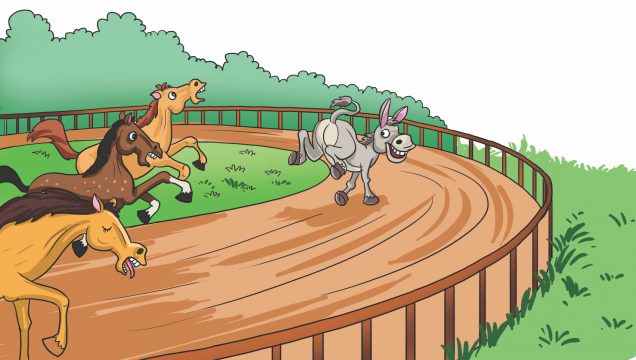
As a prize, he was gifted a cycle.
The happy Bhondhu went up to the horses and said, “Brothers, so what if I am a donkey? With hard work and sincerity, anyone can be successful.”
Soon, the race became the talk of the town. The animals made fun of the horses, while everyone stopped making fun of donkeys.
Bhondhu, however, was not happy with the situation.
“It’s nice to hear everyone praise donkeys, after I won the race. But it’s not fair to make fun of the horses either,” thought Bhondhu.
One day, Bhondhu was cycling in the jungle, when suddenly he was surrounded by a group of horses.
“So, you are the donkey that outran us. How about running a race with us, right now?” said one of the horses.
“The other day, it was an actual race. I have no intention of competing with you now,” said Bhondhu.
“Now, you insult us by saying that you are not in the mood to compete?” said a familiar voice.
It was Hiroo. He stepped up from behind and pushed Bhondhu off the bike.
Bhondhu realised that the horses were out to seek revenge. He quickly took off as the horses chased him.
While he could run fast, Bhondhu could not run continuously and was getting tired quickly.
While the horses, as they were used to running all their lives, did not tire easily.
Soon, dizzy and tired, Bhondhu tripped and fell into a pit. There he lay unconscious.
The horses stopped at the edge of the pit. Seeing him unconscious, they left.
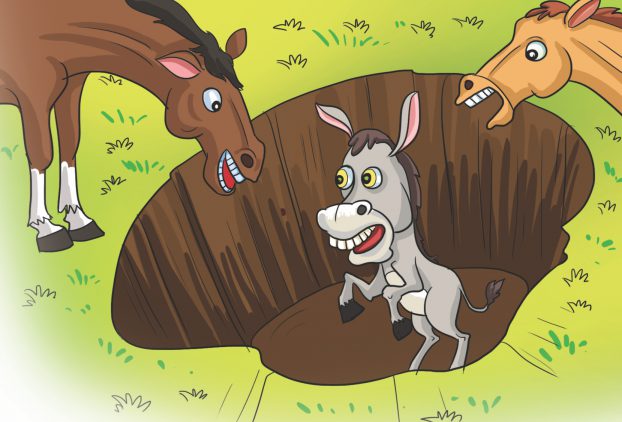
Soon after, Bhondhu gained consciousness and realised that he was badly hurt. He could not get out of the pit and there was no sign of help.
Suddenly, he spotted a small bird in the sky. It was Simi.
She recognised Bhondhu and flew down to him. Bhondhu told her all that had happened.
“The horses are bent on harassing me, because I won a competition against them. Is winning such a big mistake?” asked Bhondhu, in pain.
Simi smiled. “You have broken an age-old tradition. In doing that, you have made enemies with the bearers of that tradition,” said the wise little bird.
Bhondhu looked troubled.
Simi explained, “All the animals think donkeys are stupid. However, horses are treated like kings. They are believed to be ‘high’ and you, ‘low’. By winning the race, you turned the tables. You proved that a ‘low’ animal is also capable of speed – a quality that horses take great pride in.”
She continued, “They are insulted and their pride is at stake. They will try to defeat you, not only on competition grounds, but in real life too.”
“You mean I have invited trouble and made enemies by challenging them in the competition?” asked Bhondhu.
“Bhondhu, those who hold a ‘higher’ place in the society, blindly believe they deserve respect,” said Simi. “They also believe that anyone from a ‘lower’ section cannot challenge or hold such a position. Nor can they snatch their honour at any cost.”
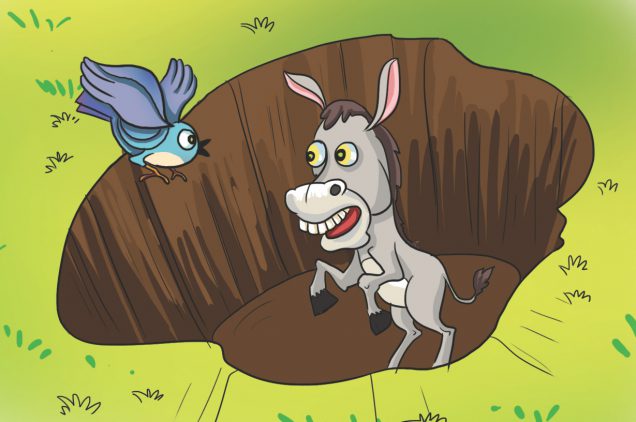
“I never thought about my actions in such a way,” said Bhondhu, worried.
“The winner of the race is now worried about his plight!” said Simi.
“Bhondhu, are you not happy that you have changed the outlook of your entire community? Wasn’t it wrong that everyone looked down upon donkeys? Now, because of your actions, no one laughs at a donkey.”
Bhondhu thought for a while. He replied, “No, dear Simi, I am in fact very happy, but…”
Simi stopped him mid-sentence and said, “If you are really happy, stop worrying. Instead, fight to retain your position so that in the future, no donkey will ever be discouraged. If you challenge someone, you need to be brave to face that person anywhere. Else, they will leave no leaf unturned to trouble you. Do you understand?”
“Yes Simi, I should be brave and ready to face the horses,” said Bhondhu courageously. “Now, can you please help me out of the pit?”
“I will get help.” Saying this, Simi flew nearby and got some of her friends to help Bhondhu to come out of the pit. Bhondhu thanked Simi.
“Dear friend, life is a struggle. To live it to the fullest, you have to be brave!” said Simi.
Bhondhu vowed to keep the pride of his breed and with that, they parted ways.
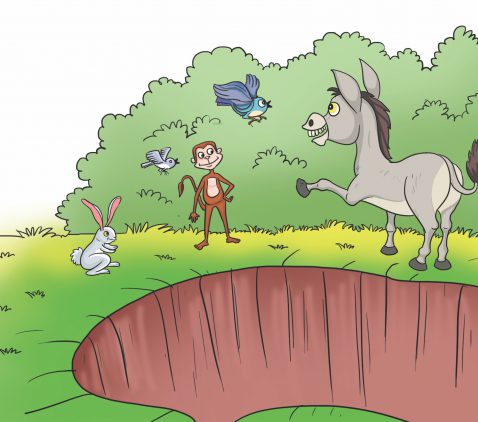
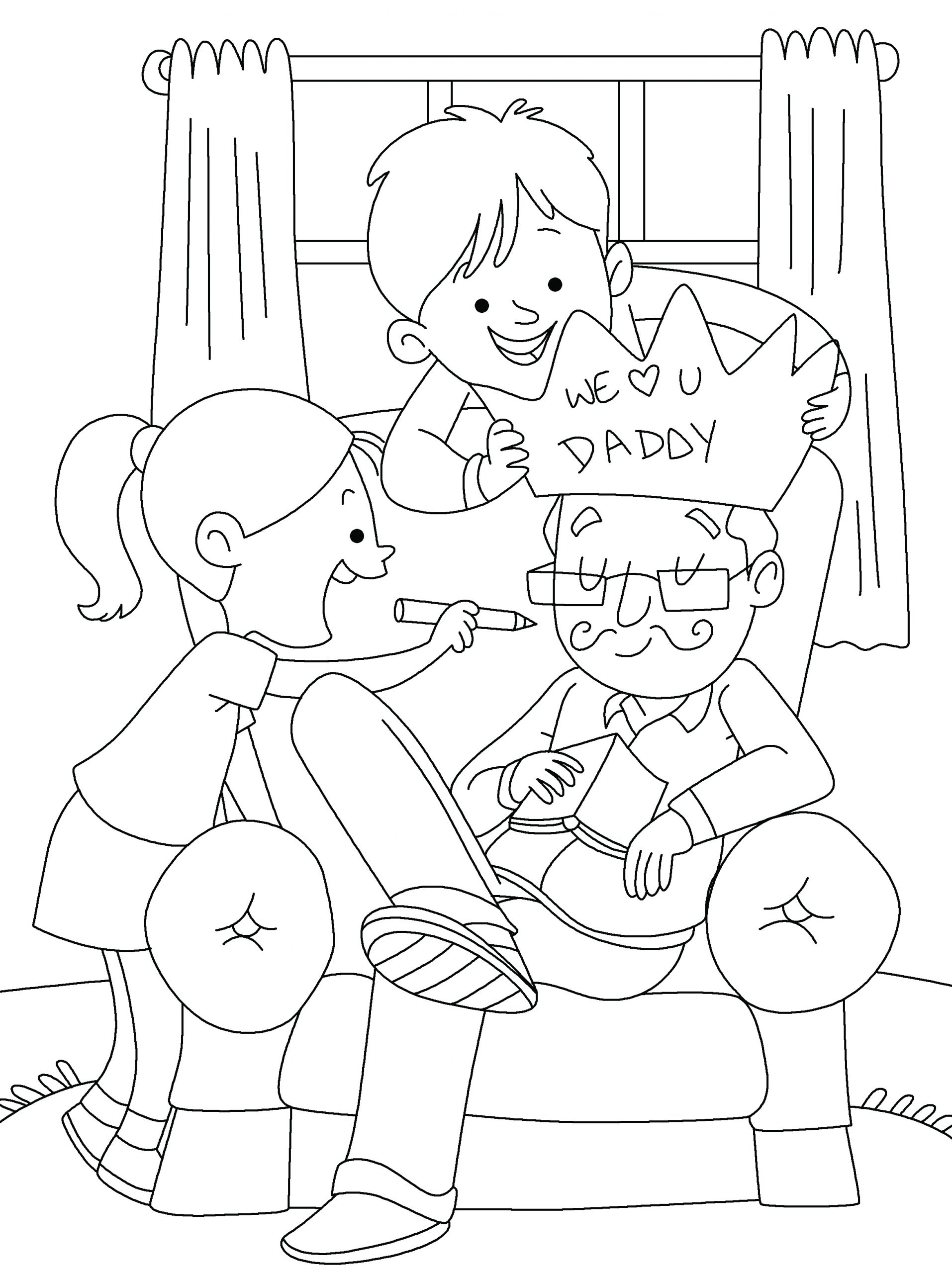
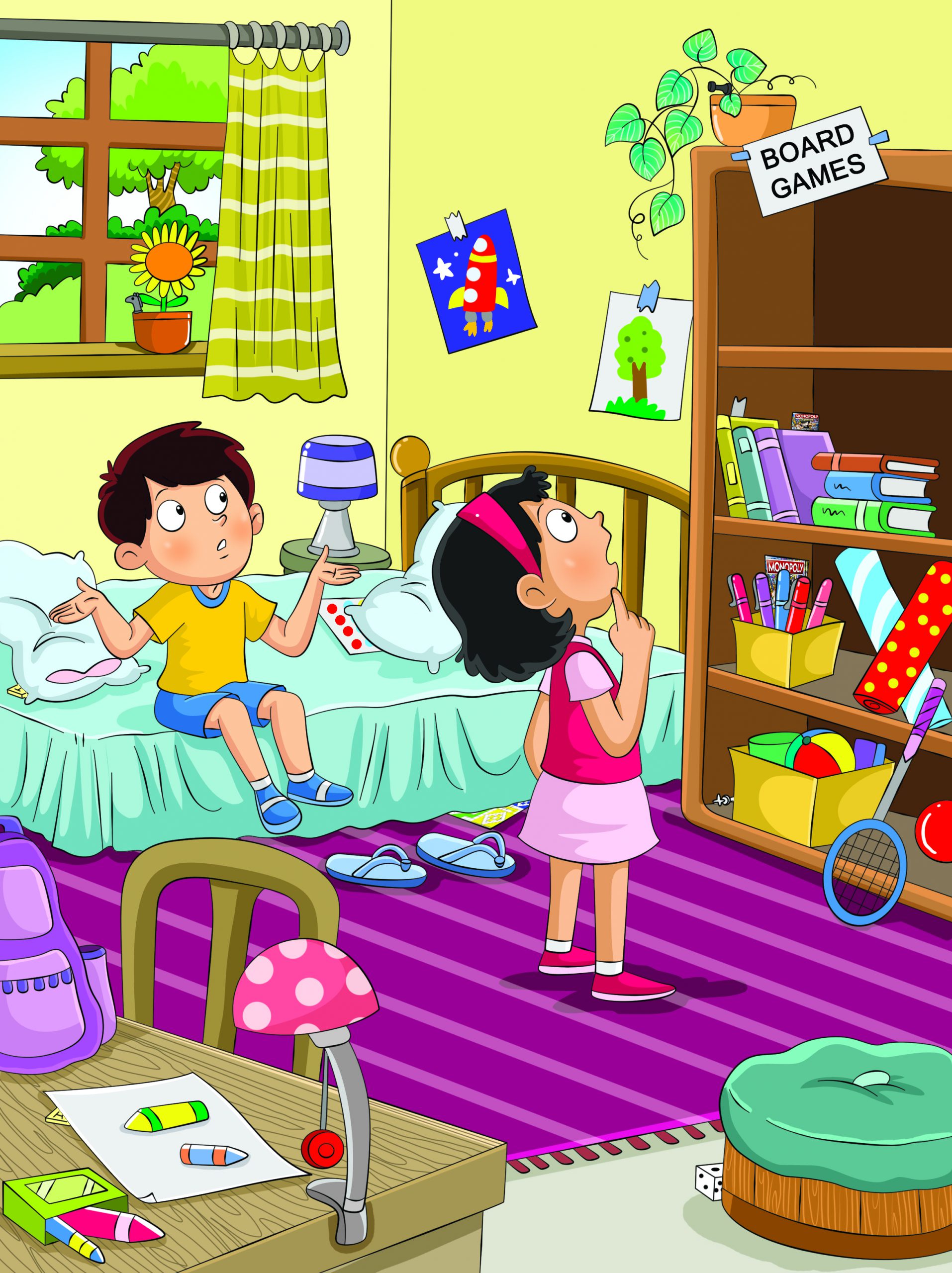
Maya and Krish want to play but all their games are missing a few pieces like the ludo board, carrom queen, chess pawns—bishop, king, horse, 2 scrabble tiles, die, 2 monopoly cards and a twister mat. Find these items for them.
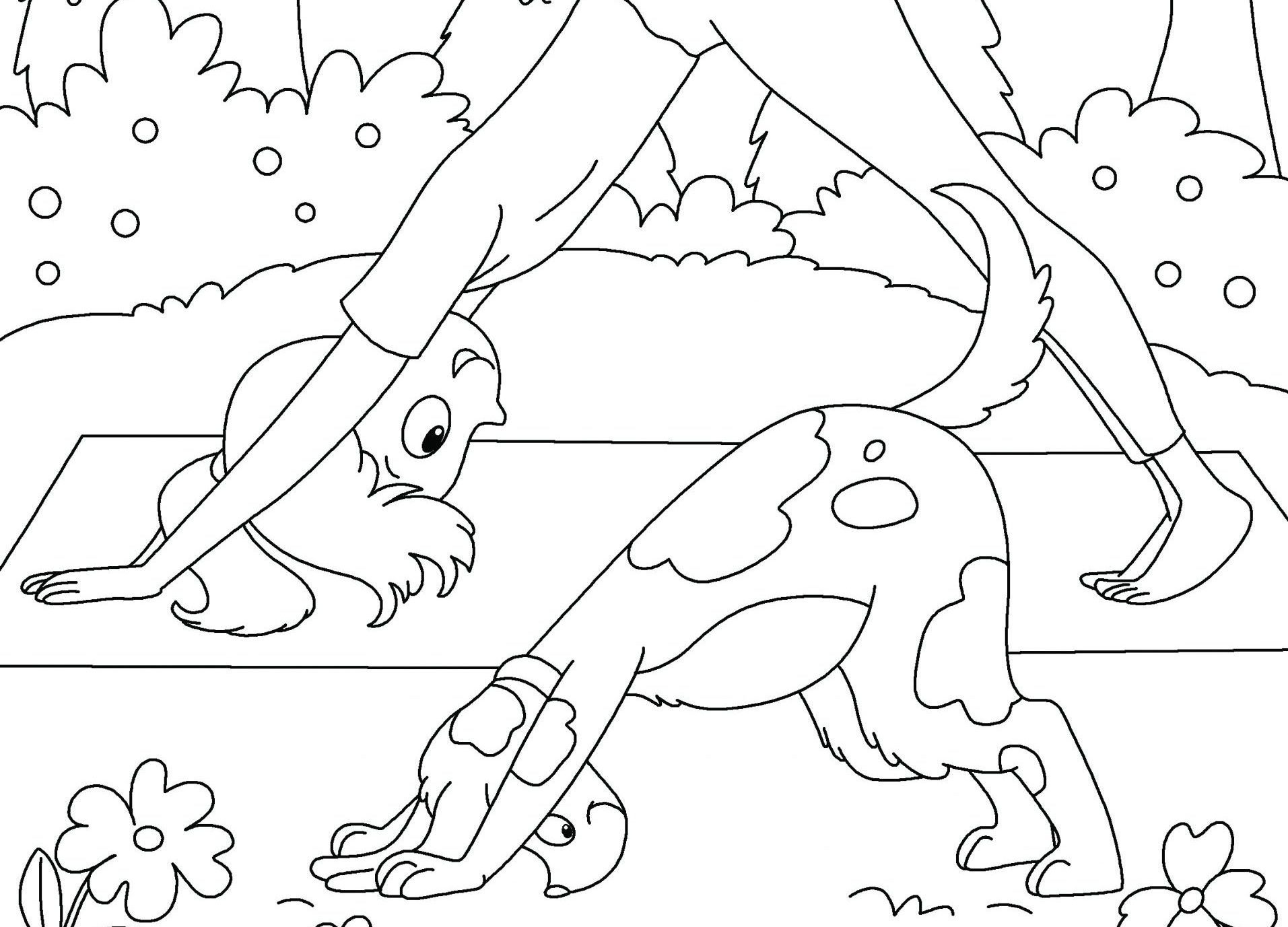
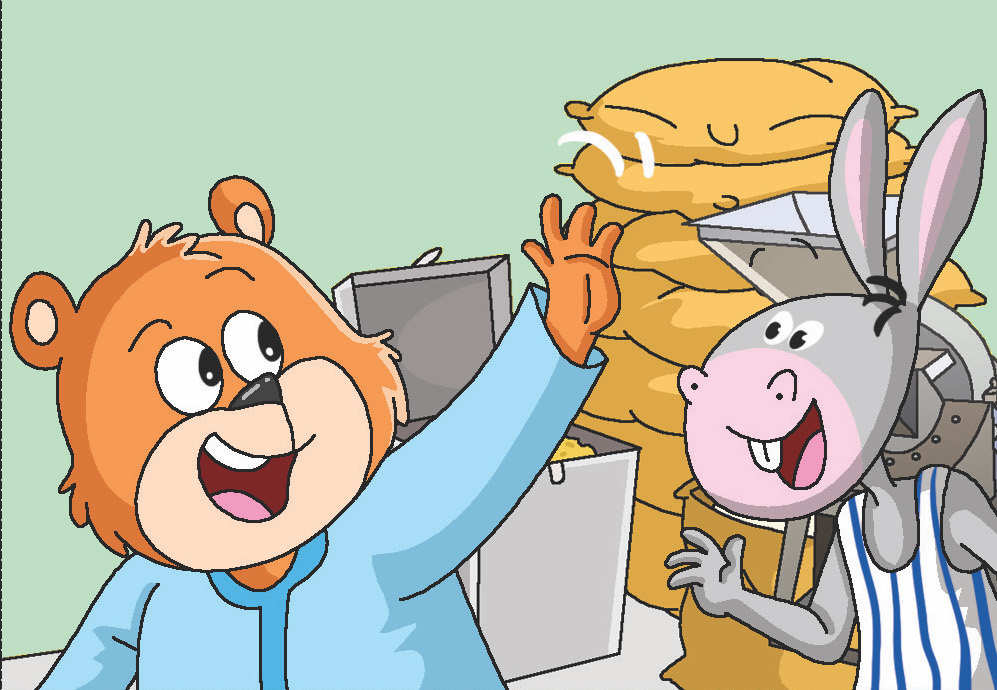
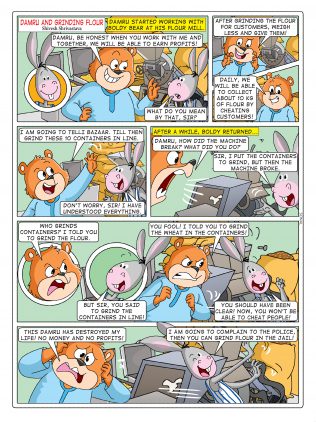
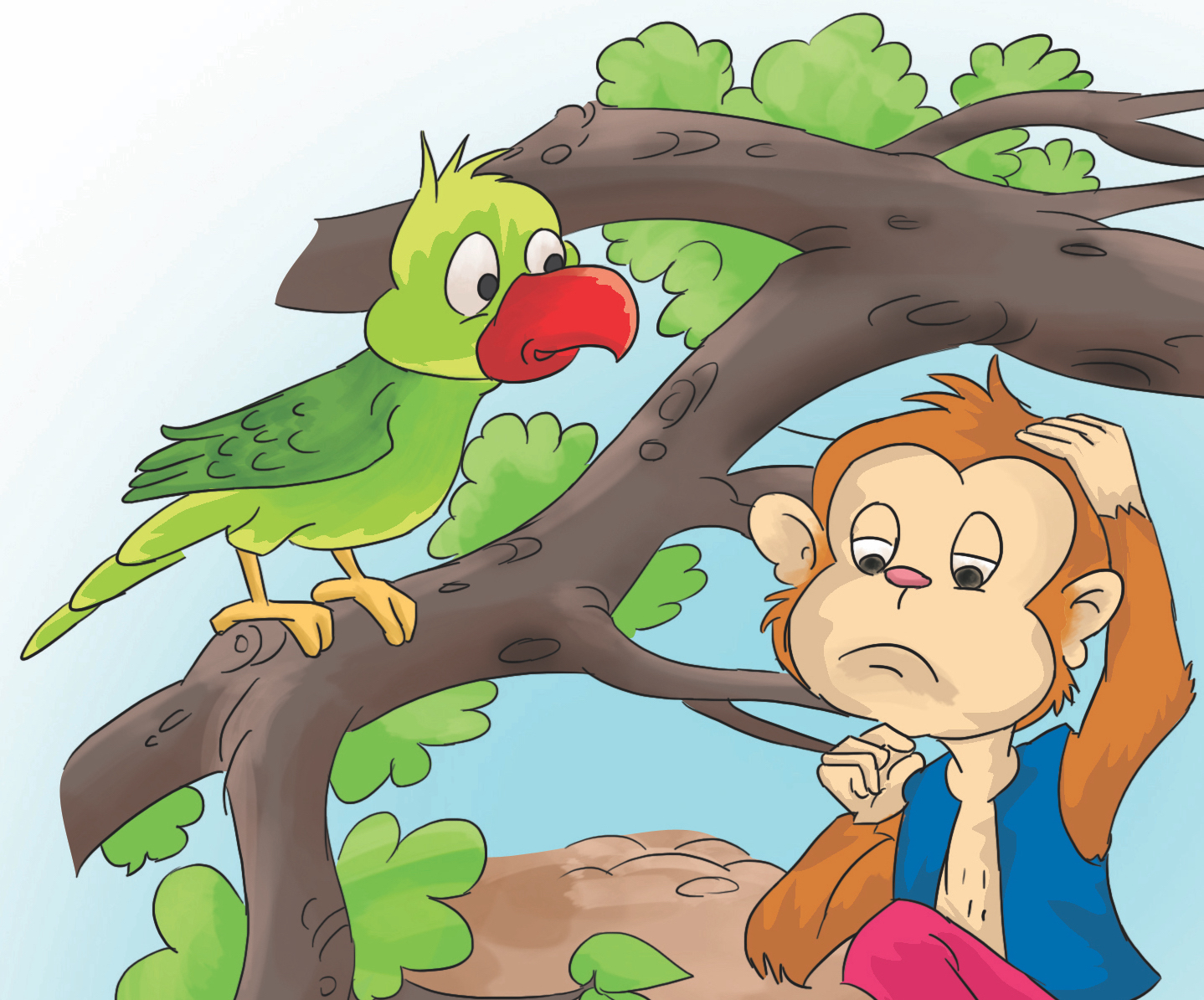
After a whole night of heavy showers, the rain stopped. Most trees in Anandvan forest had fallen down. Due to landslides at many places, the roads were blocked.
Mintu monkey reached his favourite spot – the banyan tree, but was shocked to see it. Due to the previous night’s rain, the tree had been uprooted. The huge trunk blocked the road and its branches were scattered everywhere.
Mintu sat quietly near the fallen tree. He remembered all the beautiful moments he had spent on the tree with his mother. He had been born there and had spent his childhood playing with other animals on the branches of the tree. When he became older, he left the banyan tree to stay with his friends. But he came to the tree often to meet his mother. Even after his mother died, he would still come to the tree regularly.
After some time, Pinku parrot passed that way. Seeing Mintu sitting there with his shoulders drooping, Pinku asked, “What happened, Mintu? Why do you look so sad?”
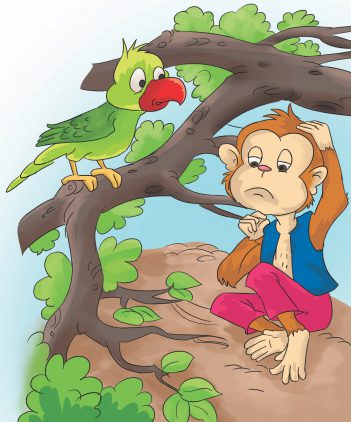
“Pinku, I’m sad looking at this uprooted tree,” replied Minku.
“The rain has destroyed many trees of the forest. This is not the only one. Come with me, I will show you around. Don’t feel so sad,” Pinku consoled.
“No, thank you Pinku. I am better here,” replied Mintu.
“Tell me the truth, Mintu. What happened? Were you very attached to this tree?” asked Pinku.
“Yes Pinku, I spent the best days of my childhood sitting here, on this tree. The memory of my mother also revolves around this tree,” Mintu sobbed and said.
“That is why you are feeling so sad about this tree,” said Pinku.
“You are right. The government has cut down so many trees to make the road. But, what is the point of the road if there are no trees?”
“You may not need the road, but there are others who do, Mintu. For the development of the forest, this was necessary,” said Pinku, now getting angry at Mintu.
“It doesn’t mean that for development, the whole forest should be destroyed,” retorted Mintu.
“For development, cutting trees is necessary. We don’t know how many more sacrifices we still have to make to become modern,” said Pinku, sticking to his point of view.
“Pinku, not only that this tree is destroyed. So many animals, birds and insects living on the tree also are homeless. Where will they go now?” asked Mintu.
“Yes, that’s true,” said Pinku. “But this is what you and I think. The government does not think about all this.”
“We must make them understand. Do you know now?” asked Mintu.
“Come, let us ask what the other animals of the forest who have suffered because of the rains, say on this,” said Pinku.
Soon, they gathered many animals who had suffered losses because of the heavy rains destroying the trees and their homes in the forest.
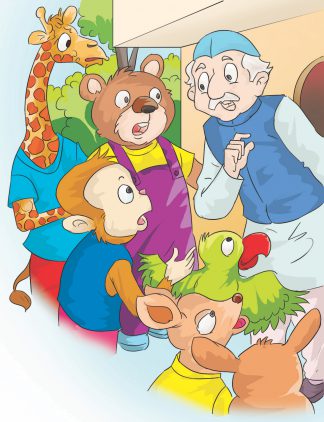
“By building the roads in the forest, many animals have suffered loss of their homes and loss of forest property. We should put our problems before the government. If we carry on like this, we don’t know how much more loss we will have to suffer,” said Mintu.
“Mintu is right!” they said together and decided to go and meet the Minister in charge of roads and development.
Seeing so many animals together the Minister asked, “What happened? Is everything alright?”
“Sir, because of yesterday’s rains, many of our birds and animals have become homeless. Big trees have been uprooted. We have never seen such large-scale destruction,” said Pinku.
“But why have you come to me?” asked the Minister. “Sir, because of the construction of roads in the forest, so much destruction of property has taken place,” they said together.
“Then, you tell me, what should I do? For the development of the forest, we have to suffer some amount of loss,” he said.
“You’re right, sir. But we request that at the time of building roads, a few points should be kept in mind. Road construction should not kill the roots of trees. The forest’s old banyan tree has fallen down. Many birds and small animals had their homes on it. All of them have become homeless. Many creatures had spent their childhood on or around this tree. Their memories revolved around it. And all this is now over!” they explained.
“You are right. We should have kept these things in mind. The road should have been planned in a way, so that least destruction of trees and forest happens.
Whatever loss has happened, can’t be undone. But I promise you, In future, we will keep in mind that you do not suffer anymore,” replied the Minister.
“But what will happen to the old banyan tree? It is still lying there on the ground,” said Pinku.
“I have a solution for this. If you wish, I can help you preserve its memories,” said the Minister.
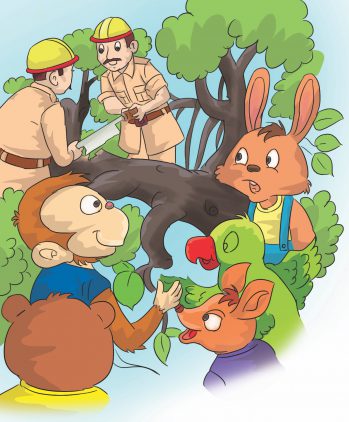
“How?” they asked. “We will cut off the big branches and place the trunk with the roots in a big hole in the ground. Soon, new sprouts will come from it,” said the minister.
“Is that possible?” they asked. “We have to try. And I also promise, next time, we will be careful in our construction,” he promised.
Mintu and all the animals too decided to help in the development of the forest and ensure that the forest was not destroyed.
